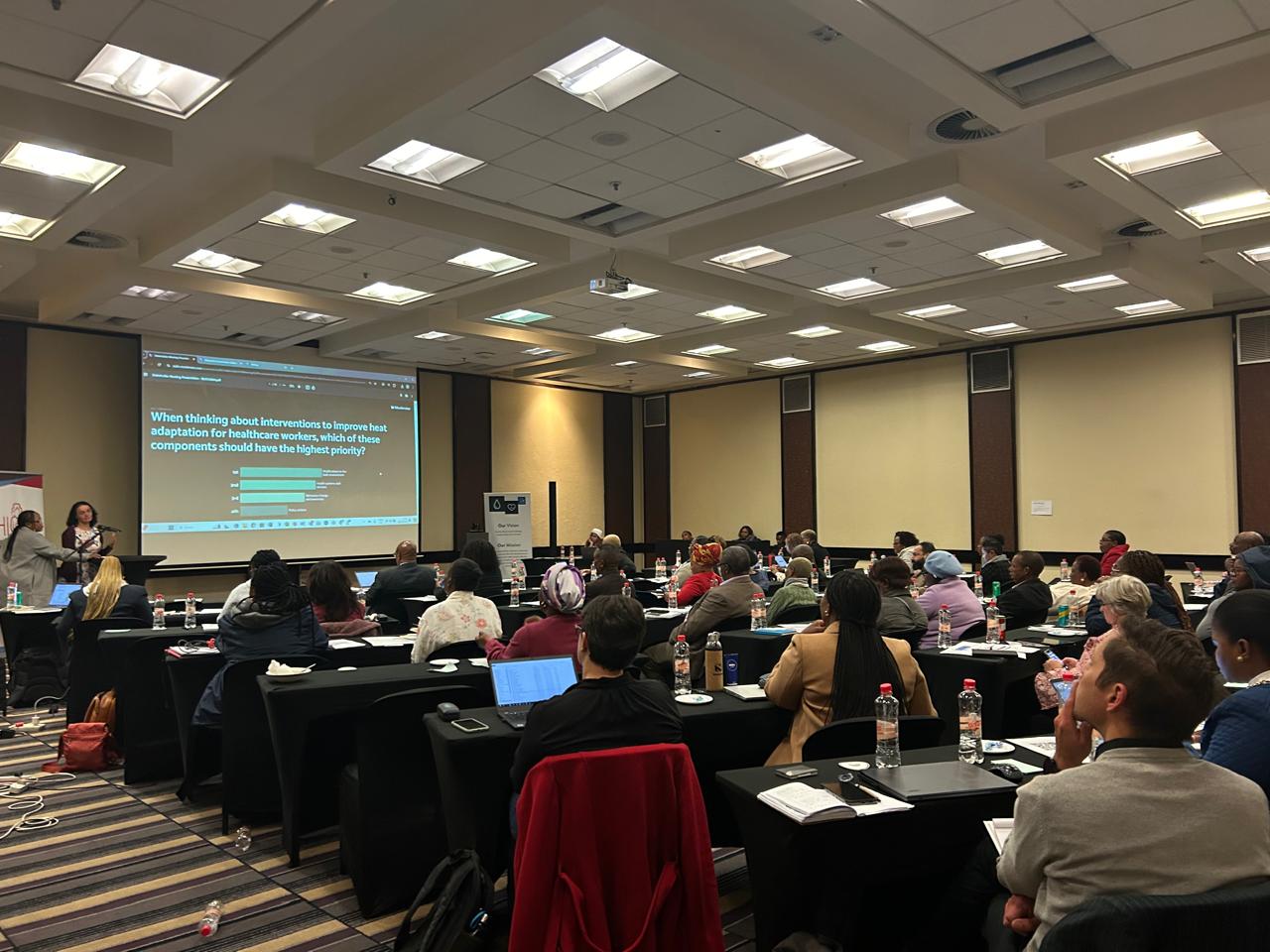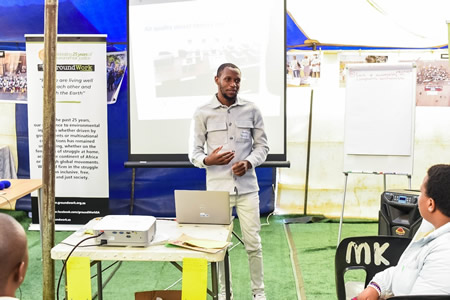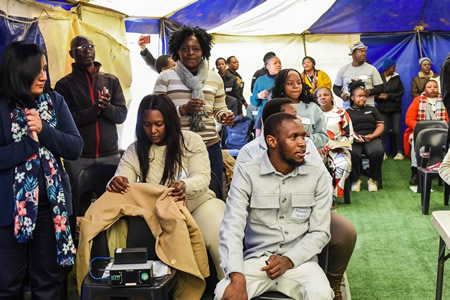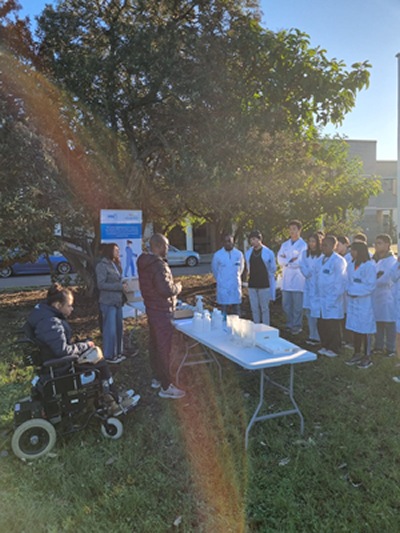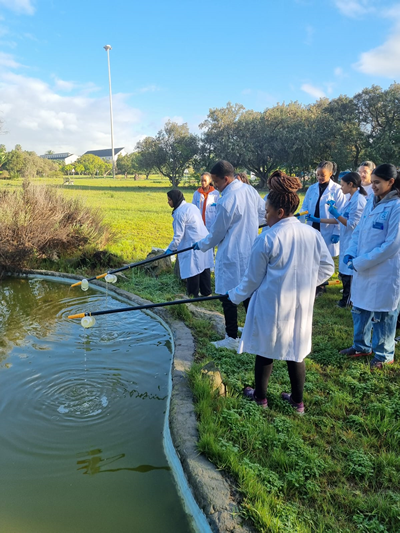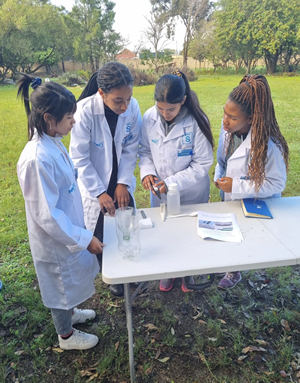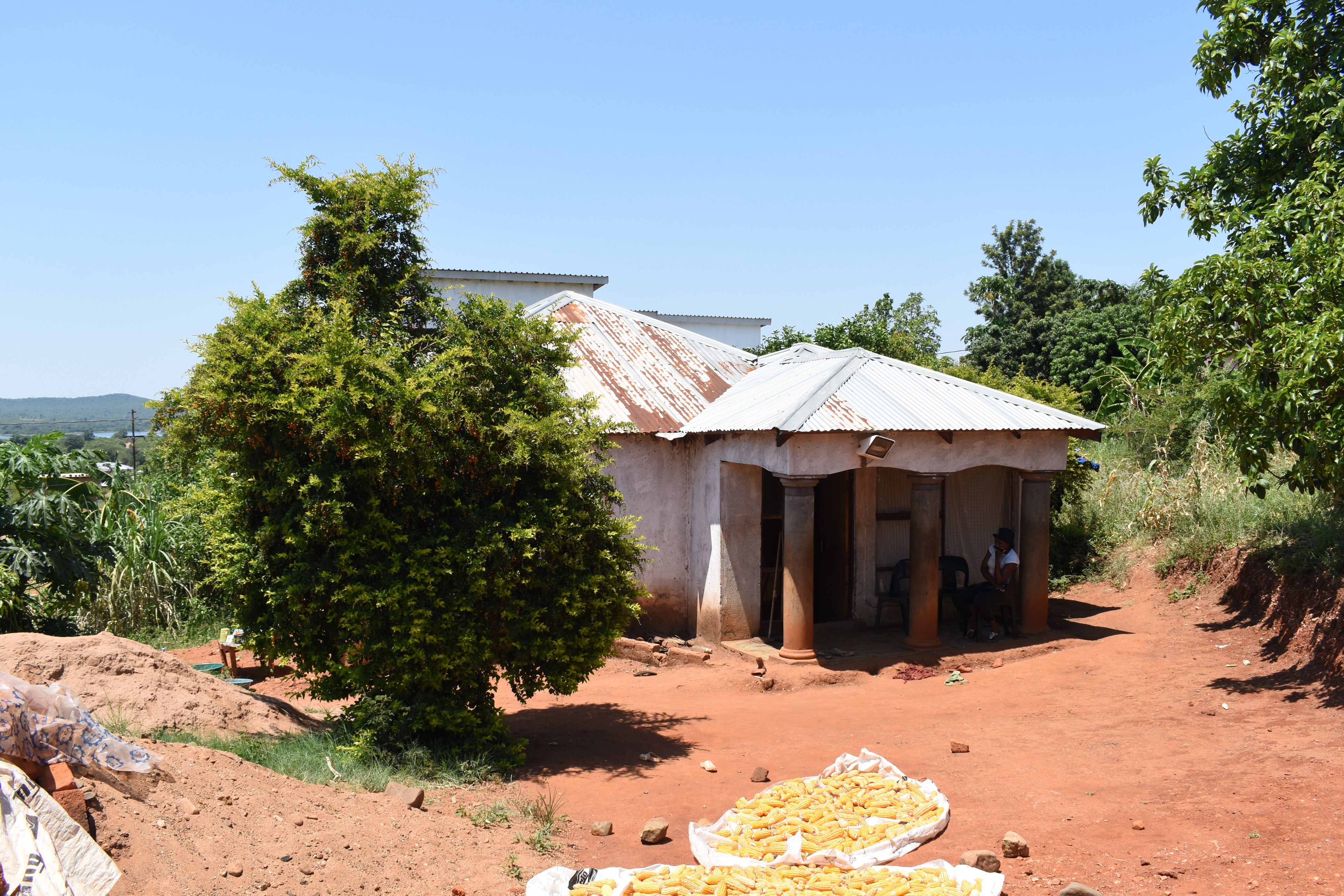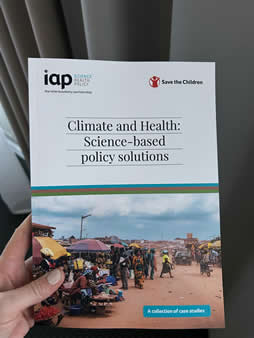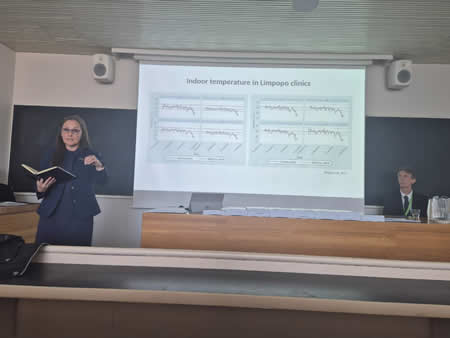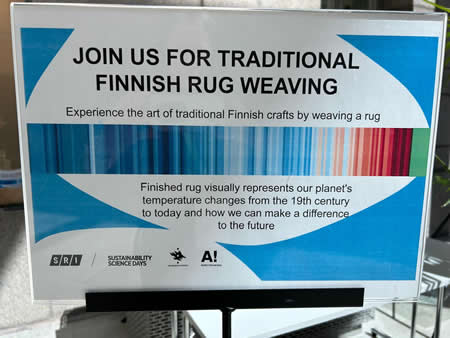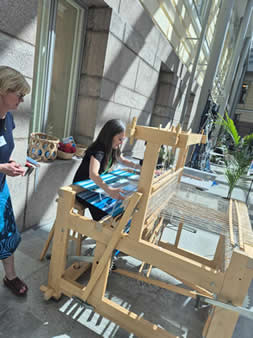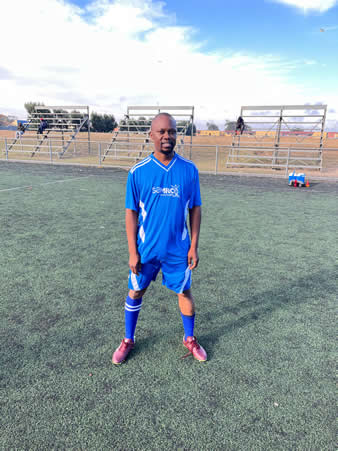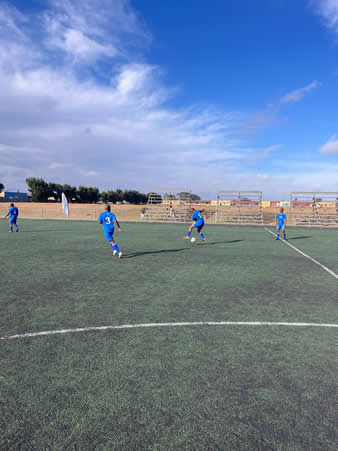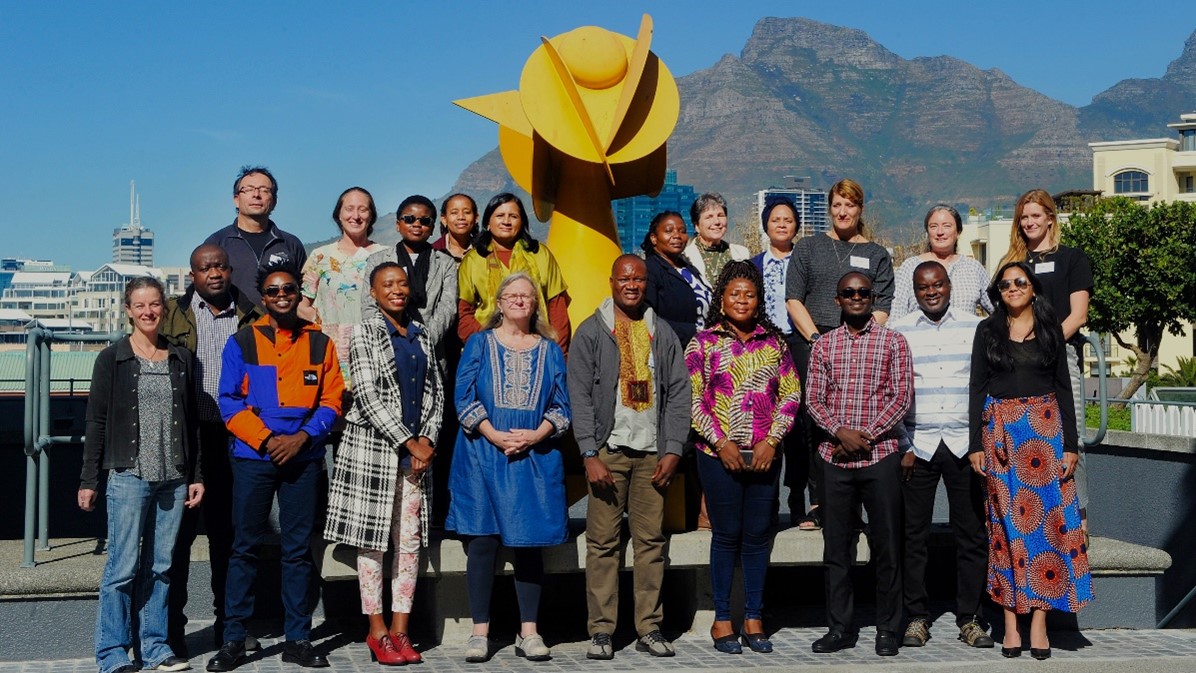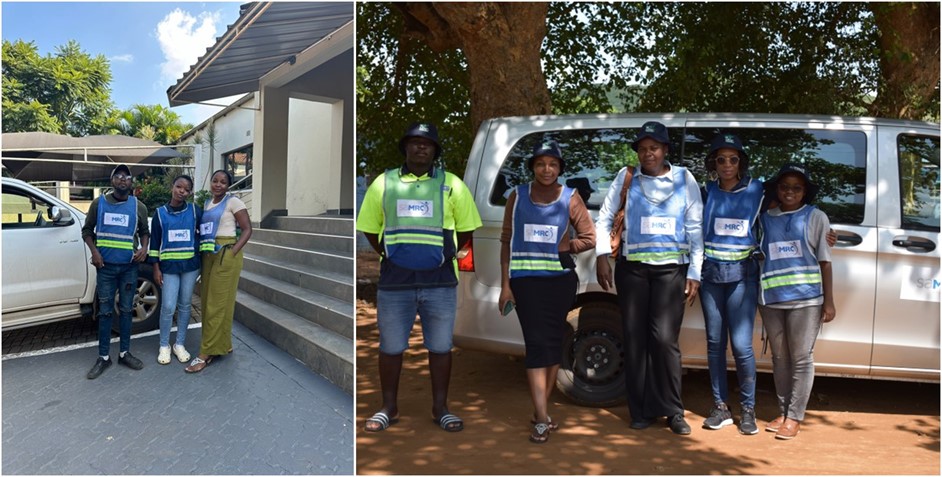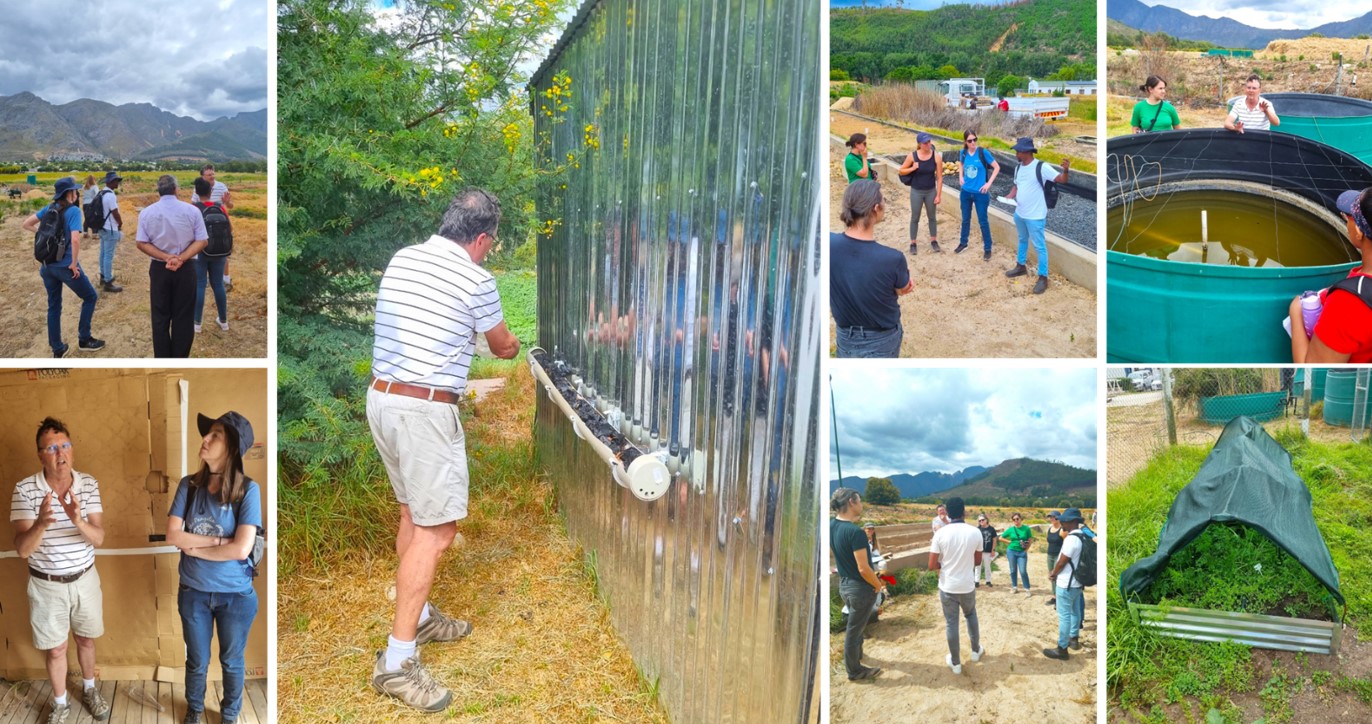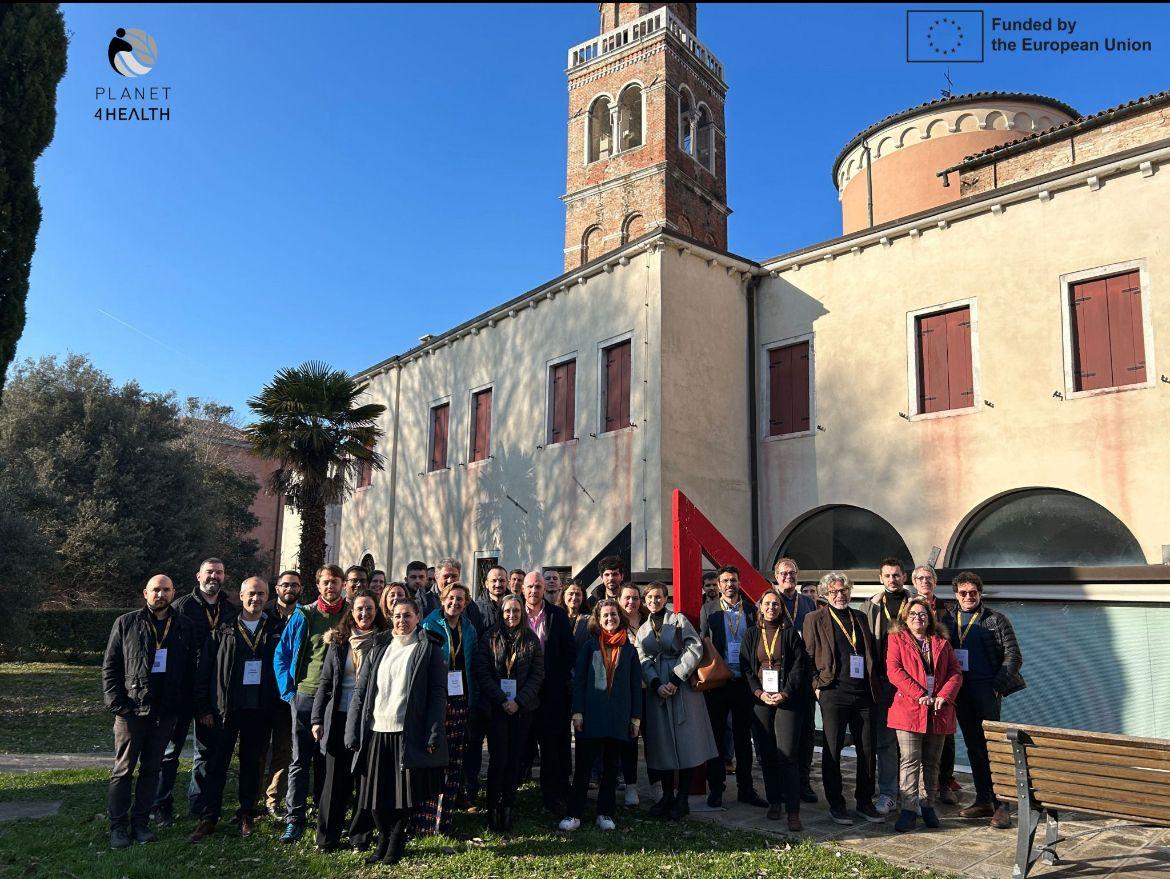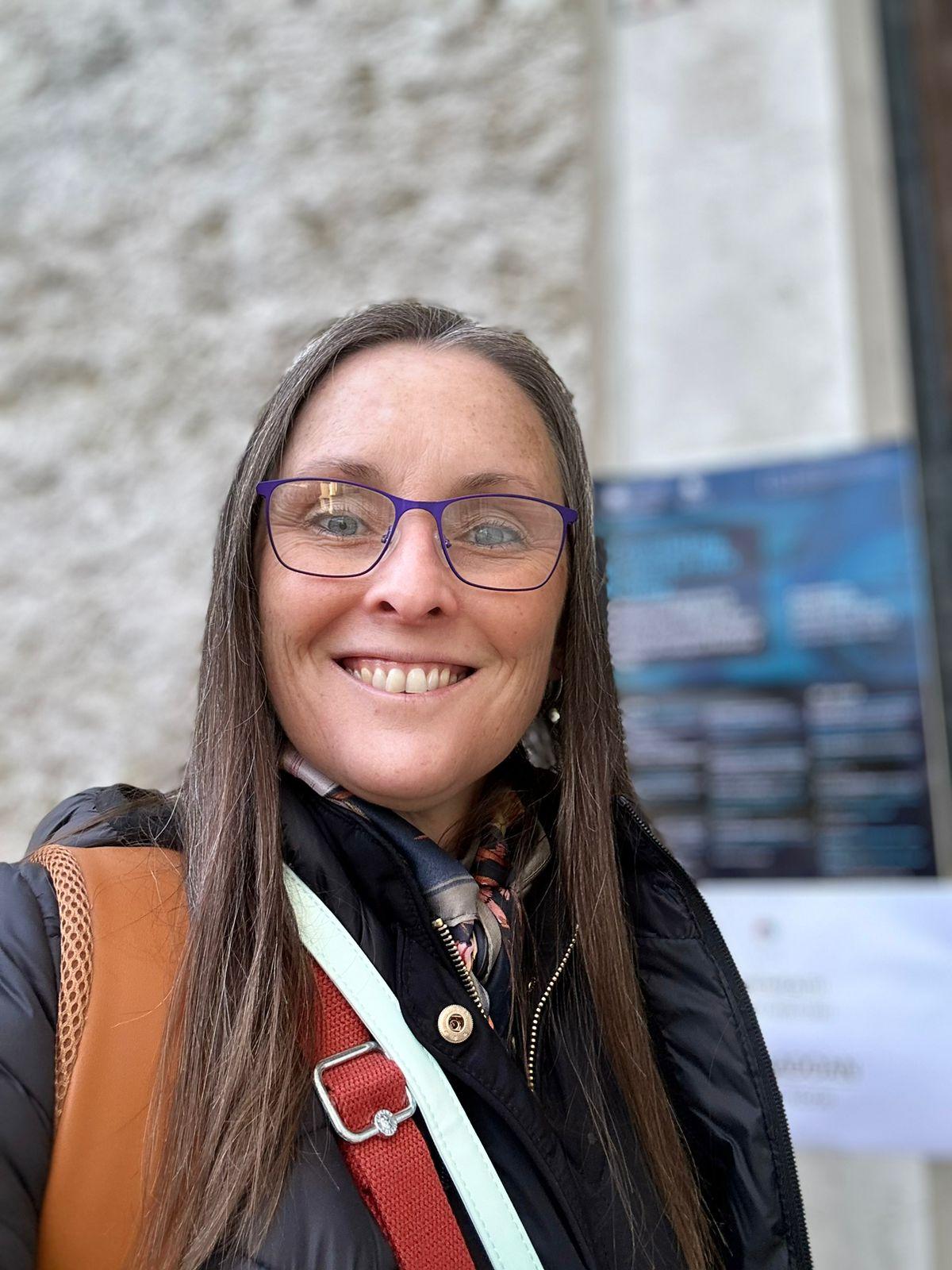The EHRU out and about
2025
| Professor Caradee Wright lectures at the University of the Western Cape at the inaugural the Climate Change and Health for Frontline Healthcare Workers Short Course | |
|
The University of the Western Cape (UWC)’s Faculty of Health Sciences School of Public Health, in partnership with the Western Cape Government, hosted the inaugural short course on Climate change and Health for Frontline Healthcare Workers from 24-28 November 2025. Professor Caradee Wright gave lectures during the first two days of the course (24 and 25 November 2025), covering sessions on the following topics: “Understanding the climate change and health”, “How climate manifestations impact on human health”, as well as “Risk and vulnerability to climate change impacts.” Such topics align with the ongoing research being conducted within the Climate Change and Health Research Programme within the Environment & Health Research Unit. Moreover, it aligns with the mandate of the SAMRC in terms of strategic goals related to capacity building. The course was well attended with more than 30 participants who actively engaged in the lecture sessions as well as two field visits. The short course will become an annual event at UWC and Professor Wright will return to the Western Cape for the second course in May 2026.
|
|
| Professor Caradee Wright participates in the City of Tshwane Sustainability Masterclass: From Policy to Action, Advancing Climate Action for Transformative Change in African Cities | |
|
The City of Tshwane (CoT) Sustainability Unit hosted a training session at The Capital in Menlyn Maine Pretoria between 20-21 November 2025 – in collaboration with the Community and Associations Institute (CAI) and C40 Cities. Key aims of the masterclass providing leaders and top management with knowledge by facilitating learning, identifying gaps, introducing practical strategies, and strengthening cross-departmental alliances to support bold climate action for Tshwane. City officials shared best practices, explored challenges, co-developed solutions, and engaged in climate change literacy sessions tailored to the capacity needs and gaps identified in the CAI programme. Professor Wright formed part of a high-level panel for the second session of the programme on: Why Climate Action Matters for the City of Tshwane. This was a platform where the Climate Change and Health Research Programme (CC&HRP) of the South African Medical Research Council (SAMRC) can continue taking on an advisory role in terms of climate projects undertaken by the City and its Councillors. Professor Caradee Wright also reflected that the Councillors in the City are very knowledgeable about what is going on in their wards.
|
|
| Dr Chantelle Howlett-Downing presents at the SASAS annual conference | |
|
The South African Society for Atmospheric Sciences (SASAS) is a long-standing body that recently celebrated its 39th annual conference at the UCT School of Business, between 13-14 November 2025. It was hosted by the Climate System Analysis Group (CSAG). Climate and society, social equity and the missing middle between climate data and societal decision-making were the main themes of the conference. On day one, oral sessions and panel discussions covering topics such as climate and society, weather systems etc. were discussed. A keynote address was given by Professor Bruse Hewitson, who also reinforced the concept of scale. Day two focused on continuing discussions on how understanding how climate science can drive meaningful climate action! Dr Chantelle Howlett-Downing presented a posted titled: A Multi-site Mortality and Morbidity Assessment of Air Pollution in South Africa’s Priority Areas: an Adapted Three-Stage Distributed Lag Non-linear Case-Crossover framework. This poster follows a recent study funded by the Clean Air Fund (CAF) – Towards an Understanding of the Impact of Air Pollution on Human Health in the Three Priority Areas in South Africa. Through this work, the CC&HRP reaffirms its commitment to bettering the lives of South Africans and advocating for cleaner air.
|
|
| Ms Setshaba Taukobong participated in the International Pathogen Surveillance Network (IPSN) Global Partners Forum | |
|
Setshaba Taukobong attended the third International Pathogen Surveillance Network (IPSN) Global Partners Forum, held jointly with the second Public Health Alliance for Genomic Epidemiology (PHA4GE) biennial conference in Cape Town, South Africa, from 27 to 29 October 2025. The theme of the forum was “Data for Action: Overcoming Challenges and Seizing Opportunities in Public Health Genomics.” The conference brought together 270 researchers from around the world to explore ways to integrate genomics into public health surveillance, improve digital infrastructure, and build a global data system grounded in collaboration and equity. The discussions emphasized how pathogen genomic surveillance can enhance global health preparedness and contribute to a safer world for everyone. Setshaba also served as a training facilitator at the pre-conference workshop on wastewater surveillance and epidemiology, a beginner-to-intermediate session focused on bioinformatics applications for public health. In this role, she guided participants through hands-on analyses of wastewater data, bridging laboratory techniques with computational approaches to support public health surveillance.
|
|
| Dr Renee Street attends the WHO led meeting in Berlin on AI and automation of epidemiological pipelines | |
|
Dr Renee Street attended the AI and Automation of Epidemiological Pipelines Workshop, organized by the World Health Organization (WHO) Health Emergency Preparedness and Response Programme. The workshop convened global experts in epidemiology, public health, data science, and surveillance to explore how artificial intelligence and automation can be leveraged to enhance epidemiological workflows and outbreak preparedness. The agenda focused on the development and integration of AI tools for automating data collection, analysis, and interpretation across epidemiological pipelines. Topics included real-time disease trend prediction, automated environmental and wastewater surveillance, data harmonization, and the ethical considerations of AI deployment in public health systems. 
|
|
| Professor Caradee Wright participates in the 8th edition of the G-STIC Conference between 8 and 10 October 2025 | |
|
Recently, the CSIR hosted the 8th edition of the G-STIC Conference in Pretoria on: Accelerating technological solutions for the SDGs from 8-10 October at the CSIR Convention Centre in Pretoria. Apart from bringing together various stakeholders such as entrepreneurs, innovators, industry leaders, researchers, policymakers, investors, and social and economic actors, this installation of the conference was significant for two main reasons. It was the first time that the conference was hosted on the African continent. Further, the conference coincided with the CSIR’s 80th anniversary – underscoring the organisation’s enduring commitment to scientific and technological excellence in support of sustainable development. The aims of the event included exploring market-ready technological innovations with the potential to substantially impact the realisation of the Sustainable Development Goals (SDGs). Moreover, this event is a global forum for advancing integrated technological solutions to accelerate the achievement of the SDGs and offers a distinctive focus on Africa’s sustainability challenges and opportunities, bringing critical regional perspectives to the global dialogue. Professor Caradee Wright moderated a session on heat organized by the Rockefeller Foundation and the Global Heat Health Information Network. The SAMRC looks forward to furthering collaborations with these two organizations. Read more here.
|
|
| Prof Caradee Wright attends the SETAC 9th World Congress | |
|
The SETAC World Congress is a forum for collaboration and knowledge exchange for environmental professionals. Here, a broad spectrum of topics are discussed, following a multidisciplinary approach. SETAC global meetings are held every other year in Africa, Asia-Pacific and Latin America regions. The SETAC also supports the Young Environmental Scientist Meeting (YES) periodically around the globe. This year, the meeting was held from 29 September to 3 October at the Sandton Convention Centre in Johannesburg. Professor Caradee Wright moderated a session on the One Health Approach to Protect Human Health in a Changing Environment. The session was well-attended and links back to similar work being done within the Climate Change and Health Research Programme (CC&HRP) through the PLANET4HEALTH (P4H) project. This project also has a One Health approach.
|
|
| Drs Busisiwe Shezi and Chantelle Howlett-Downing attended the 56th National Association for Clean Air (NACA) Conference in East London from 1–3 October 2025. | |
|
NACA is a non-profit organisation established on 21 April 1969 to promote clean air in South Africa. The NACA 2025 Conference opened with a keynote address by Deputy Minister Mr Narend Singh on the G20 Environment and Climate Sustainability Working Group’s Air Quality Management agenda, followed by a panel discussion. Technical sessions covered a range of topics, including air quality offsets, emissions quantification, low-cost sensor networks, and meteorological influences on pollution. Workshops and armchair sessions encouraged multi-stakeholder dialogue on governance, mitigation strategies, and emerging technologies. Dr Shezi presented her poster on “The role of housing conditions, air quality, and green spaces on the psychological wellbeing of children living with HIV in Durban, South Africa.” Dr Howlett-Downing presented “A Multi-site Mortality and Morbidity Assessment of Air Pollution in South Africa's Priority Areas: an Adapted Three-Stage Distributed Lag Non-linear Case-Crossover Framework”. The SAMRC and Circor Solutions also shared an exhibit at the NACA Conference. Circor Solutions has been working with Prof Caradee Wright to build air quality sensors, which have been used in various research projects.
|
|
| Drs Nomfundo Mahlangeni and Yonela Mkunyana attend the SETAC 9th World Congress Conference in Sandton between 29 September to 3 October 2025 | |
|
Drs Nomfundo Mahlangeni and Yonela Mkunyana attended the Society of Environmental Toxicology and Chemistry (SETAC) 9th World Congress Conference, held from the 29 September to 3 October 2025 in Sandton, Johannesburg. The conference theme was “Sustainable Development in a Changing World: Integrating Environmental Science, Policy and Practice.” The event brought together scientists, policymakers and industry stakeholders to share research and solutions on environmental pollution and sustainability. Its primary goal was to promote collaboration and highlight Africa’s challenges and innovations. Dr Mkunyana presented a poster titled “Wastewater and environmental surveillance for biological contaminants in the Soet River catchment: case study of Nomzamo in Cape Town”. Dr Mahlangeni also presented a poster titled “Occurrence and health implications of potentially toxic elements in drinking water in Africa: A scoping review protocol”. By attending the conference, Drs Mkunyana and Mahlangeni gained exposure to the latest global advances in environmental monitoring, human health risk assessment and innovation. The event also provided valuable opportunities for networking and establishing future collaborations.
|
|
| CC&HRP team participates in conference for World Environmental Health Day (2025) | |
|
As a key role-player in providing access to healthcare for all South Africans, the National Department of Health (NDOH) promotes health, as well as healthy living through various preventative measures and implementation plans. This also aligns with the mandate of the SAMRC. Notwithstanding research and projects undertaken at the SAMRC, pivotal days promoting environmental health are also commemorated, in conjunction with government institutions such as the NDOH – such as World Environmental Health Day (WEHD). Between 25-26 September, the NDOH in collaboration with the provincial NDOH invited various stakeholders to participate in commemoration activities during a conference for WEHD with the theme: Clean Air, Healthy People. Such activities included exhibitions where invited stakeholders could exhibit various materials and engage with other attendees and stakeholders. Dr Chantelle Howlett-Downing and Mr Siyathemba Kunene represented the E&HRU Climate Change and Health Research Programme team. New materials on air pollution, as well as the dangers of smoking, were shared. Even the NDOH of health promoted the anti-smoking poster! The team also promoted work done through the PLANET4HEALTH (P4H) project. Upon engagement with the team, attendees were interested to know more about CC&HRP work, as well as where resources can be accessed
|
|
| Professor Caradee Wright addresses Weskoppies Hospital staff and Gauteng Environmental Health Professionals (EHPs) ahead of World Environmental Health Day (WEHD) | |
|
The CC&HRP team has a long-standing relationship with the Department of Health, as work within the Programme and throughout the SAMRC, aims to improve the lives of the most vulnerable populations in South Africa – that includes pregnant mothers, children under the age of five and the elderly. On 18 September, Professor Caradee Wright gave a presentation on air pollution at the Weskoppies Hospital in Gauteng, in the build-up to World Environmental Health Day (WEHD) that is celebrated annually on 26 September. Its theme this year is: “Clean Air, Healthy People.” The event was well attended, and everyone enjoyed an activity on Kahoot. With many incidences of air pollution from boiler use being reported, there is an opportunity to engage with local hospitals such as Weskoppies to foster a practical awareness with the public about sources of air pollution more broadly.
|
|
| Professor Caradee Wright participates in the September ECSWG Science-Policy Dialogue hybrid workshop | |
|
The Department of Forestry, Fisheries and the Environment (DFFE) hosted the September ECSWG Science-Policy Dialogue hybrid workshop from 10-12 September at the Kelvin Grove Club in Newlands, Cape Town. Several topics related to specific priorities of the G20 ECSWG under South Africa’s Presidency were discussed at this landmark event – with air quality being among them. Professor Caradee Wright participated in a panel discussion on air quality talking what G20 countries can do together to work towards clean air. It was the first time that air quality has been specifically discussed by the G20 which is regarded as a strong motivation for its inclusion in the Science-Policy Dialogue. The plan is to include air quality in the ministerial statement and set of activities around air quality for the G20 countries going forward. Professor Wright also noted that G20 countries have varied thinking around air pollution as a problem, depending on the context in their country and so finding common ground may mean focussing on human health as a key goal.
|
|
| The CC&HRP team participates in a collaborative webinar commemorating Clean Air Day | |
|
Commemorating Clean Air Day, the E&HRU CC&HRP team participated in a collaborative webinar with the National Department of Health (NDOH) and the Clean Air Fund (CAF) on 4 September 2025. International Day of Clean Air for Blue Skies (called Clean Air Day) is celebrated annually on 7 September. The effects of climate change through air pollution are increasing and impact vulnerable groups such as the elderly, women, pregnant mothers, children and those with co-morbidities especially. Organised by the NDOH, the webinar offered a space where researchers could address ways to improve the air quality through promotion of cleaner air for everyone, strengthening the knowledge and awareness of air pollution impacts to human health, as well as reducing the exposure of air pollution through scientific evidence information sharing. Dr Renee Street gave opening remarks and Professor Caradee Wright presented on the need for clean air in South Africa and how to get there. There was also an interactive session using a Mentimeter quiz facilitated by Ms Muthise Bulani. The webinar also served as a platform for the launch of new research translation materials on air pollution, mothers, pregnant women and infants, and living near busy roads which Ms Amy Sheldon presented. |
|
| Pioneering Insights: Climate Change and Health Research Programme Scientists, Dr Natasha Naidoo and Ms Muthise Bulani, attend the DSI-Africa 5th Data Innovation Consortium Meeting | |
|
DSI-Africa, along with the Wellcome Trust and NIH, brought together academic, public and industry networks in an exciting conference on the 23rd to 29th August 2025 at the prestigious University of Ghana. The event aimed to strengthen data science coordination with a multi-stakeholder forum and enhance African data ecosystems that promote African data science outputs. Our Climate Change and Health Research Programme scientists contributed to two major scoping reviews in partnership with DSI-Africa and NIH. Dr Natasha Naidoo, whose team won the Tool-A-Thon, learnt coding on complex environmental and health data sets. Dr Naidoo presented an electronic poster alongside Ms Muthise Bulani on the R-NEET study protocol. Dr Naidoo then gave an oral presentation on the R-NEET study protocol as a panel member during the “Counting What Matters” themed session. Meaningful connections were created for future collaborations with scientists in several African regions. Ms Bulani and Dr Naidoo were astounded that the African Bioinformatics Institute was launched, promising to give African scientists greater access to health data. Ms Bulani noted that the knowledge exchange and coordinated funding efforts displayed at the conference aligned with Wellcome’s commitment to interdisciplinary research and innovative data-driven solutions for global health.
|
|
| Professor Caradee Wright presents at the University of Pretoria on climate change and the impact on malaria | |
|
On 16 August, the University of Pretoria (UP) hosted a malaria leadership and management capacity building programme. Professor Caradee Wright was in attendance and presented on, “Exploring Rural Hospital Admissions for Diarrhoeal Disease, Malaria, Pneumonia & Asthma in Relation to Temperature, Rainfall & Air Pollution.” This stems from a paper published in 2021 of the same name, where scholars – including Dr Thandi Kapwata – aimed to investigate hospital admissions for diarrhoea, malaria, pneumonia, asthma Such research is continually pursued within the Environment and Health Research Unit (E&HRU) Climate Change and Health Research Programme (CC&HRP). 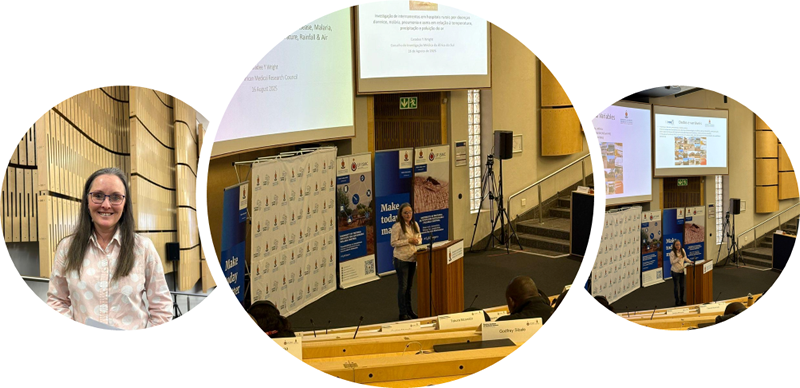 |
|
| CC&HRP team conducts nurses' debriefing session as part of fieldwork wrap-up | |
|
Baseline health assessments for the Resilient Youth Not in Employment, Education or Training (R-NEET) project have been concluded, which is part of work package three of the project, which includes conducting health assessments among youth from distressed communities and is led by the SAMRC. The nurses conducted 1102 health assessments from 03 April – 14 August 2025 in the Gauteng Province. On 15 August 2025, a nurses’ debriefing session was held at the SAMRC’s Johannesburg campus. The session aimed to explore best practices from the field, based on how participants responded to and engaged with fieldwork practices, with a focus on their participation from the perceptions of fieldworkers, to improve future research studies and enlighten researchers on adapting their protocols and research procedures. Among the session’s activities, Professor Caradee Wright expressed gratitude, giving a heartwarming vote of thanks to the nurses’ integral role during the assessments. Their impact has created three powerful legacies. A clinical legacy linking participants to healthcare that might be previously inaccessible. A scientific legacy guiding analysis, shaping interventions, and strengthening the evidence base for our youth-focused health services. And lastly, a social legacy that the services provided are respectful, relevant, and youth-friendly – beyond this project. |
|
| Heat Adaptation Benefits for Vulnerable Groups in Africa (HABVIA) July 2025 in-person meeting | |
|
The HABVIA project team led by Professors Mark New and Lara Dugas held an in-person meeting at the SAMRC Pretoria regional office with team members from Ghana, U.K. and South Africa – hosted by Dr Thandi Kapwata from the SAMRC between 21-25 July 2025. The week’s activities included progress updates, student presentations, planning for the year ahead and discussions about future collaborations building on the existing networks formed. There was also a site visit to Mphego in Thohoyandou, one of the four HABVIA research sites. The event showcased the successful implementation of a transdisciplinary climate change and health study aimed at improving health outcomes in vulnerable communities in Ghana and South Africa.
|
|
| Professor Caradee Wright attends two concurrent events supported by the Wellcome Trust | |
|
From 14-18 July, the Wellcome Trust hosted a training session and conference at the University of Leeds. Professor Caradee Wright was in attendance. Important discussions around climate change – specifically 1) mitigation – (referring to reducing the flow of greenhouse gases) and 2) adaptation – directed at anticipating the adverse effects of climate change and taking action to reduce these, were on the agenda at the Scenarios Forum 2025. Renowned researchers within the climate change and health space from across the world attended and were able to reconnect meaningfully with each other during a mixer. Much work exists within this diverse and ever-changing field of research. The E&HRU Climate Change and Health Research Programme (CC&HRP) remains committed to advancing innovation and policy change.
|
|
| E&HRU team participates in School of Health Systems and Public Health Research Day, University of Pretoria | |
|
Drs Tracey Laban, Chantelle Howlett-Downing and Ms Muthise Bulani attended the School of Health Systems and Public Health Research Day hosted by the University of Pretoria on 3 July 2025. The team was invited to set up an exhibition stand with posters, papers and other materials to showcase the work of the E&HRU Climate Change and Health Research Programme. The theme for the Research Day was “Navigating the Grey Zones: Ethics and AI in Public Health Research” and featured research presentations from postgraduate students as well as a lecture in health ethics. There was good engagement with students, researchers and faculty members and various requests have been made for a future webinar from SAMRC to showcase our work.
|
|
| Dr Tracey Laban attends the groundWork Community Health and Air Quality Knowledge Mapping Workshop on 24 June 2025 | |
|
Dr Tracey Laban was invited to participate in the Community Health and Air Quality Knowledge Mapping workshop hosted by groundWork and supported by the Climateworks Foundation on 24 June 2025 in eMalahleni. The objective of this workshop was to support and resource fenceline communities that practise forms of regenerative economies and open democracy, by strengthening their work, and helping them package their knowledge in a way that is recognised and easily exchanged with other affected communities in South Africa. Various stakeholders were requested to share their work, their strategies and how they dealt with challenges, so that this knowledge could be harvested in pursuit of environmental justice and health services that are tailored to the health challenges of residents in the Mpumalanga Highveld. Dr Laban shared insights on the role of researchers in ensuring they remain neutral and minimize subjectivity and bias to produce good science, as well as the challenge to communicate the science for public understanding. Lessons learnt in the campaign, along with those in the four other case studies, will now be developed into shareable learning resources, using a range of creative methodologies, to be shared at a learning festival to be held in Durban in October.
|
|
| Dr Renée Street visits Stanford University (USA) to meet with new project collaborators | |
|
Dr Renée Street from the Environment & Health Research Unit (E&HRU), together with Dr Rabia Johnson from the SAMRC’s Biomedical Research Innovation Platform (BRIP) recently visited Stanford University in California, USA, to kick off an exciting new collaboration focused on wastewater surveillance. The new project will focus on an innovative public health approach that could provide powerful new insights into HIV trends and treatment gaps in South Africa. This was the first in-person meeting between the SAMRC and Stanford teams, marking the official launch of discussions around the project’s goals and scope of work. The visit was particularly important as the project will be rolled out in Durban, one of the regions hardest hit by the HIV epidemic. Discussions focused on how to adapt and implement Stanford’s research approach in a South African context, and how the data collected could help identify treatment gaps and improve responses at a population level. The partnership aims to pioneer a new tool in South Africa’s fight against HIV—bringing research, technology, and public health closer together in the service of community well-being. 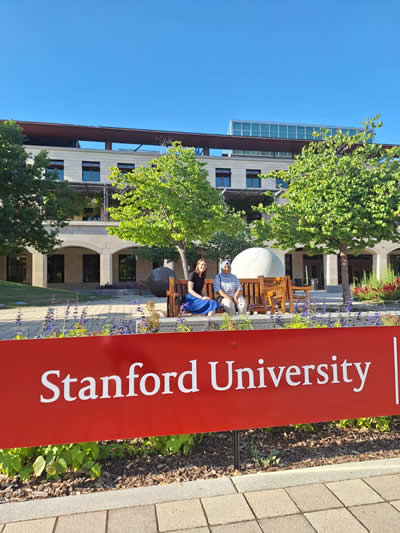
|
|
| Dr Chantelle Howlett-Downing participates in the F20 Climate Solutions Forum between 27-28 May 2025 | |
|
The F20 Climate Solutions Forum 2025 was held between 27-28 May, and the event theme was, “Trust. Transition. Transformation: Building Relationships for Climate Solidarity”. This year the forum was held at Kirstenbosch, Cape Town where more than 300 scientists, consultants, NGO’s and members of government collected to offer input into finding long lasting solutions for climate change. Dr Chantelle Howlett-Downing from the SAMRC’s E&HRU Climate Change and Health Research Programme (CC&HRP) was also in attendance at the event. The steering committee have finalized seven broad recommendations that will be presented to the President of South Africa prior to the G20 meeting. These include:
For more information read here. |
|
| Professor Caradee participated in the Clean Air Fund Board, Funders and Grants and Charitable Activities Committee Annual Meeting | |
|
The Clean Air Fund (CAF) hosted the Clean Air Fund Board, Funders and Grants and Charitable Activities Committee Annual Meeting in Krakow on 19-23 May 2025. Progress for the 2024 calendar year and soliciting feedback from Board and Committee members and an opportunity to showcase the work being done in Poland were the main aims of the event. Professor Caradee Wright visited projects in Krakow and Warsaw funded by the CAF, where the focus is to reduce transport and household burning air pollution. This strengthens existing collaboration between the CAF, other stakeholders and the SAMRC – given that the SAMRC has received funding from the CAF for a study to assess air pollution-related health impacts in South Africa. Professor Wright was also struck by the work Krakow has done to better the flow 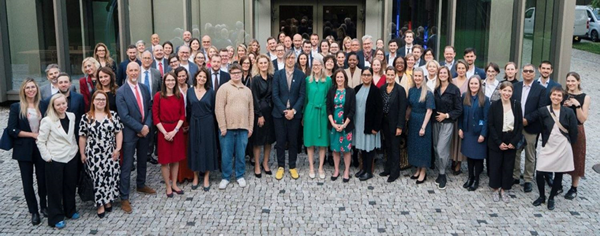 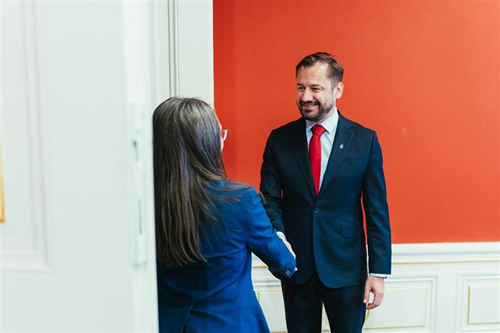 |
|
| Ms Muthise Bulani attends the AWARE Research Coalition Workshop | |
|
From 29 April to 1 May 2025, the Advance Warning and Response (AW&R) Research Coalition workshop was hosted by the Brown University Pandemic Center and Washington State University in Kenya. The workshop aimed to investigate positive outliers in AW&R systems, specifically those that are essential for mitigating infectious disease threats across the world, and to identify the best practices for effective AW&R systems. Ms Muthise Bulani was among the attendees and participated in various group presentations aligned with the Climate Change and Health Research Programme work. She also mused that South African AW&R work is on par with other systems, although improvements can be made. 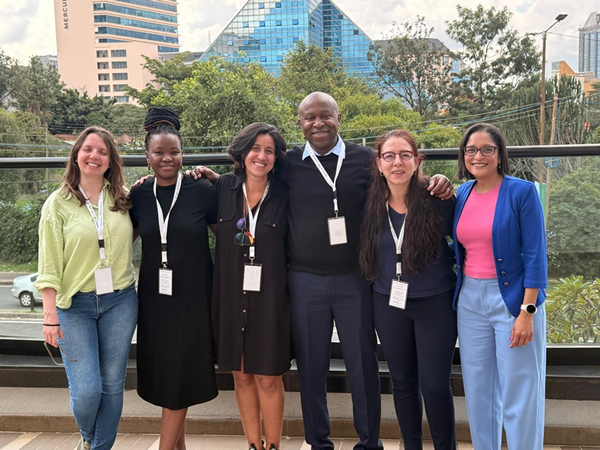 
|
|
| Dr Renée Street Elected Fellow of the African Academy of Sciences | |
|
We are proud to announce that Dr. Renée Street, Unit Director and Chief Specialist Scientist, has been elected as a Fellow of the African Academy of Sciences (FAAS) - a prestigious recognition of her exceptional contributions to science on the continent. Dr Street’s election follows a rigorous, multi-level review and voting process conducted by the African Academy of Science (AAS) Membership Advisory Committees and endorsed by the Governing Council. The Fellowship is a testament to her impactful research, leadership, and commitment to improving environmental and public health. As an AAS Fellow, Dr Street joins a distinguished community of Africa’s leading scientists and innovators who contribute to advancing science, shaping policy, and promoting evidence-informed solutions across the continent. She will also play a vital role in AAS activities, including working groups, scientific review panels, and regional collaborations aimed at addressing Africa’s most pressing health and development challenges. We extend our heartfelt congratulations to Dr Street on this well-deserved recognition. 
|
|
| Ms Setshaba Taukobong attends the ISCB-AFRICA – Conference on Bioinformatics taking place in Cape Town, South Africa, from April 14 to 17 2025 | |
|
Ms Setshaba Taukobong attended the ISCB-Africa ASBCB 2025 conference, held from April 14 to 17, 2025, in Cape Town, South Africa. The event brought together a dynamic community of global and African researchers to explore advancements and challenges in the field of bioinformatics and computational biology. The conference featured a comprehensive scientific program with over 200 scientific talks and poster presentations. Sessions covered a diverse range of topics, including AI in Genomics and Precision Medicine, Bioinformatics Education, Agricultural Bioinformatics, Data Governance, Metagenomics, Pathogen Genomics and General Bioinformatics and Computational Biology. As part of the conference program, Ms Taukobong presented a research poster titled “Leveraging Machine Learning for COVID-19 Outbreak Prediction through Wastewater Surveillance in the Western Cape, South Africa.” The presentation highlighted ongoing work at the SAMRC WSARP program in applying AI to public health surveillance through wastewater-based epidemiology. The conference offered a valuable opportunity to stay up to date with cutting-edge tools and technologies, engage in networking, and receive constructive feedback and validation on the current AI solution being developed within the WSARP. 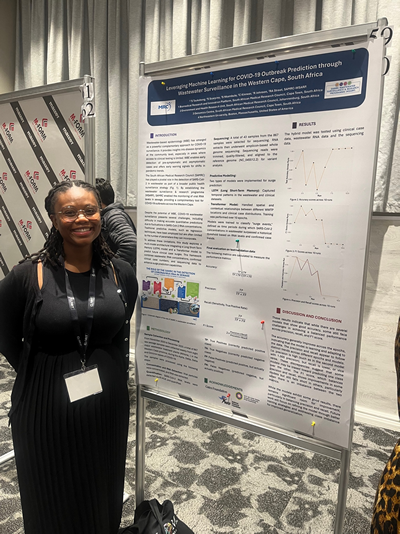
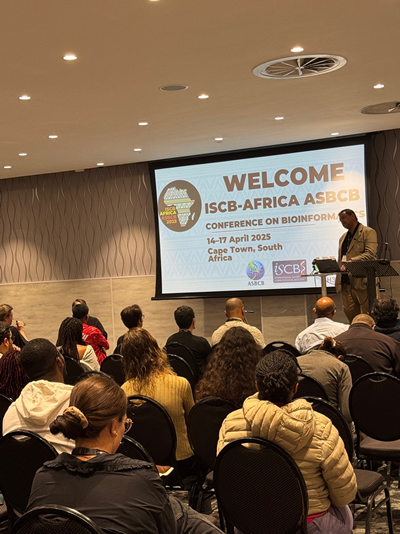
|
|
| Professor Caradee Wright attends the ARCH and WMO meetings from 8-12 April 2025 in Geneva | |
|
Between 8 and 12 April 2025, Professor Caradee Wright attended the Global Atmospheric Watch - Air Pollution-Climate Change-Health Effects Nexus (ARCH) committee meeting and Streaming Urban-related activities in the GAW Programme Meeting joint meeting; which included SAG APP, GURME, GAFIS, IG3S and ARCH – in Geneva. The Air Pollution - Climate Change - Health Effects Nexus Working Group (ARCH WG) is designed to help coordinate GAW activities that support health-related strategies. This GAW Programme Meeting was a joint meeting that addressed urban air quality / climate / health challenges around the world – across its groups and streamlines urban-related activities within the Global Atmosphere Watch (GAW) programme to enhance Integrated Urban Services (IUS) under the World Meteorological Organization (WMO). Both meetings were hosted by the WMO and aimed to strengthen collaboration and integration of urban-related activities within GAW and across WMO, ultimately improving the delivery of the strategy and implementation plan and shaping the GAW roadmap for the coming years. Professor Caradee Wright serves as a member on these committees and actively participated in the ARCH and WMO meetings, including contributing to a discussion session. 
|
|
| Dr. Renée Street Highlights South Africa’s Leadership in Wastewater Surveillance | |
|
At the Southern Africa Regional Workshop on Wastewater Surveillance for Environmental and Public Health, held from 8–10 April 2025 in Johannesburg, Dr. Renée Street played a key role in showcasing South Africa’s progress and leadership in wastewater surveillance. This UNEP-led event, supported by WHO, SADC, and the EU’s Health Emergency Preparedness and Response Authority (HERA), brought together experts, government officials, and stakeholders from 16 Southern African countries to strengthen regional collaboration and capacity in using wastewater data for public and environmental health. Dr. Street presented during a crucial session focused on practical examples and case studies from South Africa, where she shared insights on how wastewater surveillance is already contributing to early disease detection, monitoring environmental pollutants, and supporting public health action. Her input formed part of a broader discussion that emphasized the value of integrated surveillance approaches and South Africa’s innovation in applying this emerging science. She also contributed to training sessions aimed at building technical capacity among participants, covering sampling, data communication, and real-world applications of wastewater surveillance. Dr. Street’s involvement underscores the SAMRC’s commitment to advancing public health research and collaboration across the continent. Her leadership at the workshop not only reflected South Africa’s achievements but also inspired other countries in the region to harness the potential of wastewater as a tool for early warning, disease monitoring, and sustainable development. 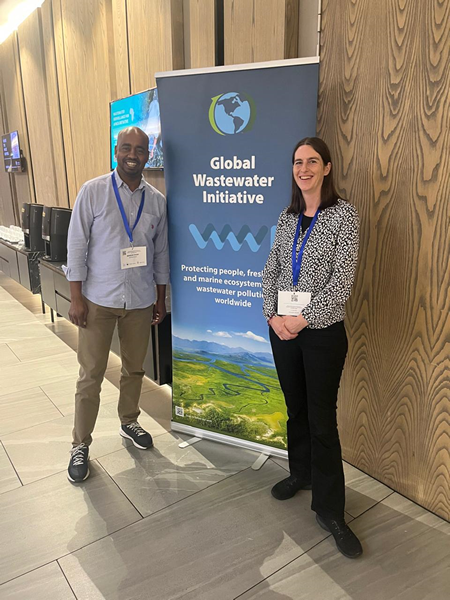
|
|
| Mr Ngwako Kwatala attends the Public Health Association of South Africa (PHASA) Conference 2025 | |
|
Between 6 to 9 April 2025, the annual Public Health Association of South Africa (PHASA) Conference was held in Worcester, Western Cape, hosted by PHASA. The conference aimed to provide a platform for health practitioners to share their experiences and research, discuss challenges faced in the sector, and engage with key stakeholders. Mr Ngwako Kwatala attended various sessions, covering topics such as community engagement, occupational and environmental health, and public health education, training and research. Each session addressed specific issues, including interactions between communities and academia, exposure levels of different pollutants and their associated health implications. Additionally, Mr Kwatala gained valuable insights into how patient information is shared amongst health practitioners and how knowledge from their respective fields is collected and utilized. Mr Ngwako Kwatala is hopeful that there will be opportunities for the SAMRC to collaborate with institutions specializing in citizen science to co-develop scientific research materials. He also noted the innovative ways some institutions are leveraging technology to alert the public about climate variables and their impacts on human health.
|
|
| Ms Setshaba Taukobong attends the Global AI submit on Africa meeting taking place in Kigali, Rwanda, from April 1 to 4, 2025 | |
|
Ms Setshaba Taukobong attended the Grand Challenges AI Community meeting held on April 1-2, 2025, and the inaugural Global AI Summit on Africa that took place on April 3–4, 2025, in Kigali, Rwanda, hosted by the Government of Rwanda. The Grand Challenges AI Community meeting featured over 50 grant recipients from 17 low- and middle-income countries, supported by the Bill & Melinda Gates Foundation and Grand Challenges network. Day one included roundtable discussions on individual artificial intelligence (AI) solutions addressing some of the world's urgent health care challenges, followed by poster presentations on the second day to showcase these AI solutions. Over 2,000 delegates attended the inaugural Global AI Summit on Africa, including heads of state, policymakers, academics, researchers and AI experts. The summit’s theme was: “AI and Africa’s Demographic Dividend: Reimagining Economic Opportunities for Africa’s Workforce.” Key discussions focused on harnessing the power of AI to boost innovation and competitiveness across Africa’s economies, industries, and societies. Positioning Africa as a global leader in the ethical, trustworthy, and inclusive adoption of AI was emphasised. The event also highlighted the importance of promoting the sustainable and responsible design, development, deployment, use, and governance of AI technologies across the continent. 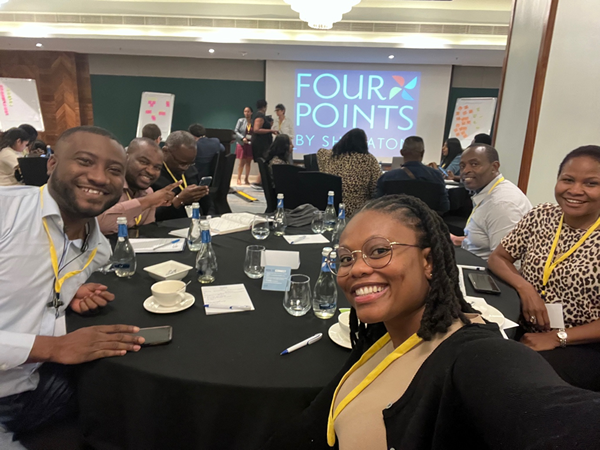
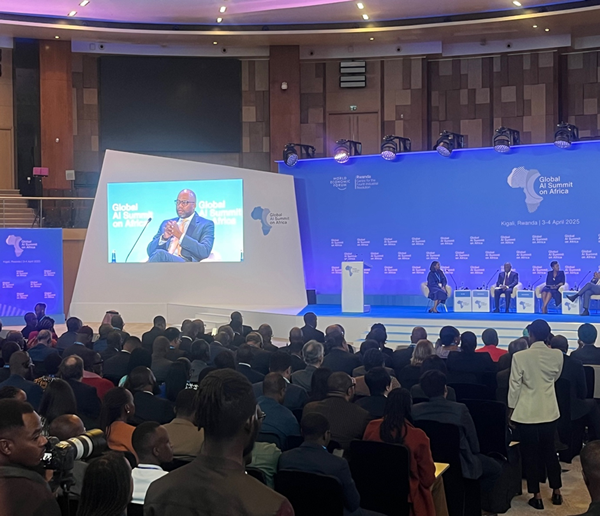
|
|
| Prof Caradee Wright and Dr Thandi Kapwata participate in the Second WHO Global Conference on Air Pollution and Health in Cartagena, between 25-27 March 2025 | |
|
The World Health Organization (WHO) recently organized the Second Global Conference on, “Air Pollution and Health: Accelerating action for clean air, clean energy access and climate change mitigation”, in collaboration with the Republic of Colombia – at the Centro de Convenciones Cartagena de Indias. Various stakeholders and high-level United Nations agencies’ representatives attended the conference. Objectives for the Conference included presenting evidence, identifying gaps, and showcasing tools for health impact assessment, aimed at practitioners and other technical and political representatives on day one. Day two focused on translating evidence into actionable solutions at different levels of government, while day 3 centred around next steps. Professor Caradee Wright addressed sessions on, “Science & Policy Roundtable: Since the release of the WHO AQG good practice statements for sand and dust storms, how has public health protection from SDS changed?”, and “Waste burning challenges and opportunities in LMICs” – as well as the Q&A session. Dr Thandi Kapwata participated in the Emerging Leaders Workshop which was based around the conference. The workshop brought together emerging researchers from low- and middle-income countries globally, to advance understanding of the connections between scientific research in the context of air pollution, climate change, and health. Read more here. 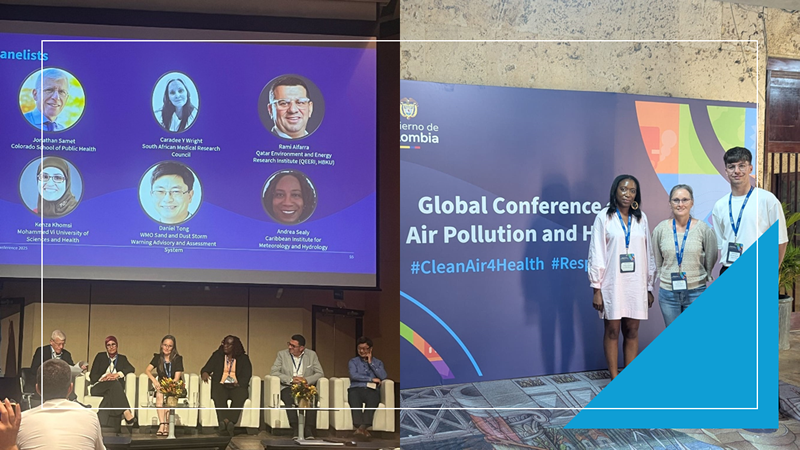 |
|
| E&HRU team attends the BIOGRIP soil and water node environmental biogeochemistry field sampling course | |
|
The Water, Sanitation and Society (WSS) Research team attended the Environmental Biogeochemistry field sampling course from 17-19 March 2025. The course was hosted by the Central Analytical Facilities (CAF) at the BioGrip Node for Soil and Water Analysis at Stellenbosch University. Topics covered in the course included environmental isotopes, dust sampling (land & water), trace metal analysis and contaminants of emerging concern. The procedures of field sampling for different environment samples, sample preparation techniques and analysis were covered. Participants were given a laboratory tour and overview of the various equipment such as the isotope ratio mass spectrometer, inductively coupled - mass spectrometer, and liquid chromatography-mass spectrometer. The team gained meaningful insights from the course, which will be beneficial for project planning and setup. 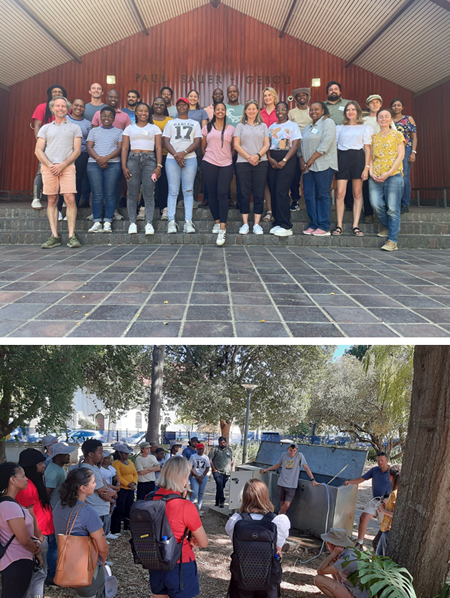 |
|
| Dr Street joins high-level panel on AMR at IWA International Conference | |
|
Dr. Renée Street was recently invited to join a high-level panel at the finale of the AquaticPollutants Roadshow, which took place on March 17, 2025, in Cape Town, as part of the 14th IWA International Conference on Water Reclamation and Reuse. The event focused on the urgent global challenge of emerging pollutants and antimicrobial resistance (AMR) in aquatic ecosystems, such as chemicals, pharmaceuticals, and industrial by-products. Emerging pollutants, or contaminants of emerging concern (CECs), pose significant environmental and health risks, particularly as their release and persistence in aquatic environments are expected to increase due to factors like industrial growth, inadequate waste management, and climate change. These pollutants are harmful not only to ecosystems but also to public health, making effective management crucial. Dr. Street’s participation on the panel emphasized her commitment to bridging the gap between research and actionable policy solutions for managing aquatic pollution and AMR. Her insights will contribute to shaping future global strategies for environmental sustainability.  |
|
| Professor Caradee Wright attends the P4H project meeting in Belgrade 2025 | |
|
The Climate Change and Health Research Programme undertakes many studies that also feed into internationally funded projects such as Planet4HEALTH. SAMRC is one of 17 partners working on PLANET4HEALTH that entails finding multisectoral solutions to mitigate adverse effects of vector-borne diseases, environmental pollution and climate change. The SAMRC is leading Case Study 2 (CS2) out of a total of four case studies. CS2 is on, “Air pollution and health in South Africa: towards forecasting and preventing ill health effects.” Read more here. An annual General Assembly project meeting was held in Belgrade, Serbia between 10-11 March 2025. Various discussions on project components were had, including the work packages and CSs. Prof Caradee Wright co-presented on WP4 – which dealt with the topic of Communication, Dissemination and Policymaking. During the session on, “Discussion with CS1 and CS2 leaders”, Prof Wright acted as co-moderator. The E&HRU CC&HRP team looks forward to ramping up its project work this year.  |
|
| Dr Renée Street leads Science Advice workshop in Kigali | |
|
Dr. Renée Street led a two-day capacity-building workshop on science advice in Kigali, Rwanda. This event was part of an initiative organized by the African Chapter of the International Network on Governmental Science Advice (INGSA-Africa). The primary aim of the workshop was to engage with the INGSA-Africa Hub-Rwanda team on essential knowledge and skills related to the principles and structures of science advice. It also focused on the significant role that evidence plays in shaping effective policymaking and offered strategies for efficient knowledge mobilization. Throughout the workshop, Dr. Street and her fellow facilitators guided participants through a series of presentations, general discussions, and training techniques designed to enhance their understanding of science advice. The sessions included interactive fictional case studies, allowing attendees to engage with real-world scenarios and apply what they had learned in practical ways. As a founding member of INGSA-Africa, Dr. Street has been a key advocate for integrating evidence-informed science advice into policymaking in Africa. Her expertise and involvement in the workshop highlighted her deep commitment to promoting the effective use of scientific evidence in shaping public policy across the continent. The workshop's interactive nature encouraged active participation, fostering a collaborative learning environment for all involved.  |
|
| CC&HRP team hosts collaborative workshop with the FCDO: Discussion on study findings – 6 March 2025 | |
|
The E&HRU Climate Change and Health Research Programme (CC&HRP) team undertook a study to investigate the health impacts of those living in districts with coal-fired power stations (CFPS), compared to those who do not live near these power stations – which was funded by the British High Commission (BHC) i.e. the Foreign, Commonwealth Development Office (FCDO). Evidence showed that those living near CFPS were at a 6% greater risk of being negatively impacted, than those who live in areas away from CFPS. Further, the study is the first of its kind on the continent, given that real data and not a modelling approach was used. Therefore, the team hosted a workshop to discuss key findings and recommendations – in collaboration with the FCDO (6 March 2025). Key speakers such as Professor Rachel Kyte (Special UK Representative for Climate), Dr Patience Gwaze (DFFE) and Ms Ntombi Maphosa (Centre for Environmental Rights) attended the event. Various media houses were also present. Professor Caradee Wright gave an overview of the study and its findings and Dr Thandi Kapwata facilitated the Q&A session. Commitments to find sustainable solutions to air quality issues in Africa were reaffirmed. A report is also set to be published in the coming weeks. 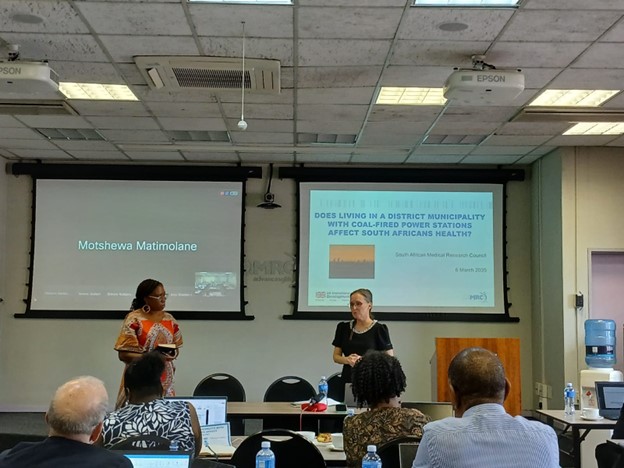 |
|
| Prof Kalpana Balakrishnan visits the SAMRC as part of the DVS Programme 2025 | |
|
Prof Kalpana Balakrishnan visited South Africa from 3-14 March 2025 as part of the Distinguished Visiting Scholar (DVS) Programme – in various provinces – in collaboration with the Department of Science and Innovation, Academy of Sciences in South Africa (ASSAf) and the South African Medical Research Council (SAMRC). The 2024/2025 DVS award was given to Prof Caradee Wright for her nomination of Prof Balakrishnan. Prof Balakrishnan is a world-renowned scholar on household air pollution, ambient air quality, as well as research on the global burden of disease, among other areas. During her visit at the School of Health Systems and Public Health at the University of Pretoria (UP), Prof Balakrishnan gave a presentation on, “Air Pollution and Climate Equity Considerations for getting to net Zero.” Prof Balakrishnan demonstrated the burden of climate change effects of those who have less access to resources to mitigate emissions, or the ability to finance solutions relating to climate actions. Dr Thandi Kapwata attended Prof Balakrishnan’s talk at the University of Johannesburg (UJ). This talk aligns strongly with the goals and objectives that the E&HRU Climate Change and Health Research Programme aims to address in its research into climate change, air pollution and human health impacts.
|
|
| CC&HRP team welcomes delegation at the SAMRC Pretoria offices | |
|
Recently, the E&HRU Climate Change and Health Research Programme (CC&HRP) hosted a delegation at the SAMRC Pretoria regional offices between 27-28 February 2025, as part of a domestic study tour hosted by the World Bank. The event, titled, “Gauteng City Region HAP & EWS Working Group Domestic Study Tour”, addressed the following objectives which included advancing dialogue on heat action planning and early warning systems in cities in the Gauteng region; evaluation of current resources – as well as determining gaps. Entities such as the South African Weather Services (SAWS) shared insights into data collection and network coverage, as well as dissemination through the South African Broadcasting Corporation (SABC) for creating public awareness – at their Centurion offices. Dr Thandi Kapwata and Mr Ngwako Kwatala presented research done on heat, at the SAMRC Pretoria regional offices. Wits RHI hosted the delegation at Laudium Community Health Centre, where temperature and humidity is measured. Another visit was arranged to a residential area where the homes are made from corrugated iron sheets with no windows – significantly increasing temperatures. Other presentations and visits followed. E&HRU aims to assist in providing scientific evidence of heat impacts in relation to health and effectively communicate findings to the public.
|
|
| Professor Caradee Wright presents at the ACDI Lecture at the University of Cape Town (UCT) | |
|
On 26 February, Professor Caradee Wright presented at the ACDI Lecture at the University of Cape Town (UCT). The presentation was titled, “SCALE-up –a new framework to assess the effectiveness of climate change adaptation interventions for health.” This is an overarching theme or research focus within the E&HRU Climate Change and Health Research Programme (CCHRP). Professor Caradee Wright emphasized that climate change adaptation interventions need to include strategies that address impacts on human health, while focusing on environmental health concerns. A case study from Senegal was used to illustrate the potential for improvement, if health impacts and outcomes are also considered. Professor Wright spoke to attendees regarding processes undertaken to publish a study on this related topic – as an NIH Scholar. The presentation was well attended, and Professor Caradee Wright appreciated the interaction with the staff and students and hopes to continue collaborations.
|
|
| Professor Caradee Wright attends the Workshop on Air Pollution and Health in East Africa: Current Evidence and Priorities for Future Action between 18 and 19 February 2025 | |
|
The Health Effect Institute’s (HEI) East Africa initiative aims to deepen the capacity to assess and communicate the health effects of air pollution, which is currently essential for the region. The workshop was hosted by the Health Effects Institute in partnership with AirQo, World Resources Institute Africa and the Eastern Africa GEOHealth Hub. Its aims included assessing the progress on air quality and health in East Africa, developing a consensus of current challenges and opportunities in air pollution and health research, in relation to local contexts and identify 3-5 short and medium-term goals for research and action that funders should prioritise. Professor Caradee Wright and Dr Pallavi Pant co-moderated the summary of discussions from the session on, “Health Effects of Exposure to Air Pollution.” Additionally, Professor Wright also chaired the session on, “Future Prospects for Research and Action on Air Pollution and Consideration for Climate Change and Public Health” – sharing key recommendations from a scoping review, as well as possible next steps. This workshop builds on existing and potential future research within the Environment and Health Research Unit (E&HRU)’s Climate Change and Health Research Programme. Professor Wright valued engaging with government departments and NGOs, who were also in attendance.
|
|
| Dr Thandi Kapwata presents at the Nexus Convening in Cape Town 2025 | |
|
Dr Thandi Kapwata attended the Heat Nexus Convening held in Cape Town from the 4th – 7th of February 2025. The convening brought together 35 participants from 9 projects which form part of the Wellcome Trust Heat Adaptation cohort. The meeting provided an opportunity for the Heat Adaptions Benefits for Vulnerable groups In Africa (HABVIA) project to showcase the study’s success to date. Dr Kapwata presented and facilitated a session on Climate Change and Ethics.
|
|
| Dr Thandi Kapwata presents at the Advocacy Symposium in Cape Town | |
|
Climate change poses significant risks to the health of people, and the environment. Moreover, rising global temperatures and extreme heat events have a greater impact on vulnerable population groups – including children. During the Advocacy Symposium hosted by the University of Cape Town (UCT)’s Department of Paediatrics and Child Health on 29 January 2025 on: Rising to the challenge of extreme heat: centring children in policy and practice, Dr Thandi Kapwata presented the E&HRU Climate Change and Health Research Programme’s projects and initiatives aimed at combating exposure of children to heat – where academics and paediatric physicians were in attendance. The Climate and Health Research Programme team remains committed to addressing issues brought about through increased occurrences of extreme weather events which affect vulnerable populations in South Africa, as well as continuing existing collaborations and pursuing potential future endeavours. 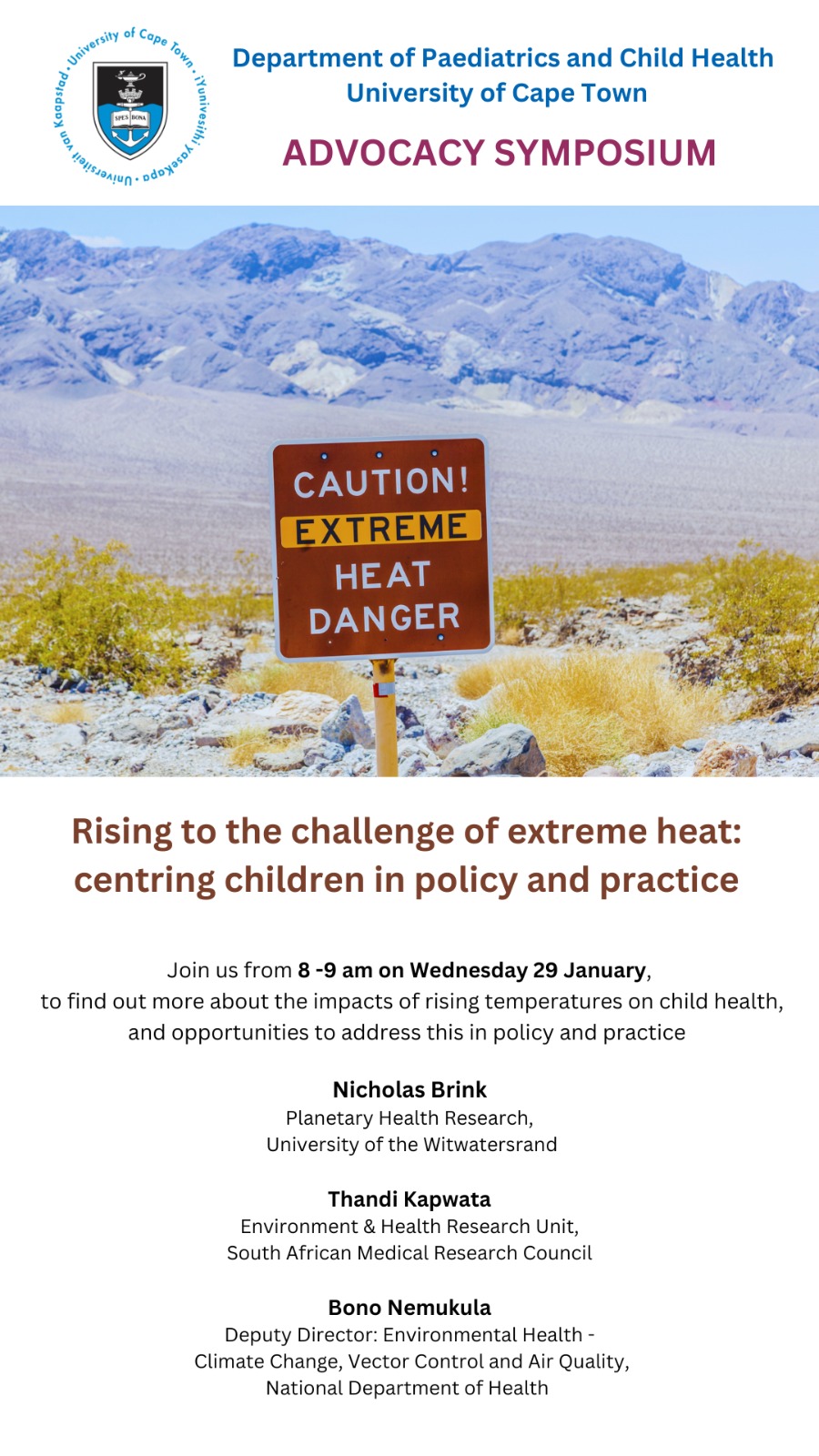
|
|
| Stakeholder Engagement on Lead (Pb) in Artisanal Cookware, Stakeholder mapping workshop – at SAMRC, Pretoria offices on 28 January 2025 | |
|
Dr. Renee Street and Ms. Melissa Nel from our E&HRU Persistent Toxic Substance Research Programme recently hosted a vibrant workshop that brought together government officials, researchers, occupational health experts, and industry leaders—all united to tackle the growing concern of lead in artisanal aluminium cookware. The session kicked off with Dr. Street shedding light on the health risks associated with lead exposure, setting the stage for an engaging day of ideas and insights. Next up was a look at global regulations on lead in aluminium cookware, followed by an interactive stakeholder mapping activity led by Ms. Nel. Participants enthusiastically worked together to identify key players, assess their roles, and explore ways to empower communities most affected by this issue, including local pot manufacturers and everyday consumers. This lively gathering marks an important step towards a collaborative approach to reducing lead exposure risks. As we move forward, we’re excited to continue the conversation, deepen our research, and engage with policy-makers to ensure a safer, more sustainable future for artisanal aluminium cookware in South Africa.
|
|
| The Climate Change and Human Health Research Programme team conducts training for the R-NEET project in Nigeria | |
|
From 27-29 January 2025, the SAMRC’s Climate Change and Human Health Research Programme team participated in a training and skills transfer event in Port Harcourt, Nigeria. The event was hosted by the University of Port Harcourt, in collaboration with the University of Leicester, University of Ibadan, University of Pretoria, and others. The training focused on work package 3 of the “Protecting African Youth who are not in education, employment or training (NEET) against depression: An investigation of differentially impactful, multisystemic resilience enablers (Resilient NEETs [R-NEET])” project, funded by the Wellcome Trust. Further, the project also includes Youth Advisory Committees. Co-led by Prof Caradee Wright, the project addresses physiological and environmental factors. Key activities include temperature measurements and health assessments. Prof Wright presented an overview of the project, emphasizing ethics and good clinical practice. Mr Ngwako Kwatala trained enumerators for the home environment data collection, and the nurses were trained by Mr Siyathemba Kunene. 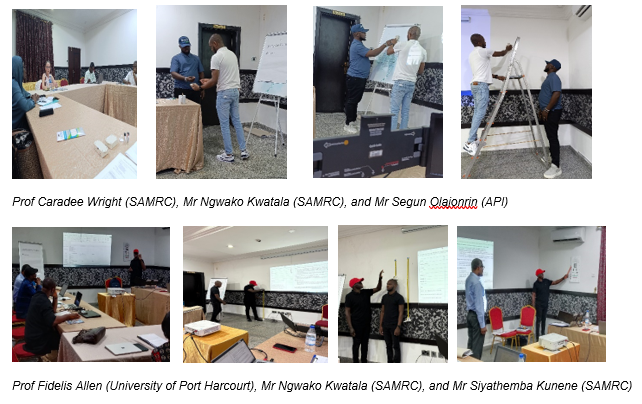 |
2024
| Dr Renée Street Leads Engaging Science-Policy Interface Session at Science Forum South Africa | |
|
At the 2024 Science Forum South Africa, Dr Renée Street led a dynamic and interactive session focused on the critical intersection of science and policy. The session, which was part of the event’s exploration of global challenges, emphasized the importance of science diplomacy and effective science-policy interfaces (SPI). The session featured an engaging analysis of a fictional case study that illustrated a multi-faceted science-policy issue. Facilitated by members of the INGSA-Africa Steering Committee, the session encouraged active participation from attendees, allowing them to explore real-world scenarios of science and policy collaboration. At the heart of the discussion was the need for bridging the gap between scientific research and policymaking. Dr Renée Street and the panel underscored the value of communication and collaboration between scientists and policymakers to ensure that evidence-based decisions are made, addressing complex societal issues. The session also highlighted the role of the International Network for Government Science Advice (INGSA) in strengthening global science advice systems through detailed case studies, offering attendees invaluable insights into effective practices. Through hands-on activities and interactive simulations, participants gained practical skills for navigating the challenges of the science-policy interface. 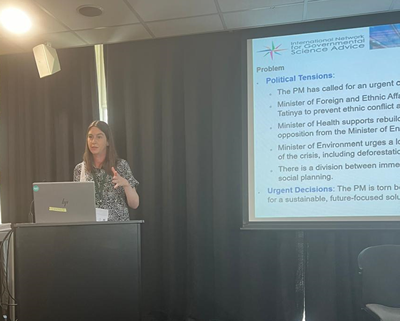 |
|
| EHRU team joins the SAMRC Health Awareness Walk | |
|
In the spirit of collaboration and promoting a healthy lifestyle, the SAMRC Corporate Marketing and Communications Division organised a Health Awareness Walk on 16 November, where staff members and families joined in on a 5km walk at Mouille Point Lighthouse in Cape Town. The E&HRU were excited to participate in this fun-filled day, where they not only celebrated health and wellness, but could take in the beautiful scenery on offer in Cape Town, while having casual chats and a few laughs with friends and family. The team’s participation in this event underscores the importance of staying active, fostering connections, and raising awareness about the benefits of a healthy lifestyle in both personal and professional spheres. 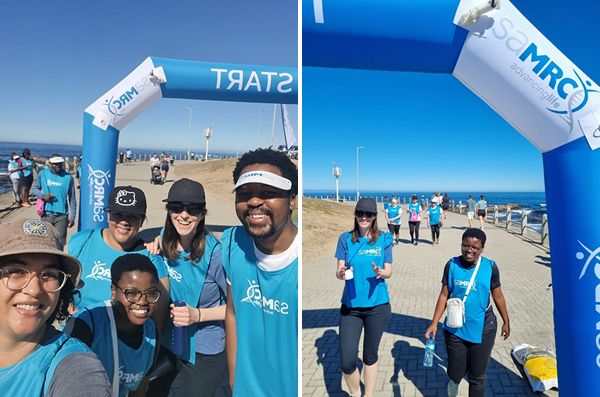 |
|
| Dr Renée Street presents at the Wastewater-Based Epidemiology event held at the Paris Brain Institute | |
|
On 12 November 2024, the Paris Brain Institute hosted a pivotal conference on wastewater-based epidemiology (WBE), held both in-person and online. The event brought together experts from across the globe to explore how wastewater analysis can help monitor and manage the spread of infectious diseases. Dr Street presented on the South Africa perspective offering valuable contributions to the discussions. The conference, supported by esteemed partners including the World Health Organization, 4EU+ Alliance (through the SWEALTH project), OBEPINE, Sorbonne Université, Geneva Health Forum, and Panthéon Assas University, delved into the significant role of WBE, which has gained prominence during the COVID-19 pandemic. Discussions focused on WBE’s potential in detecting and monitoring various infectious agents, such as respiratory viruses, arboviruses, and sexually transmitted infections, along with addressing global concerns like antibiotic resistance. By providing governments with critical health risk indicators, WBE offers a powerful tool for creating integrated health monitoring systems that address disparities in healthcare access. 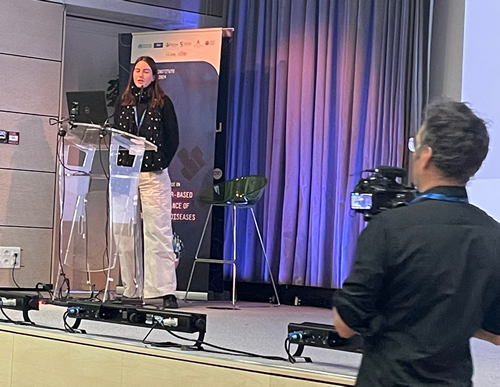 |
|
| Dr Thandi attended the Global Forum on Bioethics in Research | |
|
Dr Thandi Kapwata attended the Global Forum on Bioethics in Research (GFBR) held a two-day meeting in Kuala Lumpur, Malaysia in November 2024 on the topic: “Ethical issues arising in research into health and climate change.” The Global Forum on Bioethics in Research (GFBR) brings together researchers, research policy makers and ethicists, among others, to share experiences and promote collaboration around research ethics. This Forum is built around case study presentations to ensure that discussion of the ethical issues remain grounded in the practical realities of how research is conducted, particularly in low resource settings. Compared to traditional meetings, GFBR is unique in that it is limited in size and built around small group discussions of case studies that are submitted by participants. The Forum prioritises the participation of colleagues from low-and middle-income countries (LMICs), encourages networking and mentoring, and creates a venue for open and inclusive discussions. 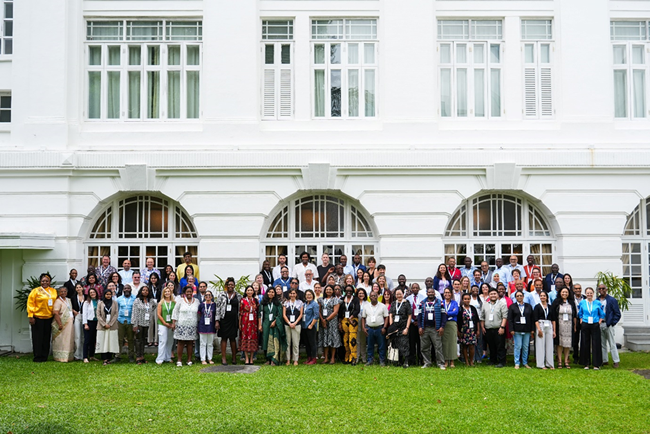 |
|
| Professor Caradee Wright attends the 4th ARIN annual International Conference on Climate and Health – 2024 | |
|
Between 6–8 November, the African Research and Impact Network (ARIN) hosted an interactive virtual session where scholars presented their work and engaged with experts. The main aims of the event were to foster the generation of new ideas and partnerships. Attendees included Professor Caradee Wright, who gave a keynote address on 7 November. The topic was entitled, “How can we effectively leverage existing networks at the climate-health intersection to enhance collaboration between climate and health organizations and bridge the gap between research and actionable outcomes?” Professor Wright believes that the conference could offer the possibility of future collaborations with other institutions stakeholders that were present. In terms of furthering current and future research, Professor Caradee Wright found the discussions with experts and researchers giving insight into current and possible research areas very valuable. |
|
| Dr Thandi Kapwata attends a convening at the Rockefeller Foundation's Bellagio Center on 4-8 November 2024 | |
|
From 4-8 November 2024, Dr Thandi Kapwata attended a convening at the Rockefeller Foundation's Bellagio Center in Italy. The title of the convening was, “A University Consensus Agenda on Climate, Health, and Equity Research." It aimed to bring together a small and select group of thought leaders from research universities across the globe who are focussed on the critical intersection of climate and health. As the global community endeavours to avoid and adapt to climate change, it is imperative to harness the special educational and research roles that universities occupy. Universities are not the public sector, private sector, or for-profit research sector. Research universities have unique roles to play in climate change and global health due to their interdisciplinary research mission, educational mission, operational footprint, and their ability to be seen as honest brokers and conveners of record. The convening on, “A University Consensus Agenda on Climate, Health, and Equity Research”, aimed to formulate a research agenda that takes stock of current efforts to guide climate and health research, identifies gaps with an eye toward capitalizing on the special strengths that universities can provide, and strategize how universities can more seamlessly integrate and contribute for a comprehensive research agenda. 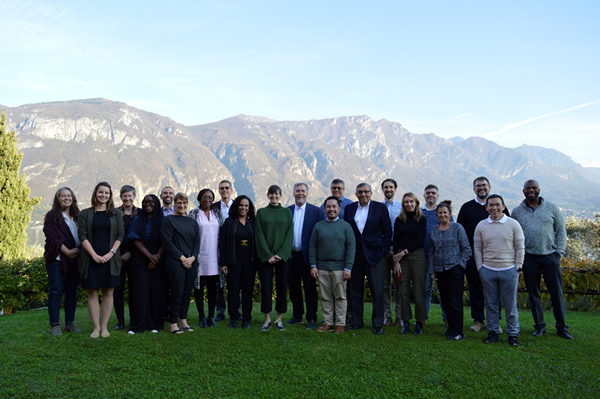 |
|
| Dr Tracey Laban attended the Public Interest Law Gathering 2024 at the University of the Witwatersrand | |
|
Dr Tracey Laban was invited to be part of a panel discussion at the Public Interest Law Gathering (PILG) 2024, held at Solomon Mahlangu House (Wits) on 3 and 4 December 2024. This forum brings together people from across South Africa and beyond and provides a space for attendees to discuss, debate, reflect and exchange skills, knowledge, ideas, and strategies on various topics concerning human rights and social justice. One of the panels discussed the question of whether a class action lawsuit to hold polluters accountable for the harm caused by air pollution is possible in South Africa. Dr Laban summarised the research and data that has been accumulated as evidence of the health effects of air pollution in South Africa. The other panellists were from groundWork, Richard Spoor Inc. and Centre for Environmental Rights who shared lessons learned from class action lawsuits in South Africa and experiences in public interest advocacy, working in communities in the Highveld Air Pollution Priority Area. It was concluded that a lot more needed to be done for this cause of action raising a triable issue and for the class action certification application to have any prospects of success. 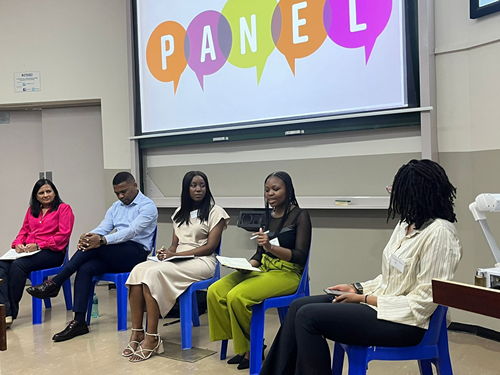
|
|
| CC&HRP team co-host research translation workshop with NIH CAFÉ at SAMRC HO | |
|
Within the research community, research translation is integral to linking policy and on the ground practices with current studies, so that healthcare is improved overall. However, implementation is slow – particularly in countries like South Africa that has limited resources, as well as the African continent overall. To address these challenges, the SAMRC Climate Change and Health Research Programme (CC&HRP) team collaborated with the organisation NIH-funded CAFÉ (based in the USA) and hosted a joint workshop on 22 November 2024 in Cape Town, along with other stakeholders. The objectives of the workshop included: Identifying the research translation opportunities and needs of climate-health researchers in Southern African countries. Generating ideas for research translation activities in select African countries based on gaps in national policy responses. Finally, producing a summary of climate-health research translation opportunities, priorities, and challenges to share with the CAFÉ Community of Practice, meeting partners and participants, and NIH, to facilitate consideration of further actions in this arena. Professor Caradee Wright and Ms Muthise Bulani gave a presentation entitled, “Critical Climate-Health Challenges in Southern Africa.” Informative and thought-provoking group discussions formed part of the day’s events, including a commitment to continuing the conversation. 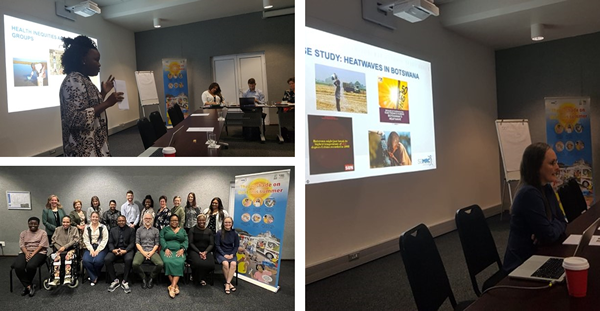
|
|
| Mr Ngwako Kwatala attends the City Resilience Knowledge Exchange: Lessons from Ahmedabad for Extreme Heat Resilience in South Africa event | |
|
Following research relating to heat health and collaborations with organisations including the SAMRC, the World Bank hosted an event on the City Resilience Knowledge Exchange: Lessons from Ahmedabad for Extreme Heat Resilience in South Africa, in Ahmedabad from 11-15 November 2024. The event aimed to advance dialogue on heat action planning and early warning systems in cities in the Gauteng Region, i.e. Johannesburg, Ekurhuleni, and Tshwane, as well as develop a Heat Action Plan for Gauteng Region using the lessons from Ahmedabad Heat Action Plan. Efficient ways of developing cooling systems in heat events were also discussed. Attendees, including Mr Ngwako Kwatala from the SAMRC CC&HRP team, participated in various activities which included presentations on case studies. The group also visited places such as CEPT University and the Sardar Vallabhbhai Patel Hospital. Visiting informal settlements was also part of the tour – to showcase how the city is adapting to rising temperatures, through acting by painting rooves white. A local newspaper also reported on the event. Mr Kwatala believes that the E&HRU team can acquire and produce evidence-based research that the province, cities and departments should use to inform policies relating to the impacts of climate change to public health. 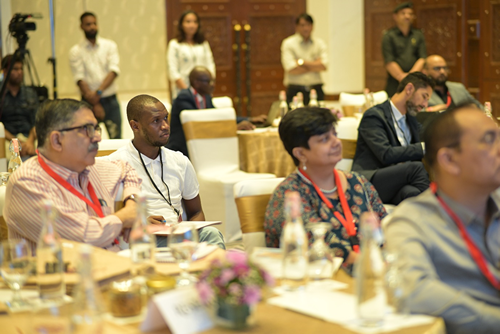
|
|
| Professor Caradee participates in National Department of Health Climate Change and Health Webinar 2024 | |
|
On 6 November 2024, the National Department of Health – Environmental Health Directorate hosted a webinar that aimed to empower healthcare workers about the issues related to climate change and health in South Africa. The platform allows experts to see what research still needs to be undertaken – based on healthcare workers’ experience on the ground. More than 1500 people were in attendance and Professor Caradee Wright gave a presentation called, ‘Climate change related-health impacts in the world, Africa and South Africa – Why should we be worried?’ There will also be future webinar sessions relating to topics chosen by the healthcare workers. |
|
| Professor Caradee Wright participated in the Beijing Forum and World Meteorological Organization – Global Atmospheric Watch - Air Pollution-Climate Change-Health Effects Nexus (ARCH) committee meeting | |
|
From 1-3 November 2024, the Beijing Forum and World Meteorological Organization – Global Atmospheric Watch - Air Pollution-Climate Change-Health Effects Nexus (ARCH) committee meeting was held in Beijing. The Beijing Forum is a prestigious academic platform with a global influence and is co-hosted by Peking University, Beijing Municipal Commission of Education, and the Chey Institute for Advanced Studies. Added to this, the Air Pollution - Climate Change - Health Effects Nexus Working Group (ARCH WG) is designed to help coordinate GAW activities that support health-related strategies. The meeting aimed to facilitate international academic exchanges and trans-cultural discussions to foster social development, harmony between civilizations, and greater prosperity for humankind. Further, the meeting was co-sponsored by Peking University, the Beijing Municipal Commission of Education, and the Chey Institute for Advanced Studies. Professor Caradee Wright gave a virtual presentation on the, “Linkages and Opportunities For Applying Sustainability Principles To Advance Environmental Health: A South African Perspective” – which garnered much interest – and attended the WMO committee meeting.  |
|
| Dr Nomfundo Mahlangeni attends the Climate and Health Africa Conference on 29-31 October 2024 | |
|
Dr Nomfundo Mahlangeni attended the Climate and Health Africa Conference held at Harare, Zimbabwe between 29 – 31 October 2024. The conference theme was ‘Cultivating resilience in health: Towards unified equitable strategies for climate adaptation and mitigation in Africa’. It aimed to incorporate cutting-edge research evidence into understanding climate-health mechanisms, the health impacts, effective adaptation and mitigation intervention strategies, equitable climate research, and discuss how to effectively translate research into policy. The conference also served as a platform for sharing innovations, best practices, and solutions that enhance climate resilience in health. There were over 400 participants in attendance, representing 30 countries. The conference brought together ministers and high-level policymakers from 15 countries. Various teams were present, including the Heat Adaptation Benefits for Vulnerable Groups in Africa (HABVIA) project teams from South Africa and Ghana. Dr Mahlangeni, a collaborator on the HABVIA project, had the opportunity to share knowledge, exchange ideas and network with other climate and health researchers. The conference concluded with the launch of the ‘Harare Declaration on Climate and Health in Africa’, outlining a unified approach for climate-related health priorities going forward. 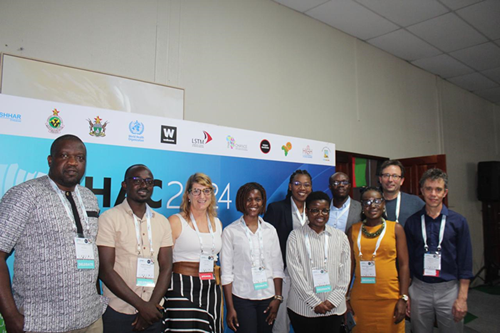
HABVIA team members at the Climate and Health Africa Conference 2024 |
|
| Dr Chantelle Howlett-Downing participates in the South African Society for Atmospheric Sciences (SASAS) 29 – 30 October at the University of North West (Potchefstroom) Conference | |
|
Dr Chantelle Howlett-Downing presented a poster on: Air quality at a legacy mining town and SPLUMA, Welkom 2022-2023. SASAS is an air quality and meteorology conference. Students and lecturers highlight their studies and present new work. The theme for the 2024 conference was, "Exploring the Novel Integration of Tools To Understand Our Changing Environment", emphasising the use of interdisciplinary methods to comprehend impactful weather and climate events across scales. By integrating insights from various scientific disciplines, predictive capabilities are enhanced as well as strategies developed for mitigating the impacts of these phenomena. Her poster was a study to determine the PM2.5 concentrations at two sites at a legacy mining town in South Africa. Samples were collected between 6 April 2022 to 23 April 2023 at two sites (Industrial and Residential), Welkom, Matjebeng Local Municipality. Data is stratified by seasons. When averaging the duplicate samples, a total of 73 observations for the 12-month dataset were recorded. Gravimetric analysis was used to determine PM2.5 concentration. The annual mean PM2.5 levels was 14.7 µg.m-3 (11.6 – 66) at the Industrial area and 6.34 µg.m-3 (6.34 – 23.4) at the Residential site. This study compared the old and new spatial planning trends in Welkom. 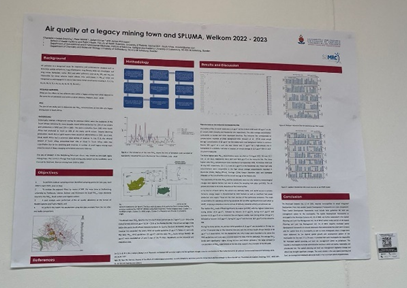 |
|
| Professor Caradee Wright participated in the One Health Research, Education and Outreach Centre in Africa Advisory Committee Meeting on 21-22 October 2024 | |
|
On 21-22 October 2024, the One Health Research, Education and Outreach Centre in Africa (OHRECA) Advisory Committee Meeting was held in Nairobi, hosted by the International Livestock Research Institute (ILRI). The OHRECA promotes the health of humans, animals, and the environment by supporting applied research, capacity development, and the translation of evidence into policy and practice within the framework of One Health. Further, the meeting was for the OHRECA team and postgraduate students to present progress from the past year, and for planning for the coming year. Professor Caradee Wright is an advisor and scores the postgraduate presentations and gives out awards to the top 2, apart from learning about trends in one health research in Africa to help inform the Climate Change and Health Research Programme (CCHRP) projects and proposals within the Environment and Health Research Unit (E&HRU). This year, Professor Wright initiated a new activity for the postgraduate students in asking them to listen to all the presentations and at the end, write down the most profound or striking thing that they heard. The two best reflections got prizes. 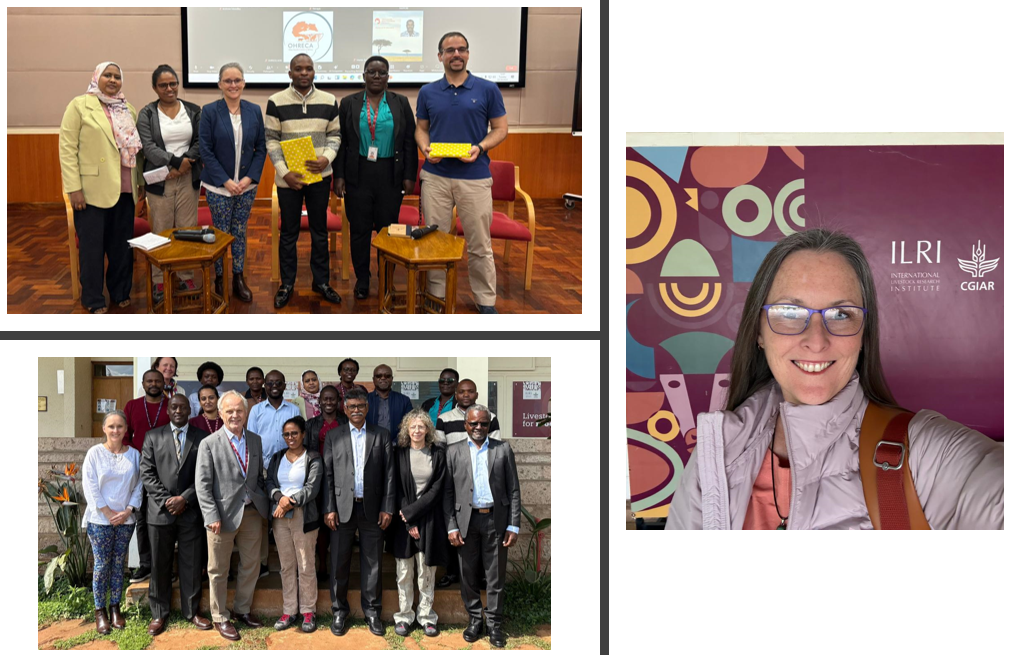 |
|
| Dr Chantelle Howlett-Downing presents at the UFS 30-year conference 11 – 12 October 2024 | |
|
This was the anniversary of the Centre of Environmental Management at the University of the Free State (UFS). The theme for the conference was ‘Sustainable horizons – Navigating the future with environmental innovation’. There was a range of talks that included: The role of sustainability reporting in promoting sustainable business practices in South Africa; Are we winning? Offset solutions: A get out of jail free card or a cost-effective solution to one of South Africa’s most intractable environmental problems? and Using macroinvertebrates to unravel the monitoring requirements of natural to near natural river systems. Dr Chantelle Howlett-Downing presented a poster, which was a 3 min presentation, on Air quality at a legacy mining town, a case study, Welkom, South Africa. It was a very pleasant conference, and she received constructive feedback. 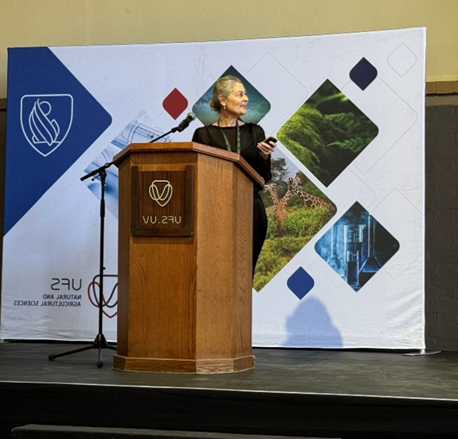
|
|
| Professor Caradee Wright attends the WHO Global Air Pollution and Health - Technical Advisory Group (GAPH-TAG) and Indoor Air Quality Guidelines Scoping Meeting | |
|
From 9-13 October, a meeting was held in Beijing at the Peking University that brought together experts and researchers from around the world to discuss scientific evidence and policy development regarding air pollution, climate change, energy, and health – hosted by the WHO and Peking University. The event facilitated knowledge exchange, evidence synthesis, collaborative research, and the development of actionable strategies to mitigate the health impacts of air pollution, climate change, and unsustainable energy use. Main objectives of the event included: discussing and advancing ongoing and planned WHO activities and products related to health impact assessment of air pollution, methods for assessing the co-benefits of climate action, desert dust and health and interventions and policies to address the health impacts of air pollution. It provides a platform to synthesize the latest evidence and policy changes on air pollution, climate change, energy, and health, as well as discuss ongoing and future activities that will also foster dialogues to accelerate the research and implementation of effective public health interventions. Professor Caradee Wright gave a presentation on air quality offsets and will be submitting a proposal to host a member of the TAG in South Africa and is inspired to conduct similar future research. 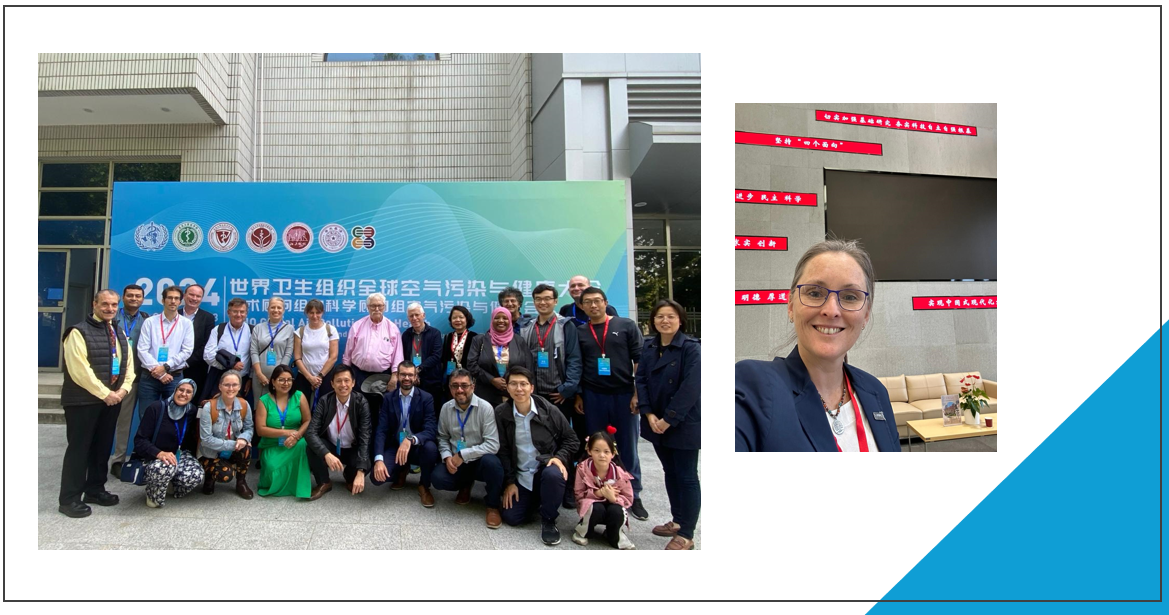 |
|
| Dr. Renée Street delivers keynote address at Lorentz workshop, Netherlands | |
|
Dr. Renée Street was invited to deliver a keynote address at the Lorentz workshop on wastewater surveillance, which took place between 7-11 October 2024 in Leiden, the Netherlands. Organized by a distinguished group of experts, the workshop focused on innovative approaches to infectious disease surveillance through wastewater analysis. Dr. Street’s extensive experience in environmental health and infectious disease dynamics positions her as a pivotal contributor to discussions on the challenges and solutions within this field. Her keynote address shed light on the complexities of wastewater surveillance, addressing both current methodologies and future research directions. The workshop fostered collaboration among researchers from diverse backgrounds, with the goal of drafting a comprehensive review or white paper that will be published in a high-impact journal. Dr. Street’s participation enhanced the workshop’s focus on interactive discussions, ultimately paving the way for innovative strategies in wastewater surveillance.
|
|
| E&HRU team participates in StemMentHER-GEN-S Programme 2024 | |
|
Amid national commemorations of World Environmental Health Day on 26 September, the Environment and Health Research Unit (E&HRU) – and other research units – hosted a group of grade 12 girls who are part of the StemMentHER Stellenbosch University and the University of Cape Town (UCT) respective cohorts. Founded in 2022, the StemMentHER programme aims to empower young girls interested in the fields of Science, Technology, Engineering and Mathematics (STEM) regarding careers that they may wish to pursue in future – alongside a mentor. As a pilot, the SAMRC collaborated with the StemMentHER cohort in Cape Town, allowing these learners firsthand experience into the type of research conducted at the country’s top science council – like during the GEN-S Programme. Dr Tahira Kootbodien presented an overview of E&HRU’s research conducted in the Water, Sanitation and Society, Persistent Toxic Substance, as well as Climate Change and Health Programmes. Ms Setshaba Taukobong illustrated bioinformatics and its practical applications, while Ms Amy Sheldon spoke to the role of science communication and research translation. They also alluded to their diverse higher educational backgrounds. Overall, the day’s programme activities were well-received. The SAMRC confidently positions itself as an employer of choice for these future scientists and related STEM careerists. 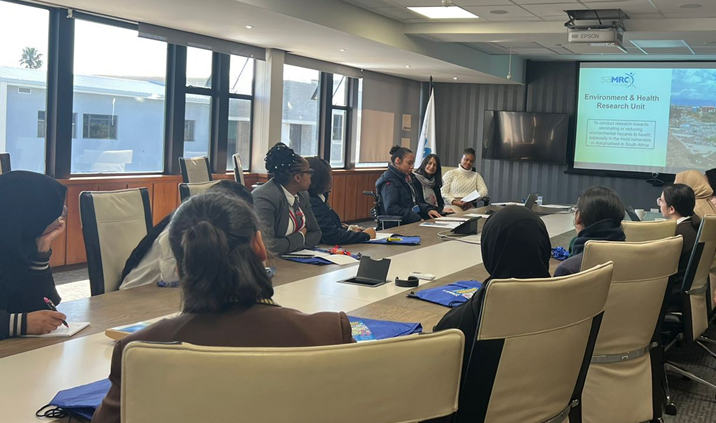 |
|
| Dr Thandi Kapwata attends the 1st Climate Change and Health Expert Group Meeting from 25-27 September 2024 | |
|
Climate Change presents the greatest threat to humanity and significantly impacts health globally. Africa suffers the great burden of its impact. There is mounting evidence of climate change-related impacts on human health in our continent leaving behind outbreaks, damaging infrastructure and rising burden climate sensitive diseases. Africa CDC understands the role of climate change in achieving its vision of a safer, healthier and more prosperous Africa. It prioritizes interventions at the Climate change and health nexus using the one health approach to potentially reduce the disease burden caused by climate change impact on health in the continent. The One Health approach recognizes the interconnectedness of human, animal, and environmental health, and emphasizes the need for a comprehensive approach to tackle these complex challenges. Africa CDC has convened an expert review meeting to develop draft zero of the Continental Strategy on Climate Change and Health to guide efforts and interventions of Africa CDC and other key continental stakeholders and member states in this sector. Based on long-standing successes, Dr Thandi Kapwata was invited to attend the 1st Climate Change and Health Expert Group Meeting to develop draft zero of the strategy documents – held from the 25-27 September in Addis Ababa. 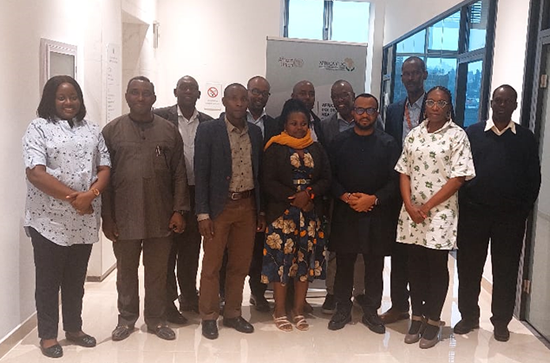 |
|
| Dr Tracey Laban attends the Frontiers of Science Workshop | |
|
Dr Tracey Laban attended the Frontiers of Science workshop hosted by ASSAf and the Royal Society (United Kingdom) held on 25-27 September 2024 in Johannesburg. The theme of the workshop was Environmental Health and implications on Human Health. Additionally, there were five subthemes within the main theme, namely Co-infection of TB and HIV and its implications, Smart materials, Air Quality, Adolescent mental health and Astrophysics. Dr Laban presented a poster on her work aligned to the subtheme on Air Quality. The aim of the workshop was to strengthen collaboration between South African and UK scientists and promote interdisciplinary approaches to address environmental health issues. An output of this meeting will be a written proceedings report to share recommendations for public health policies to mitigate environmental impact on human health. The report will be disseminated widely to stakeholders in the UK and Africa, informing future work on this topic by the Royal Society, ASSAf, and other stakeholders. 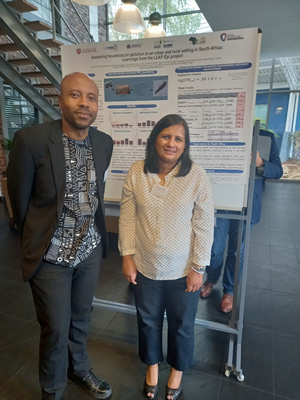 |
|
| E&HRU team participates in the 13th World Environmental Health Day 2024 Commemoration | |
|
The South African Medical Research Council’s (SAMRC) E&HRU team participated in the 13th World Environmental Health Day Commemoration hosted by the National Department of Health in collaboration with the Alfred Nzo District Municipality and the Eastern Cape Department of Health on 25-26 September 2024 in the Eastern Cape. The theme was “Environmental Health: Creating resilient communities through disaster risk reduction and climate change mitigation and adaptation”. An event objective was to provide a platform for Environmental Health Practitioners (EHPs) and other key stakeholders at various levels to share scientific and operational research to strengthening evidence-based intervention. Professor Caradee Wright facilitated the discussion in commission 1: Climate Change and Disaster Management. Dr Nomfundo Mahlangeni presented on “A healthy vulnerability Assessment tool (HEAT) to address heat-health vulnerability in South African towns.” Dr Yonela Mkunyana gave an oral presentation entitled “Building resilient communities through wastewater- based epidemiology” in commission 2: Environmental Health and Disease Control. E&HRU also ran an exhibition stand showcasing research translation material from three core research programmes: Climate Change and Human Health, Persistent Toxic Substance, and Water, Sanitation, and Society. Discussions around local sector challenges and collaborative opportunities ensued.
|
|
| E&HRU Hosts Stanford University Scholars | |
|
The Environment & Health Research Unit (E&HRU) recently welcomed a group of researchers from Stanford University, fostering international collaboration to tackle pressing environmental health challenges. This partnership emphasizes the importance of integrating diverse expertise to address issues such as pandemic prevention, preparedness and response. The visiting scholars from Stanford University in California (USA) bring innovative approaches and cutting-edge methodologies, enhancing ongoing projects in SAMRC’s wastewater surveillance and research program. By sharing knowledge and resources, this collaboration aims to improve public health outcomes in South Africa, where environmental factors significantly impact community well-being. During their visit, the Stanford researchers engaged in various activities, including presentations and laboratory tours. These initiatives promote knowledge exchange and build local capacity. Researchers from both institutions will collaborate on studies investigating the links between environmental exposures and health outcomes, paving the way for effective interventions. An online meeting allowed those unable to travel to South Africa to participate in the brainstorming sessions, ensuring inclusive dialogue and collaboration. Through this partnership, the E&HRU and Stanford University are not only advancing research but also working towards actionable solutions that can make a real difference in people's lives. Together, they are committed to creating a healthier future for communities affected by environmental challenges.  |
|
| Dr Chantelle Howlett-Downing attends the WCE in Cape Town 24-27 September 2024 | |
|
Dr Chantelle Howlett-Downing presented a poster on a case-crossover study between PM2.5 and hospital admissions for respiratory diseases in Pretoria. She found the conference very professional and enjoyed being around so many people with the same interests as hers from all over the world. Much of the focus was on identifying problems including sampling strategies to include diversity and age stratification, reducing censoring due to loss to study, proper questionnaires, and the transfer of scientific information to policy. New analysis techniques were not on the program. Dr Howlett-Downing attended the following workshops and sessions: The Hack-a-Thon workshop where we designed a new Environmental Epidemiology curriculum. Many of the attendees were lecturers from all over the world. It was very beneficial.
|
|
| Dr Renée Street attends the 8th World One Health Congress from 20-23 September 2024 | |
|
Dr. Renée Street recently attended the 8th World One Health Congress in Cape Town, a pivotal event that gathered over 1,400 participants from 87 countries to tackle pressing global health challenges. Spanning four days, the congress featured a robust agenda with sessions focused on One Health science, antimicrobial resistance, and the intersection of science and policy. One Health is an integrated approach recognizing the interconnectedness of human, animal, and environmental health. Dr. Street noted that the congress provided a unique platform for sharing groundbreaking research and fostering discussions on how to address urgent issues like zoonotic diseases and antibiotic resistance, where innovative solutions and strategies from around the world were showcased. During the conference, a key highlight was emphasizing viewing One Health through an African lens, allowing participants to consider diverse perspectives and local contexts – underscoring the importance of collaboration across sectors. The outcomes of this congress are expected to influence high-level discussions at the upcoming 79th UN Session, emphasizing the need for a unified response to health threats. Upon reflection, Dr. Street believes that the insights gained will be instrumental in shaping future policies and research initiatives in the One Health arena, ultimately promoting a healthier planet for all. 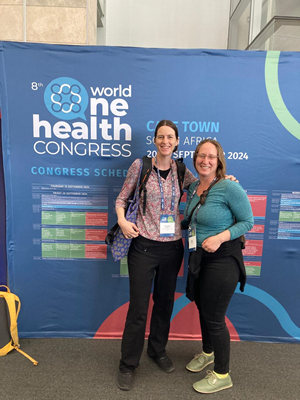 |
|
| Professor Caradee Wright participated in the virtual Africa climate and health responder course on 17 September 2024 | |
|
The Africa Climate and Health Responder course is a series of lectures and case studies hosted collaboratively by the WHO, AfricaCDC, CHANCE, Global Network for Academic Public Health, Columbia Mailman School of Public Health and Project ECHO. This course will run from 17 September to 22 October and equips African health professionals with the skills to identify, communicate, respond to, and prepare for climate-related health impacts. It is also a platform that hopes to reach and shape young minds, as well as giving back to the youth overall. On 17 September, Professor Caradee Wright presented on Climate change for the Health Professional and also connected with other researchers present. There were more than 2200 people attending the lecture. Read more here. 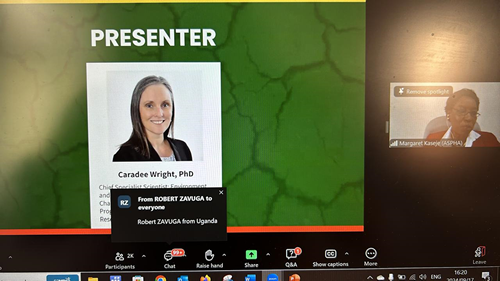 |
|
| Professor Caradee Wright attends the CoT Heat Health Response CPD Session on 16 September 2024 | |
|
The City of Tshwane (CoT) hosted a Heat Health Response CPD discussion at Tshwane House with other government officials on 16 September 2024. Within the Gauteng province, the health department aims to develop capacity of health care workers based on the research and work being done in the City of Tshwane and the province that emanates from impact of Heat to build case for adaptation and mitigation of heat within communities. In this way, Environmental Health Practitioners (EHPs) will have improved capacity to implement the interventions provided to communities against heat, create more awareness about heat for preparedness and adaptation during extreme weather events (heat waves) and disasters. Professor Caradee Wright was in attendance and presented on climate change and the impact of heat on health. Further, the Climate Change and Health (CCH) programme is now working on EHP guidelines for the CoT. This puts the South African Medical Research Council (SAMRC) and the CCH research team at the forefront of assisting government in creating resilient communities – as the City would like guidance on how to deal with climate change and health for EHPs.  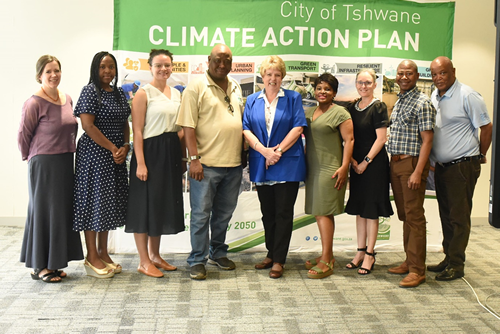 |
|
| Dr. Renée Street attends the Global Evidence Summit 2024 in Prague | |
|
At the Global Evidence Summit 2024, held in Prague from 10-13 September, Dr. Renée Street presented her research on "Translating Basic Science Research into Public Health Impact: Challenges of Wastewater-Based Surveillance Evidence Informing Cholera Outbreak Management." This summit provided a unique platform for global experts to engage in evidence-based practice across various sectors, including health, education, social justice, the environment, and climate change. Dr. Street's presentation delved into the use of wastewater-based surveillance for monitoring and managing cholera outbreaks. This method involves analyzing wastewater to detect the presence of pathogens like Vibrio cholerae, the bacterium responsible for cholera. By monitoring pathogen levels, public health officials can receive early warnings about potential outbreaks, allowing for timely and targeted interventions. Dr. Renée Street’s work at the summit underscored the vital need for integrating scientific research into practical public health strategies. The event served as a critical opportunity for colleagues from around the world to unite in their mission to tackle pressing issues through evidence-based approaches, reinforcing the importance of collaboration and innovation in addressing global challenges. 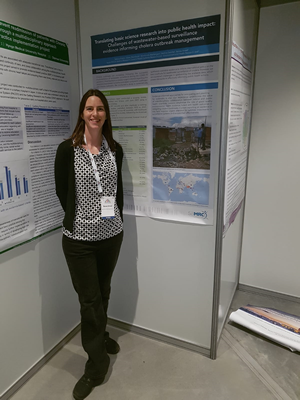 |
|
| Dr Chantelle Howlett-Downing participates in the iCACGP-IGAC Conference 2024 in Kuala Lampur - 6th to 8th September 2024 | |
|
Dr Chanelle Howlett-Downing presented a poster online: Using dispersion normalised – positive matrix factorisation (DN-PMF) as a sensitivity test for conventional PMF analysis at three towns in South Africa, 2017 -2018. The conference focused on new atmospheric testing and analysis methods and much of it was very advanced, but significantly exposed environmental epidemiologists to new and refined techniques for air pollution analysis that will refine studies and contribute to validation. The sessions focused on new scientific research that identifies and quantifies the impacts of weather and climate on surface air quality (which is Dr Howlett-Downing’s new focus). As surface air quality is affected by long-range transport and background concentrations of air pollutants (the quandary of mixtures), the conference also explored the impacts of weather and climate on air pollution levels in the free troposphere, or at remote surface locations. Dr Chantelle Howlett-Downing highly recommends these conferences and will apply to attend again next year. |
|
| Professor Caradee Wright and Ms Candice Webster attend the Wellcome Trust Workshop on Guidelines for Detection and Attribution of Climate Change Impacts on Human Health | |
|
During a two-day workshop hosted by the Wellcome Trust, University of Oxford and the University of Washington in London on 4-6 September 2024, delegates discussed the development of guidelines for Detection and Attribution of Climate Change Impacts on Human Health. The main aims of the workshop were to unpack the need for guidelines to inform high quality research that expands the range of climate change health-related impacts using attribution methods. In attendance were Professor Caradee Wright and Ms Candice Webster, who valued hearing about cutting-edge climate and health research as well as engaging with Wellcome Trust staff about joint activities to build on current work on overseeing the effectiveness of health adaptation interventions. There is also the possibility of writing a proposal with workshop attendees to do an attribution case study in multiple countries, including South Africa  |
|
| Dr Nomfundo Mahlangeni attends the 55th Annual Conference of the National Association for Clean Air in Johannesburg | |
|
Dr Nomfundo Mahlangeni attended the 55th Annual Conference of the National Association for Clean Air (NACA) held at the Mintek Conference Centre, Johannesburg, between 4-6 September 2024. The conference was themed, “Air quality evolution: Reflecting on 20 years of progress and charting future paths.” This event was held jointly with the Department of Forestry, Fisheries and the Environment’s (DFFE) Air Quality Governance Lekgotla. The aim of the conference was to bring together experts, policymakers, and other stakeholders to reflect on the challenges, accomplishments and lessons learnt in the past 20 years of air quality management in South Africa. Dr Mahlangeni presented a poster, and a 3-minute research talk entitled, ‘A review of the health impacts associated with coal-fired power stations: Global learnings to help guide policymaking in South Africa.’ Additionally, Dr Mahlangeni had the opportunity to interact with a range of air quality professionals in industry and academia. She also contributed to the conversation on the health impacts of air pollution in vulnerable population groups. 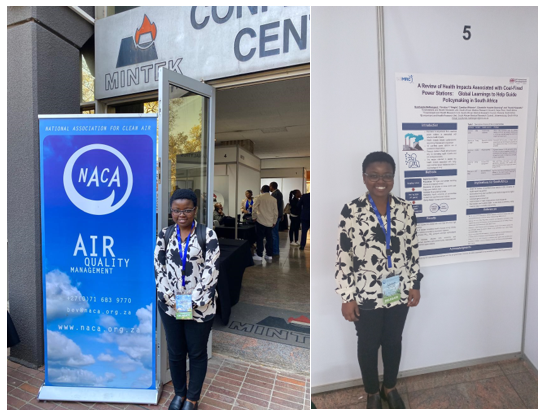 |
|
| Professor Caradee Wright and Dr Busisiwe Shezi participate in an online ASSAF webinar on One Health | |
|
Conceptually, One Health is gaining momentum within the scientific community. Climate change, pollution and toxic exposure is rifer and increasingly negatively impact the environment, animals and humans. To this end, Professor Caradee Wright and Dr Busisiwe Shezi presented at the virtual webinar on, ‘One Health in Africa: recognising the environmental role’ – hosted by the Academy of Science of South Africa (ASSAf) on 20 August 2024. Professor Angela Mathee facilitated the event. The aim of the webinar was to increase understanding of the status of research and action on One Health in Africa and present selected African case studies. These studies had a particular emphasis on the role of the environment in One Health. Additionally, the webinar aimed to highlight the under-studied relations between environment and health within One Health. Speakers also engaged with priorities and future directions for One Health in Africa. Topics such as climate change and One Health, as well as One Health and Environmental Exposure Science were covered by Professor Wright and Dr Shezi respectively. |
|
| E&HRU participates in, ‘The Sisterhood Dialogues’: Launch | |
|
In honour of Women’s month this year, the SAMRC Corporate Marketing and Communications and other Divisions launched the ‘Sisterhood Dialogues’ on 8 August 2024 – leading up to the celebration of Women’s Day on 9 August. The launch brought together women in the organisation based in Cape Town, sharing anecdotal advice on a variety of topics such as navigating careers, motherhood, health, budgeting and relationships – during panellist sessions. E&HRU Scientist, Ms Candice Webster, also graced the stage – advising on matters of the heart. A palpable feeling of security and sisterhood filled the space, punctuated by moments of vulnerability, as well as laughter throughout the event. The profound words "lift as you rise" by Prof Liesl Zühlke, quoting her mentor, the late Prof Mayosi, resonated deeply with the Women's Day celebration. These words encompass the holistic support system women can create for one another as they balance multifaceted roles. SAMRC Durban and Pretoria regions shared in the festivities on 16 August. Guided by its transformation mission, the SAMRC is committed to supporting and empowering its women constituents in the best possible manner and looks forward to hosting more such dialogues going forward. 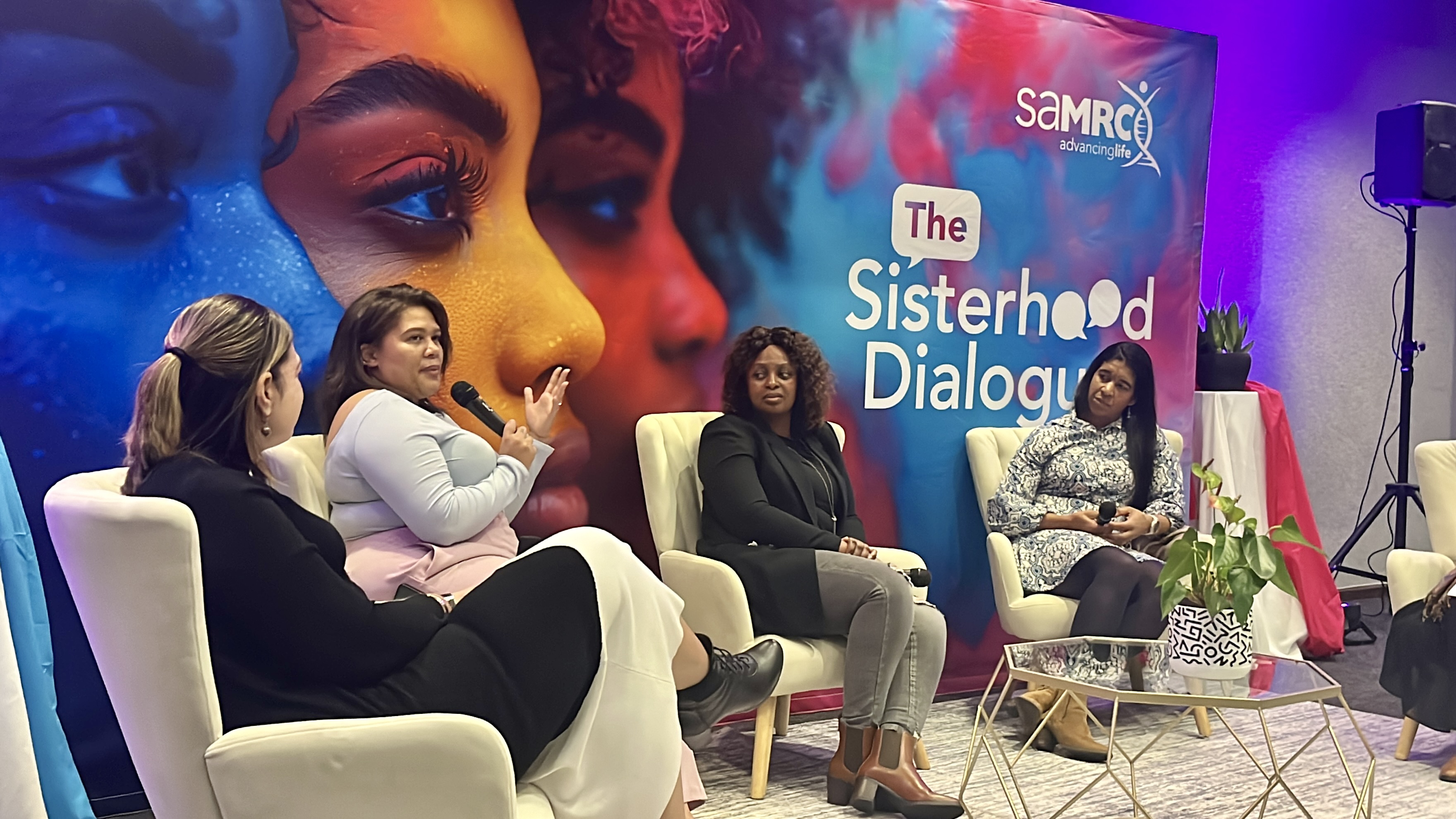
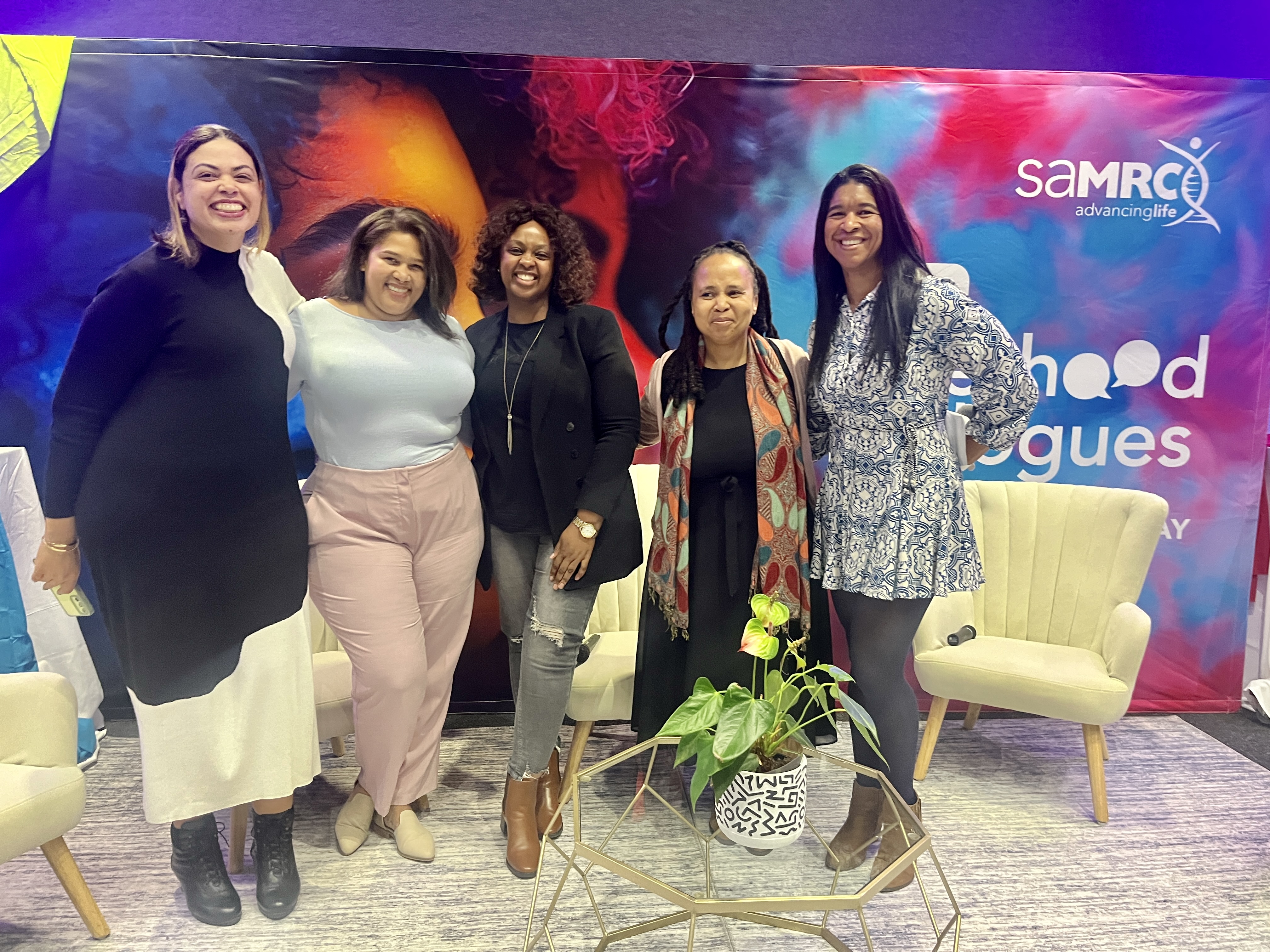 |
|
| Professor Caradee Wright participates in the GHHIN strategic planning meeting | |
|
The Global Heat Health Information Network (GHHIN) hosted a strategic planning meeting in Singapore from 22-26 July 2024 – which aimed to address next steps for the Network in collaboration with various stakeholders – including scientists, policymakers and practitioners. Attendees – which included the Environment and Health Research Unit’s (E&HRU) Professor Caradee Wright – engaged in robust group discussions and brainstorming during the meeting. Professor Wright also visited the National University of Singapore’s Heat Resilience & Performance Centre at the Yong Loo Lin School of Medicine. Work done at the Centre complement the heat and health research conducted in Professor Caradee Wright’s Climate Change and Human Health Programme – within the SAMRC’s Environment and Health Research Unit (E&HRU). Therefore, Professor Wright hopes that future collaborations will ensue that can advance research done around heat and health. 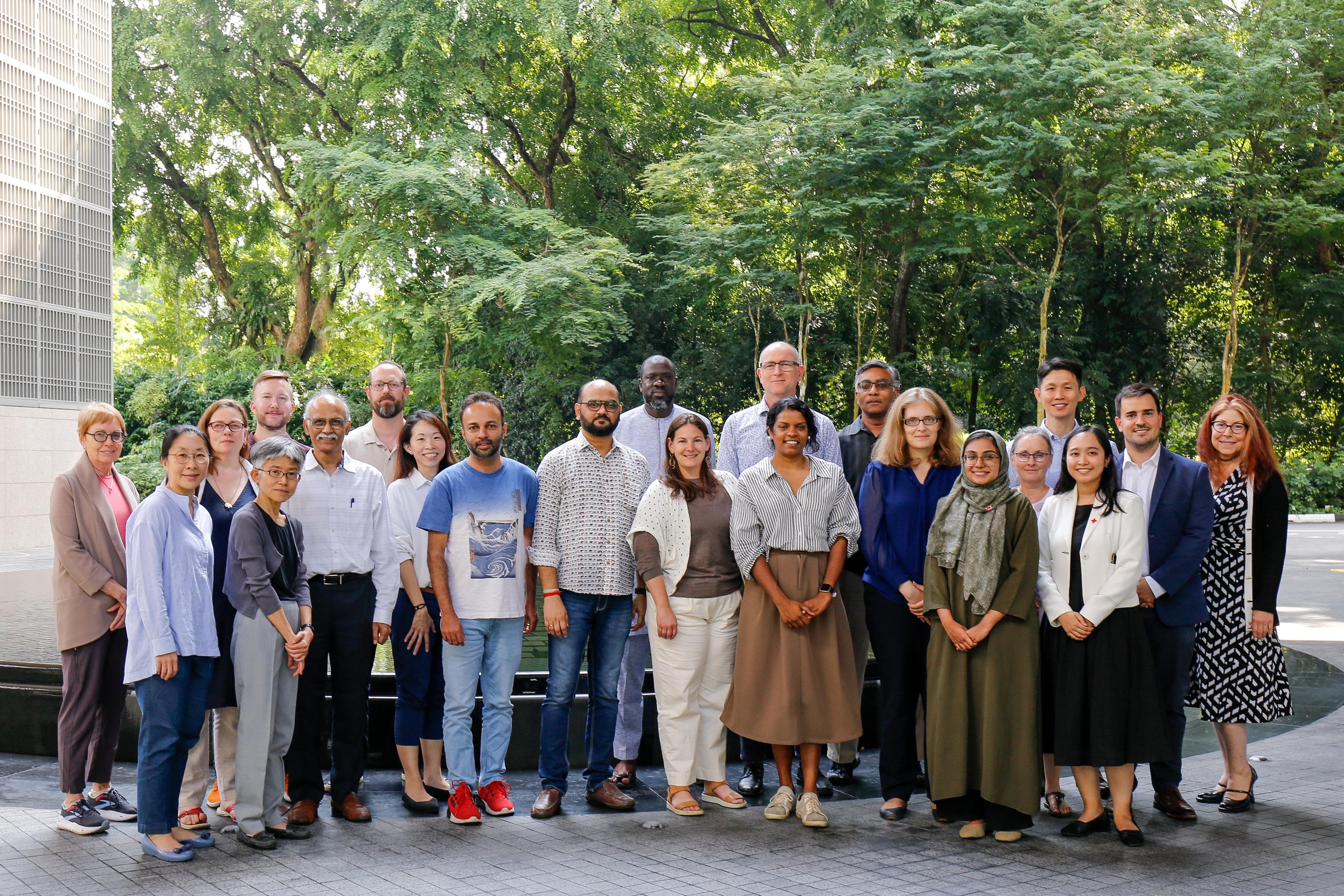 |
|
| E&HRU team attends the pre-conference workshop for the 16th International Conference on Mercury as a Global Pollutant (ICMGP) | |
|
Environmental health concerns are on the rise, more so considering exposure to various toxic substances such as arsenic, lead and mercury – because of potentially harmful human practices. Therefore, environmental health professionals and other stakeholders must work together frequently to make sure that they are aware of the latest environmental health trends. They also need to be able to find solutions to problems that can come about due to various environmental health impacts that vulnerable communities could face. The 16th International Conference on Mercury as a Global Pollutant (ICMGP) is such a platform to come together and share ideas, that occurred from 21-26 July 2024 at the Cape Town International Convention Centre. An overall aim of the conference was to address challenges of mercury as a metal that pollutes the environment worldwide. Sessions included workshops on exploring case studies related to finding solutions – and also speaking to the Minamata Convention and biomonitoring. The E&HRU team attended the pre-conference workshop (on 21 July) and is hopeful to continue mercury research related to projects undertaken within its Persistent Toxic Substance Research Programme 
|
|
| Professor Caradee Wright attends the WITS RHI climate change and health stakeholder engagement meeting | |
|
Amid Mandela Day celebrations on 18 July, Professor Caradee Wright and various interested groups attended a stakeholders’ workshop on climate change and health at the Southern Sun Hotel in Pretoria – hosted by the Wits Reproductive and HIV Institute (RHI). Initial findings from the High Horizons and Heat Adaptation for Pregnant women and Infants (HAPI) research studies were discussed during the meeting. Attendees actively offered insights and suggestions to approach adaptation and mitigation interventions, while simultaneously exploring responsiveness and opportunities available for improving these strategies. Professor Caradee Wright gave a presentation on best practices for adaptation and looks forward to working with Dr Gloria Maimela and her team – specifically on a District Health Barometer chapter on climate change and health in South Africa.
|
|
| The EHRU team pays it forward on Mandela Day: Filling Jars of Hope | |
|
Since the United Nations (UN) declared the late former President Nelson Mandela’s birthday an International Day of celebration in 2009, the 18th of July – now known as Mandela Day – has become recognised globally as a day for acts of service and kindness. The former stateman devoted time to promoting freedom and peace, believing that the South African youth should build on this mission. Traditionally, acts of kindness and service are done – in the true spirit of Ubuntu which is translated as, ‘humanity to others.’ The SAMRC annually commemorates Mandela Day through the distribution of a ‘Jar of Hope.’ This, ‘Jar of Hope’ is a mixture of nutritious staple foods such as rice, soup mix and lentils that can provide a much-needed hearty meal for the less fortunate. Participating in staff activities such as these is a wonderful way to give back to the community and further strengthens the SAMRC’s commitment to institutional values such as partnering – and more specifically – respect and citizenship. The EHRU team did exactly this alongside other SAMRC research units on 15 July, in preparation for distribution on Mandela Day this year. 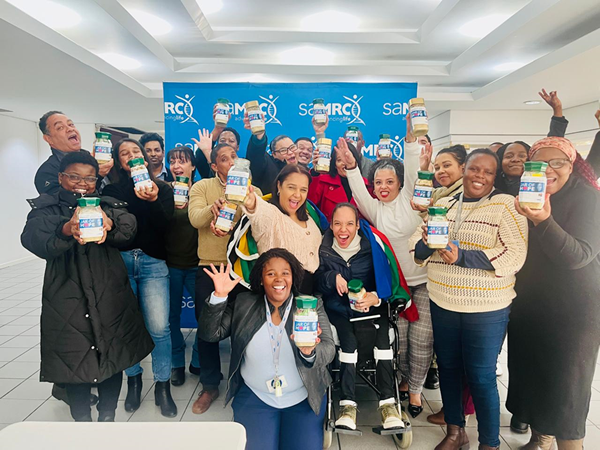
|
|
| Mr Sizwe Nkambule attended the RRIP Research Symposium and launch on 27-28 June 2024 | |
|
The Environment and Health Research Unit (E&HRU) does much work on issues relating to wastewater surveillance as well as sanitation – more broadly – and other topics, through the Water, Sanitation and Society Research Programme (WSSRP). Building on related work, Mr Sizwe Nkambule attended the RRIP Research Symposium and launch on 27-28 June which was hosted by the Future Water Research Institute – at the University of Cape Town (UCT). This programme seeks to encourage technological innovation and understanding people’s relations, wants and needs regarding water. The launch and symposium were used as a platform to showcase the long-term programme plan, share progress over the first 18 months of the project, and present ongoing student research. Mr Nkambule gave an oral presentation regarding the work he wishes to undertake in his PhD study (supervised by a PI at the Future Water Research Institute), as well as participating in interactive breakaway sessions to discuss potential research activities linked to the programme’s work streams. There was also an opportunity for Mr Sizwe Nkambule to have discussions with other members of the Institute about how the PhD study could offer insight into their work and vice versa. |
|
| Dr Tracey Laban and Mr Ngwako Kwatala attend the groundWork Air Quality and Health Workshop on 19 June 2024 | |
|
Dr Tracey Laban and Mr Ngwako Kwatala attended the Air Quality and Health Workshop organised by groundWork and hosted by Vukani Environmental Movement on 19 June 2024 in Kwaquga township, eMalahleni. These non-governmental organisations focus their work on addressing environmental issues in South Africa and requested the SAMRC to present on specific research done in the Highveld making the link between air quality and health. Dr Laban presented on several ambient and household air pollution studies completed and shared some best practices and lessons learned for health professionals to consider air quality and air-related health impacts among the communities living in the areas they manage. Mr Kwatala gave a demonstration of how low-cost sensors work and their importance for science particularly in resource-restricted settings. Besides this being part of our efforts as researchers in knowledge mobilisation and awareness raising, it afforded the opportunity to suggest and seek reasonable solutions, or even co-create with communities, since not all communities have the resources or agency to reduce air pollution sources.
|
|
| E&HRU team hosts Cape Town learners during the third instalment of the SAMRC Generation Science (Gen S) Job-Shadowing Programme | |
|
On 18-21 June 2024, the SAMRC welcomed learners from grades 11-12 – all hailing from local schools here in the Mother City. The initiative seeks to afford youths interested in pursuing careers in medical health research and other related fields, an opportunity to gain firsthand experiences into daily operations of institutions such as the SAMRC. Stakeholders such as Stellenbosch University (SU), the Centre for Epidemic Response and Innovation (CERI), the Western Cape Education Department (WCED) and SAMRC research units and platforms partnered together to bring about the third instalment during Youth Month this year. Months of planning went into achieving the programme, as well as teamwork and a drive to make an impact in the lives of the South African youth. The E&HRU team presented the groups of learners with a comprehensive programme of activities, demonstrating the work undertaken by the unit in thought-provoking, yet interactive manner. May these initiatives and others inspire every SAMRC employee to continue doing excellent and impactful work.
|
|
| Dr Thandi Kapwata participates in the Cape Town Urban Heat Seminar | |
|
Dr Thandi Kapwata attended the Cape Town Urban Heat Seminar organised by the World Bank’s City Resilience Program. The seminar was hosted in partnership with the City of Cape Town and the National Treasury Cities Support Programme, with support from the Swiss State Secretariat for Economic Affairs (SECO) on 13 June 2024. This event brought together policy makers, civil society organisations and academics to discuss the extent of heat exposure in the city. Associated health risks, implications of this exposure for city strategies, and solutions and suggestions for heat adaptation and mitigation were also discussed. Dr Kapwata presented during the Heat Early Warning Framework seminar session. The talk was titled “How can heat-health thresholds be integrated into Heat-Health Early Warning Systems?” It is hoped that there will be opportunities for further collaboration and strengthening of existing research done within the Climate and Human Health Research Programme – which is housed within the Environment and Health Research Unit (E&HRU). |
|
| SAMRC HABVIA fieldwork team conducts roof inspections and residential surveys to combat heat-health effects | |
|
The SAMRC Health Adaptation Benefits for Vulnerable Groups in Africa (HABVIA) fieldwork team conducted roof inspections and residential surveys from 8-12 July 2024. Roof inspections and residence surveys are crucial for heat-related research as they provide valuable data and insights on various factors influencing heat dynamics in residential areas. Extreme heat has a significant impact on the health of human beings and can affect their productivity. The selected cohort was interviewed to have an idea of the dwelling their live in and how these absorb or reflect heat during hot seasons. Rooves were inspected to determine if they can be painted or not. Any damages or maintenance required is also considered during inspections. Where necessary, reflective paints will be used as an initial intervention of the selected cohort. The intervention is believed to significantly reduce and improve the health and sleep quality of the occupants, among other factors.
|
|
| Professor Caradee Wright participates in the Sustainability Research Innovation Congress 2024 conference | |
|
The Sustainability Research Innovation Congress 2024 conference was held in Helsinki, Finland and hosted by Aalto University, University of Helsinki, Belmont Forum and Future Earth – on 10-14 June. This conference aimed to bring together experts in sustainable science from across the world. It also fostered interaction with a larger audience and collaborating and networking with various attendees and stakeholders. The conference also gave those in attendance access to grant opportunities. These opportunities are pivotal to grow valuable bodies of research that, in turn, need to be appropriately repackaged in a manner that would assist people on the ground. This is also referred to as research translation or translating research into action. Conference participants also developed skills of a transdisciplinary nature. The E&HRU’s Professor Caradee Wright presented at a session hosted by the InterAcademy Partnership and Save the Children. During the session, a book of global climate change case studies was also launched. Professor Wright believes that collaboration will ensue, therefore also growing current project work. Weaving two rows of the climate change and health carpet also provided great enjoyment.
|
|
| Fostering improved health and collegial socialization on the field: Reflections by Mr Hanyani Lebese of the E&HRU | |
|
Soccer induces physical exercise which can lead to the mental health and wellbeing of any individual. As a young boy and throughout my life, playing soccer has brought me great joy. Before my entry into the corporate world, I used soccer as a method to regulate my body and exercise. Even as a shy person, through soccer, I made friends growing up and at university. When soccer was introduced at the SAMRC, I felt very happy and excited to be part of the team. It always feels good to play soccer and practice, as it keeps me active and happy. I think that soccer is not just a physical game; it also involves significant mental and emotional aspects. It demands a high level of physical fitness, including cardiovascular endurance, strength, agility, and flexibility. Soccer also fosters mental resilience, emotional wellbeing, and gears you towards an optimal performance mindset. I love soccer because I can keep fit, relieve stress, improve my overall health and socialize with colleagues – apart from doing pivotal work relating to environmental research, wastewater-based epidemiology and citizen science at the SAMRC, as well as the community.
|
|
| SAMRC hosts Bryant University students | |
|
The South African Medical Research Council‘s (SAMRC) Environment and Health Research Unit (E&HRU) hosted students from Bryant University (Rhode Island, USA) at the SAMRC Conference Centre on the 24th of May 2024, which aimed to provide the students with an overview of health challenges in South Africa (SA). Students were joined by faculty members Professor Stephanie Mott, and Professor Alex Perullo. The agenda consisted of presentations from E&HRU, Burden of Disease Research Unit (BODRU) and Biomedical Research and Innovation Platform (BRIP). E&HRU’s Ms Candice Webster gave a detailed breakdown of the structure and function of the SAMRC. Dr Nomfundo Mahlangeni provided an overview of projects in E&HRU. Deputy director of BODRU, Dr Makandwe Nyirenda, presented on the research undertaken by the unit and highlighted the challenges with health data in the country. Professor Carmen Pheiffer and Professor Rabia Johnson, interim co-directors of BRIP, highlighted the platform’s innovative research, including work on obesity, diabetes, and tissue culture in SA. The guests also toured the BRIP state-of-the-art laboratories. This exchange provided students with an opportunity to link what they’ve learnt in class on Global Health Challenges to real-world examples and how those challenges are being addressed. 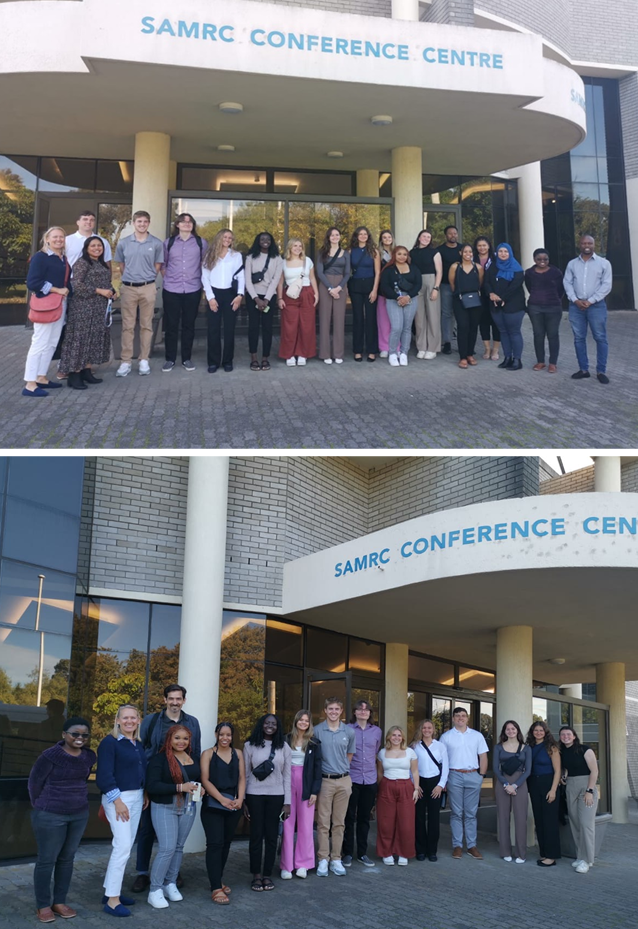 |
|
| E&HRU team attends HABVIA project team meeting in Ghana | |
|
The Health Adaptation Benefits for Vulnerable Groups in Africa (HABVIA) project team meeting took place in Ghana on the 13th of May 2024 to 17th of May 2024 and was held at the University of Ghana in Accra (13 to 15 May 2024) and Kwame Nkrumah University of Science and Technology in Kumasi (16 to 17 May 2024). Dr Thandi Kapwata (co-investigator), Dr Nomfundo Mahlangeni (collaborator) and Mr Dineo Hlagala (project coordinator) of the SAMRC’s E&HRU team attended the meeting as the research team responsible for the study site in Mphego, Thohoyandou in Limpopo province. Agenda items included feedback on research progress at the four study sites (Ga Mashe, Accra; Nkwantakese outside Kumasi; Site B in Khayelitsha, Cape Town and Mphego, Thohoyandou). The team also discussed and planned project activities for the coming year as well as future studies. Dr Nomfundo Mahlangeni and Mr Dineo Hlagala gave an update of the fieldwork activities, challenges, and opportunities. Dr Thandi Kapwata led the session on the Knowledge Products work package and co-led a session on data-capturing software REDCap. The project team also visited the study sites in Ga Mashe and Nkwantakese and interacted with study participants and local communities. 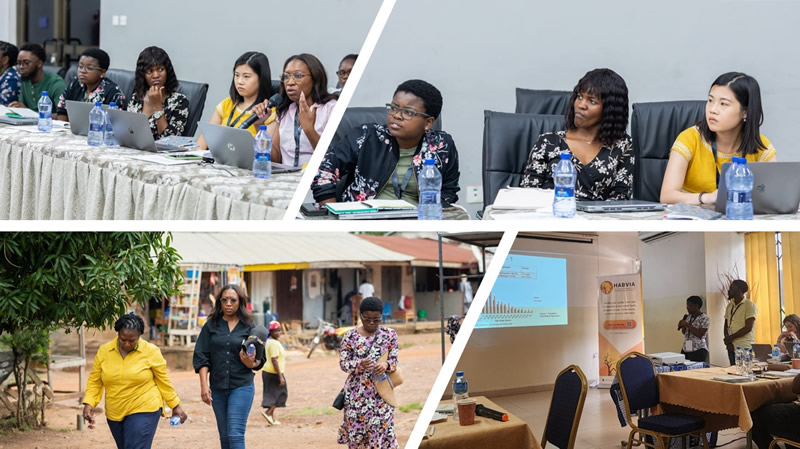 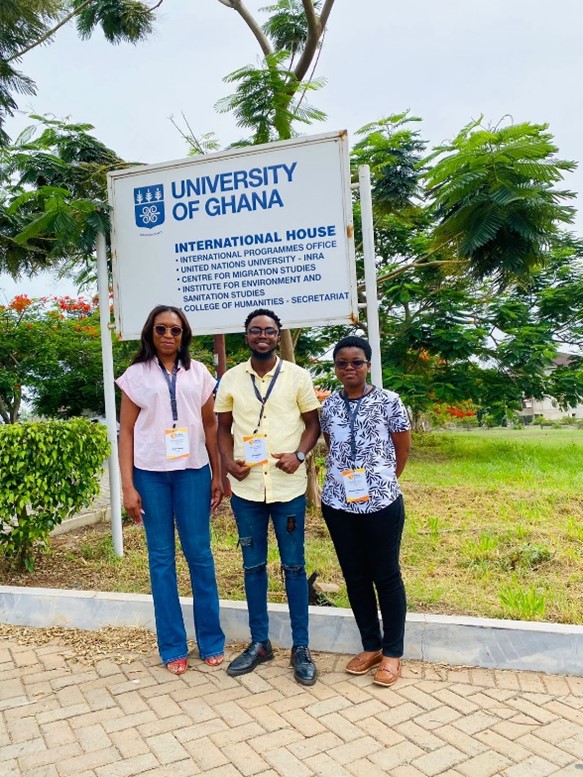 |
|
| Professor Caradee Wright attends in-person WHO-TAG meeting on Embedding Ethics in Health and Climate Change Policy | |
|
As a member of the World Health Organization’s Technical Advisory Group, Professor Caradee Wright attended the first in-person meeting on Embedding Ethics in Health and Climate Change Policy. It was held from 6-7 May 2024 at the Brocher Foundation in Hermanz, Switzerland. This meeting was hosted by the World Health Organization and the Brocher Foundation. Considerations of the rights and responsibilities held by various stakeholders in ethical decision-making were noted. Members further advised the Secretariat on the development of evidence gathering methodologies – referencing case studies designed to identify the practical ethical challenges arising for health and research stakeholders responding to climate change – while also drafting supporting tools and similar mechanisms which support inclusion of ethical considerations in policy and decision making relating to climate change and health. Reviewing and recommendations on the final tools, frameworks and dissemination strategies also formed part of the technical advisory group’s deliberations. Members of the Technical Advisory Committee will continue collaborating on identifying ethical issues in tools, strategies and policies related to climate change and health. Professor Wright valued the opportunity to address potential ethical issues in her case studies, simultaneously appreciating Brocher Foundation’s picturesque views. 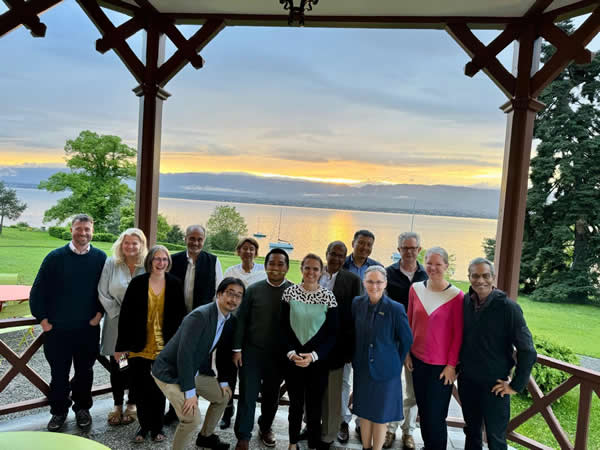  |
|
| E&HRU hosts NIEHS’ Professor Gwen Collman | |
|
On 6 May, the Environment and Health Research Unit (E&HRU) team in Cape Town had the privilege of hosting Professor Gwen Collman from the National Institute of Environmental Health Sciences (NIEHS), USA. A meeting was arranged to delve into environmental health research conducted at each institution – with a key focus on climate change and health. The session included an overview of the E&HRU work presented by Dr. Renee Street, the Unit Director. Following this, Dr Nomfundo Mahlangeni highlighted projects undertaken by the E&HRU Climate Change and Health Research Programme – led by Professor Caradee Wright. Professor Collman then shared insights with the team on the work of NIEHS and their research priority areas. These presentations served as a pivotal moment for the group to engage in discussions about ongoing research and future opportunities, with a particular focus on community engagement and the impacts of climate change on health. 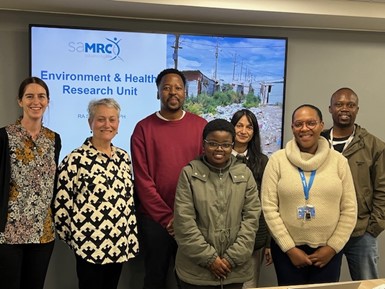
|
|
| Dr Renée Street attends the INGSA2024 conference in Kigali | |
|
Dr Renée Street recently attended the INGSA2024 conference, organized by the International Network for Governmental Science Advice. The conference, themed "The Transformation Imperative," tackled the pressing need for robust knowledge in policy-making in our post-Covid, climate-shifted, and digitally evolving world. Dr Street noted the significance of this event, attracting participants from various sectors including academia, policymaking, diplomacy, and the private sector. The conference aimed to address the complexities accompanying the imperative for robust knowledge in policy-making by focusing on emerging theories and evolving practices of inclusion and diversity in science advice provided to governments. Dr Street found the discussions particularly insightful, as they delved into questions surrounding the development, objectives, and reception of a more interconnected and inclusive approach to science advice. Dr Street’s leadership position underscores dedication to advancing science advice across the African continent and highlights INGSA’s commitment to fostering collaboration and inclusivity within the field, remaining relevant and impactful in addressing the region's unique challenges and opportunities. Overall, Dr Street found the INGSA2024 conference to be a valuable platform for exchanging ideas and fostering collaboration among stakeholders from diverse backgrounds, ultimately contributing to more effective and inclusive science advice for governments.  |
|
| Professor Caradee Wright participates in the HEI & GHOC 2024 committee and annual conference meetings | |
|
Committee members of the Health Effects Institute met on 27-30 April 2024 in Philadelphia to discuss HEI activities and the annual conference, which covered a range of topics – hosted by the HEI. Professor Caradee Wright participated in the Global Health Oversight Committee meeting, as well as the East Africa air pollution and health meeting. Through the work with East Africa and air pollution and health, Professor Wright is hopeful that future collaborations will ensue that complement the work done by the E&HRU – within its Climate Change and Human Health Research Programme. Professor Wright was also impressed by the excellent, young scientists in attendance at the conference. 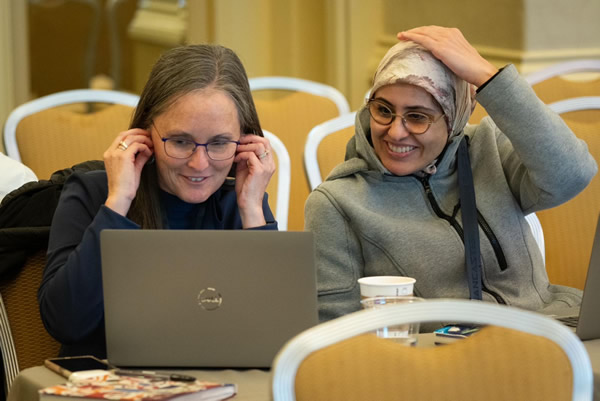
|
|
| Professor Caradee Wright attends the National Institutes of Health Scholars 2024 climate and health meeting | |
|
The National Institutes of Health (NIH) Climate Change and Health Scholars – class of 2024 – attended the first in-person meeting on climate and health in Bethesda, Maryland, USA on 26 April. Members of the NIH Climate Change and Health Initiative (CCH) were also present at the meeting, which provided an opportunity for Scholars, NIH CCH Working Group members and other NIH staff to meet each other and to share ideas. The event – hosted by the NIH – also facilitated multidisciplinary interactions in relation to the Scholars’ areas of expertise and science topics within the NIH mission, which sparked a synergistic approach to identify priorities, gaps, and challenges in climate change and health issues related to the CCH Framework strategic plan. Attendees participated in presentations and group discussions. Professor Caradee Wright is hopeful that the meeting will lead to collaborations in future between Scholars and is currently working on preparing a scoping review and developing a framework as part of her Scholar’s work. Excellent science being done in climate change and health research stood out to Professor Wright and serves as a motivation to continue producing similar work of a high standard. 
|
|
| Dr Renée Street pioneers Global Wastewater Surveillance research | |
|
Dr Renée Street has been named by the Rockefeller Foundation as one of four women pioneering advancements in global wastewater surveillance. As climate change alters global disease patterns and triggers cross-species viral transmissions, wastewater epidemiology has emerged as a critical tool in the public health field. During the COVID-19 pandemic, Dr Street and her team navigated the challenges of sample collection and analysis, so that public health officials could get usable and reliable results on a weekly basis. The SAMRC Wastewater Surveillance and Research Programme is a collaboration between the E&HRU, Biomedical Research Innovation Platform (BRIP) and Genomics Platform. Lab technicians from historically disadvantaged institutions were also trained in sampling and analysis methods. After a cholera outbreak hit the country in May 2023, the research focus shifted to being able to detect it. This year the team pivoted again, which led to introducing a multi-pathogen panel that looks at 24 different pathogens – worsening due to climate change. “Tracking pathogens through wastewater surveillance is about staying ahead of outbreaks to protect communities from public health threats.” Read more | HERE |
|
| Exploring microbial risk assessment: Dr Renée Street participates in the FAO workshop | |
|
The Food and Agriculture Organization (FAO) convened a workshop focused on microbial risk assessment from 16-18 April, in Cape Town. Key experts and stakeholders were brought together. Guided by the FOA’s expertise, the workshop provided a platform for intensive discussion and knowledge exchange. Dr Renée Street’s participation was marked by her insightful contributions and unwavering commitment to advancing knowledge in microbial risk assessment – particularly under a One Health Framework. From exploring the fundamentals of risk analysis to exploring latest advancements in the risk assessment methodologies, participants gained invaluable insights into safeguarding food systems from microbial hazards. The workshop also fostered an environment of collaboration and shared learning. Attendees, representing diverse sectors and regions, brought their unique perspectives to the table, enriching discussions and contributing to a comprehensive understanding of the challenges and opportunities in microbial risk assessment. |
|
| Dr Tracey Laban attends the Clean Air Fund Stakeholder Engagement Workshop 2024 | |
|
Dr Tracey Laban attended the Clean Air Fund Stakeholder Engagement Workshop on 11 April 2024 in Kempton Park, Gauteng. The Clean Air Fund (CAF) is a philanthropic organisation that works with governments, funders, businesses and campaigners in tackling global air pollution. Its workshop brought together stakeholders in the air quality community to introduce and solicit input on development of CAF’s strategy for South Africa. The strategy focuses on three areas of work: data (putting compelling evidence in the right hands), demand (growing public awareness) and drive (influencing decision-makers to commit to clean air targets). As part of their initial work, CAF presented on the Breathe Cities initiative in the City of Johannesburg in partnership with Bloomberg Philanthropies and C40. One of the activities proposed under Breathe Cities Johannesburg is quantifying the public health impacts of poor air quality in Johannesburg which aligns with the strategic goals of E&HRU, as well as a potential funding source, to do this work. Dr Laban also participated in a panel discussion representing the community, youth, government and research organisations and shared her thoughts on what research institutions needed to do to create greater public awareness on the health impacts of air pollution. 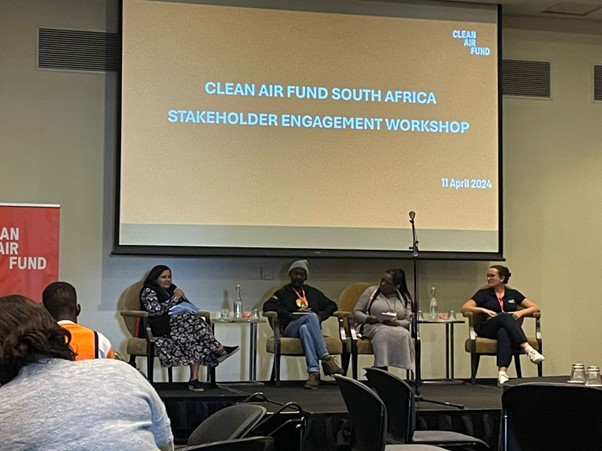
|
|
| Professor Caradee Wright attends the 2024 project kick-off meeting for the African NEETs and depression study | |
|
Youth unemployment is rife in lower-and middle-income countries (LiMiCs) such as South Africa and others – particularly on the African continent. This social ill is compounded by challenges brought about by mental health conditions such as depression. In a concerted effort to address these prevalent social, psychological and environmental challenges, the Not in Education, Employment or Training (NEET) study was born. The first project kick-off meeting was hosted by the University of Pretoria (UP) and occurred from 8-11 April 2024 at the Mongena Lodge, Dinokeng. Project collaborators – which included multiple institutions in South Africa and Nigeria, as well as SADAG (South African Depression and Anxiety Group) and REPSSI (an NGO) – spent time planning for the project; in understanding project aims and objectives, assigning tasks, deciding on deliverables, as well as discussing milestones. The teamwork demonstrated during this planning session was of particular significance to Professor Caradee Wright. Through the work of Professor Wright and her team, the South African Medical Research Council’s (SAMRC) E&HRU will be involved with the project for the next five years. 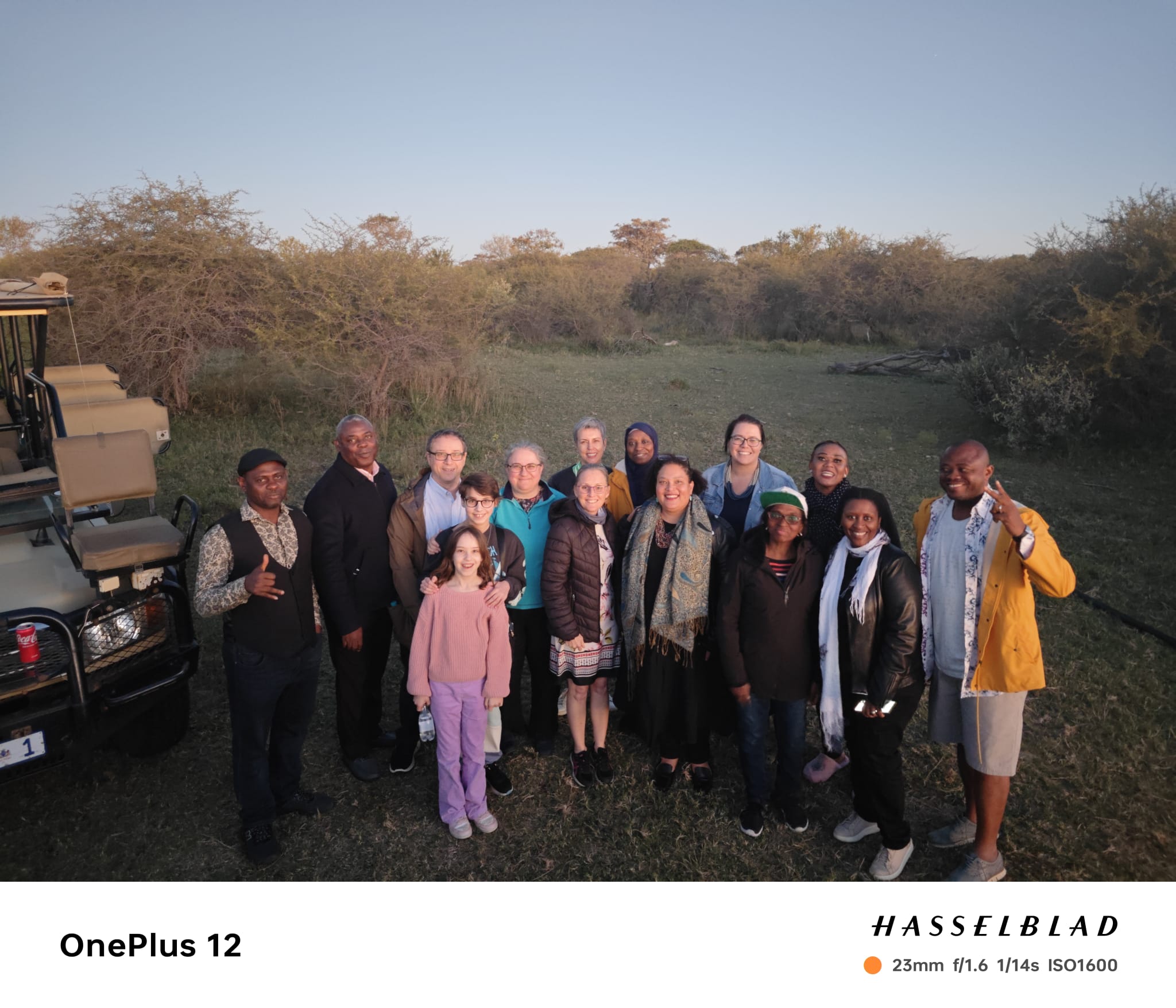 |
|
| Health Adaptation Benefits for Vulnerable Groups in Africa (HABVIA) Study: Fieldwork summary | |
|
The SAMRC E&HRU is one of the collaborators with University of Cape Town (UCT) on the Heat Adaptation Benefits for Vulnerable Groups in Africa (HABVIA) project funded by the Wellcome Trust. HABVIA aims to address evidence gaps by gathering high-quality cohort data on physiological and mental health, alongside climate, environmental, and socio-economic information, in four heat-vulnerable study sites in South Africa and Ghana. The four study sites are in Ga Mashe in Accra, Ghana; Nkwantakese in Kumasi, Ghana; Site B in Khayelitsha in Cape Town, South Africa and Mphego Village in Thohoyandou, South Africa. HABVIA will also build local community awareness raising and capacity for heat adaptation. Dr Thandi Kapwata from the SAMRC’s E&HRU leads the site in Thohoyandou in the Limpopo Province. Research activities commenced in April 2023 and will continue until March 2027. During the first phase of the study, the E&HRU field staff visited households to invite the community members to participate in the study. Once recruitment was completed, a health survey was conducted and health measurements as well as environmental data were collected.
Some of the HABVIA team members at the launch of the project at UCT
HABVIA field team in Mpegho, Thohoyandou |
|
| Dr Renée Street attends GLOWACON launch in Brussels | |
|
Dr Renée Street attended the launch of the Global Consortium for Wastewater and Environmental Surveillance for Public Health. This initiative aims to establish an international system for early detection, prevention, and real-time monitoring of epidemic threats and outbreaks. The inaugural event, held on 19 and 20 March in Brussels, gathered over 300 key collaborators, including organizations such as Bill and Melinda Gates Foundation, the World Health Organization (WHO) and the Africa Centres for Disease Control and Prevention. Both in-person and virtual attendance were features of the event, bringing together diverse representatives from health ministries, NGOs, industry, research institutions and public health bodies. Discussions covered aspects of the consortium, including sampling procedures, testing protocols, data management, capacity building and research and innovation. GLOWACON is well positioned to identify and align funding opportunities for global health surveillance efforts. |
|
| Professor Caradee Wright participates in the Clean Air Fund Board and Grants and Charitable Activities Committee Annual Meeting, in London, UK | |
|
The Clean Air Fund Board and Grants and Charitable Activities Committee Annual Meeting took place from 11-13 March 2024 in London, UK hosted by the Clean Air Fund. Presentations on the Fund’s progress was the order of the event – which doubled up as a workshop. Board members were also given an opportunity to share feedback based on the progress reporting session. Professor Caradee Wright participated in various sessions for brainstorming funding opportunities in air pollution and health, who is hopeful in securing funding from the Clean Air Fund – furthering research on air pollution. In the UK, air pollution has been recorded as a cause of death – therefore, Ms Rosamund Debra-Kissi was invited as a guest speaker at the event, relating what had befallen her daughter. Read more on her story here.  |
|
| Professor Caradee Wright attends the GEOHealth Training Workshop on Air Pollution Exposure Monitoring and Respiratory Health in Nairobi, Kenya | |
|
The training workshop on air pollution exposure monitoring and respiratory health was attended by Professor Caradee Wright in Nairobi, Kenya – from 6-9 March 2024 and hosted by the Eastern Africa GEOHealth Hub. This workshop was held to share progress made by the Hub on research relating to air pollution and respiratory health. Professor Wright presented on the research conducted over nearly a decade – at the South African Medical Research Council (SAMRC) Climate Change and Health Programme – housed within the Environment & Health Research (E&HRU). Postgraduate student engagement made an impression on Professor Caradee Wright, who is hopeful of tapping into the young minds of researchers interested in joining within her team. Read here for further information on the work done by the GEOHealth Hub. 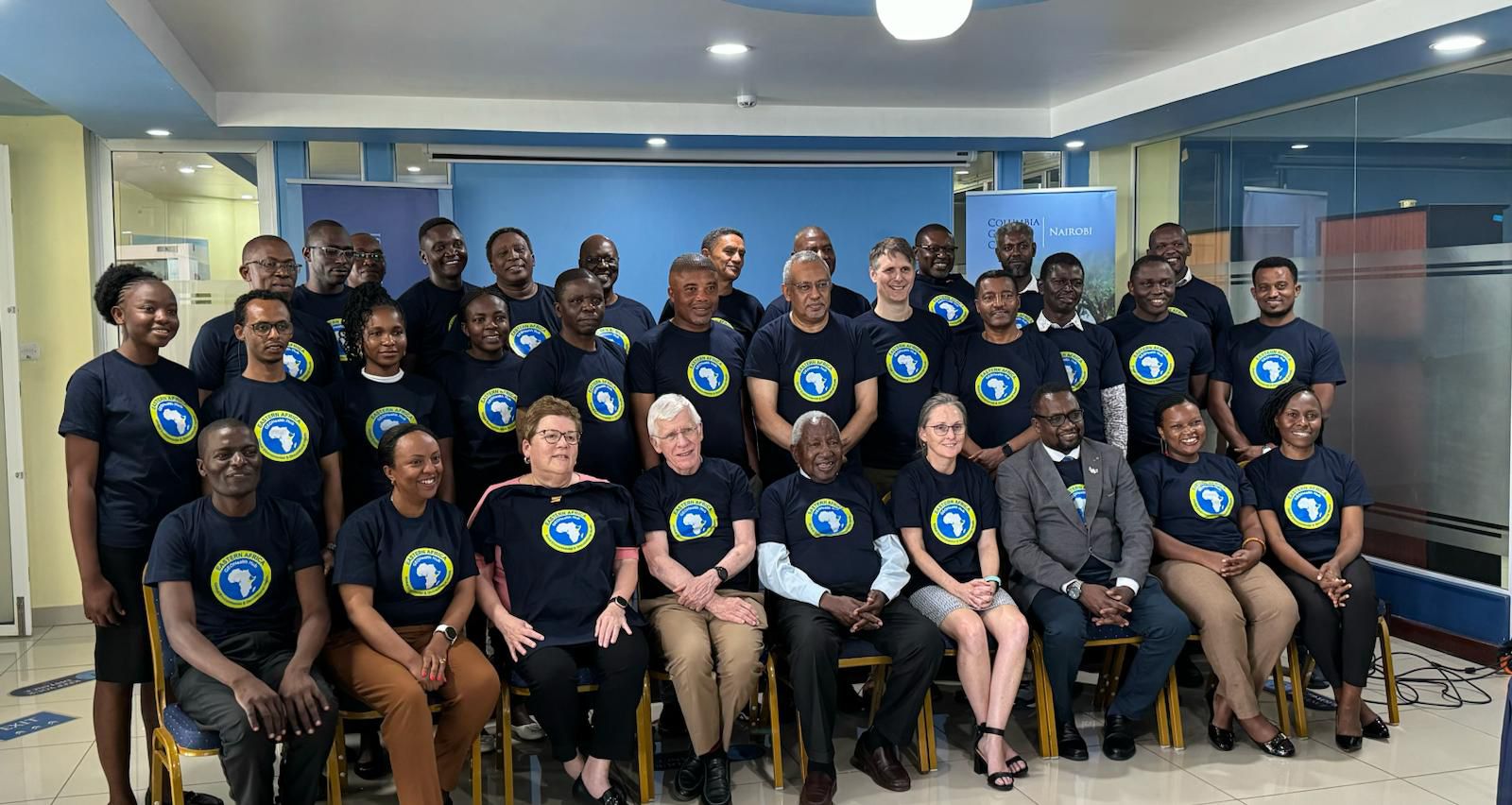 |
|
| Community engagement to provide feedback on the LEAP-Epi project findings | |
|
Dr Tracey Laban represented the SAMRC’s E&HRU at the community feedback sessions in Agincourt (Bushbuckridge) and Chris Hani Baragwanath Hospital (Soweto) from 28 February to 5 March 2024 for the LEAP-Epi project. The aim was to create awareness on health impacts of household air pollution and to share the project findings with the study participants and community advisory board members. Dr Laban gave a presentation on air pollution and its health effects and participated in the question-and-answer sessions regarding levels of air pollution and exposure in homes – engaging with individual community members on their issues of concern. There is no accurate knowledge of exposure to ambient and household air pollution for large numbers of people in urban and rural South Africa. Therefore, this project is quite significant (which is in partnership with University of Leicester, Wits University, North-West University) – as it provides an opportunity to gather much-needed exposure data from low-cost samplers and surveys – that can be linked with health outcomes to improve burden of disease estimates for household air pollution in South Africa. Such data will also have applicability more broadly to sub-Saharan Africa and other low- or middle-income countries – contributing to ongoing research and publications. The project is expected to be finalised at the end of March 2024. 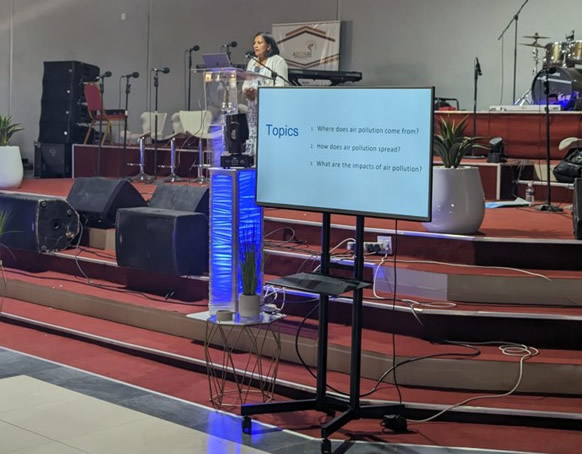
Presentation at Adonai Church, Agincourt Presentation at Chris Hani Baragwanath Hospital, Soweto Explaining the different types of particulate matter and sources of air pollution 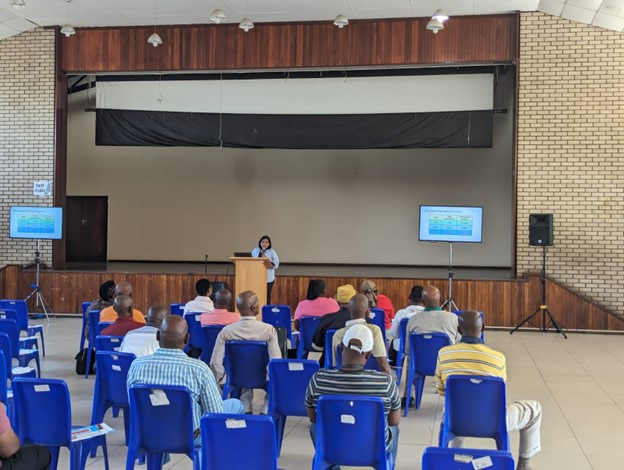 |
|
| E&HRU visits Usinga SAPRIN Node in uMlazi, Durban | |
|
The Environmental & Health Research (E&HRU) team visited the Usinga SAPRIN Node in Durban, on 27th February 2024. The purpose of this event was to learn about the Usinga project's initiatives in the uMlazi community, to showcase SAPRIN's work and explore potential collaboration opportunities, particularly in conducting wastewater surveillance studies in the same area. During the event, the SAPRIN team provided insights into their ongoing work in uMlazi. Following this, the EHRU team joined the fieldwork in uMlazi. This provided an opportunity to meet other team members and observe the condition of the uMlazi River, including nearby activities. This also allowed the EHRU team to identify potential threats to the uMlazi River; although the river may not be used for drinking, it is utilized by children for swimming and domestic purposes like laundry. The importance of community engagement was emphasized throughout the visit, with the Usinga project employing over 60 community members in various roles. This not only builds trust but also demonstrates the community's involvement and support for the project. Witnessing this trust firsthand during interactions with community members further underscored the significance of community engagement in research initiatives. 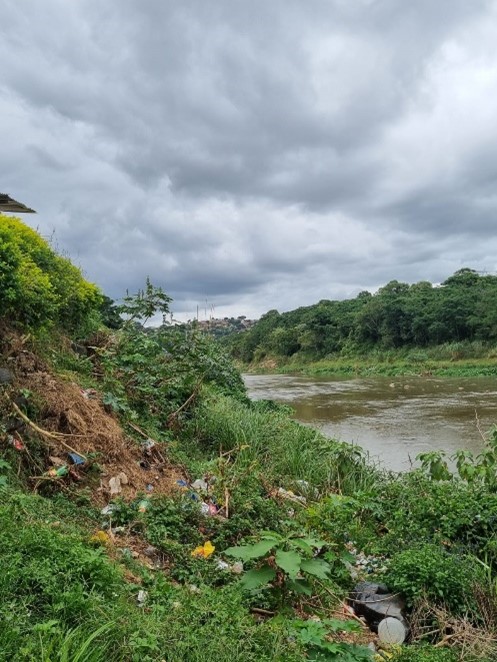 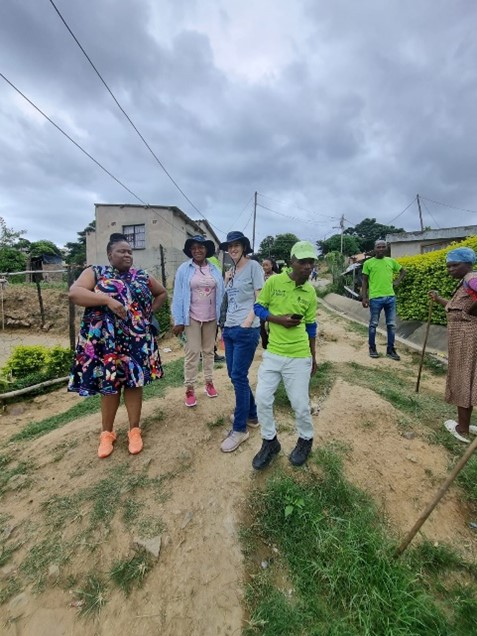 |
|
| Writers retreat, Nairobi 2024 | |
|
Professor Caradee Wright (Chief Specialist Scientist), Dr Thandi Kapwata (Specialist Scientist) and Ms Candice Webster (Scientist) of the Climate Change and Health Research Programme: E&HRU, attended a retreat for the “State of data science in Africa” writing project which took place in Nairobi, Kenya from 26 February to 1 March 2024. This project is supported by the NIH, APHRC and several partner organizations and its aim is to produce a collection of scientific papers describing the state of data science for health in Africa – to be published in the Nature portfolio of journals. The E&HRU team leads two review articles focusing on the application of data science in investigating climate change and air pollution related health challenges in Africa. During the retreat, teams were provided dedicated writing time, opportunities to engage with other teams on overlapping topics and an opportunity to map the way forward to final submission. The E&HRU team is grateful for the opportunity to engage with the other writing teams and the project’s scientific co-chairs and believes its contribution to the collection will provide valuable insight into the importance of data science in environment and health research in Africa. 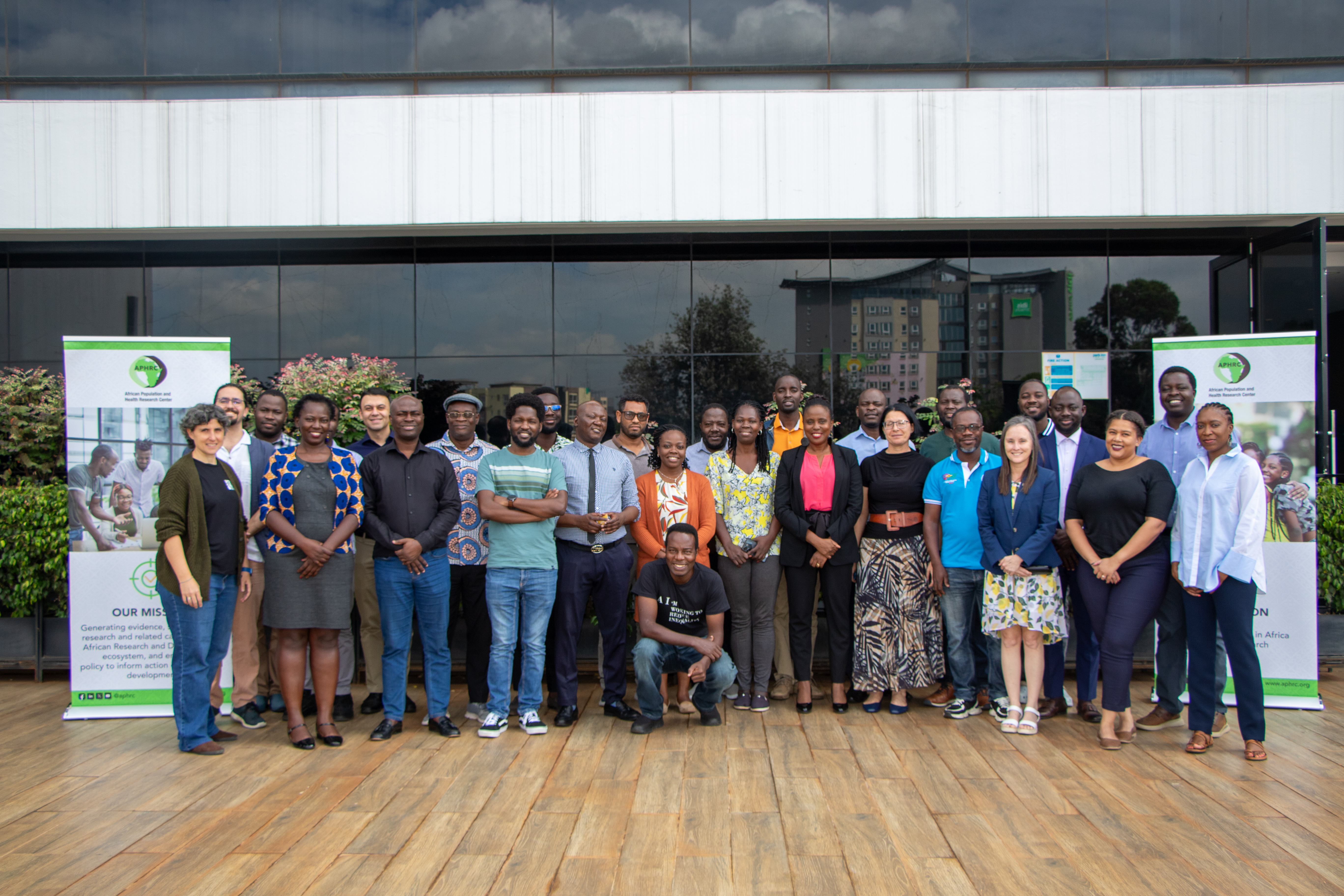 |
|
| E&HRU visits UCT Future Water Hub in Franschhoek | |
|
The Environment and Health Research Unit (E&HRU) visited the abandoned wastewater treatment works (WWTW) plant on 9 February in Franschhoek, hosted by the UCT Future Water team – led by Dr Kevin Winter – who showcased the application of nature-based solutions (NbS) in rehabilitating Stiebeuelrivier. By using biofilters (with vegetation, stones, and biochar) to clean and treat water from contaminated surface water runoff originating from an informal settlement (Langrug) upstream, the researchers demonstrated a tangible approach to environmental remediation. One highlight was the demonstration of the biofiltration systems used in treating the contaminated water. Comparing treated and untreated water for crop irrigation provided a practical illustration of the efficacy of biofiltration systems. inspiring the broader community about the potential of nature-based solutions in water management and environmental conservation. Overall, the event served as a platform for showcasing innovative research, fostering future collaboration and camaraderie. Other projects like the 'Cool' Shack project added further dimensions to the event, showing a holistic approach to addressing environmental and social challenges in informal settlements and raising awareness about the importance of nature-based solutions in environmental remediation and sustainable water management.
|
|
| E&HRU Strategic Planning Meeting for 2024 | |
|
The Environment and Health Research Unit (E&HRU) team recently convened a pivotal strategic planning meeting from 5-8 February 2024, in Noordhoek Cape Town. Each day was planned to provide a blend of introspective reflection and strategic foresight, ensuring each E&HRU team member could contribute to and benefit from the discussions at hand. With a clear strategic plan in place, the E&HRU is equipped to advance their research agenda, aiming to make significant contributions to the field of environmental health. The team left Noordhoek with a collection optimism, ready to embark on a year of meaningful research, impactful collaborations and continued personal and professional growth. 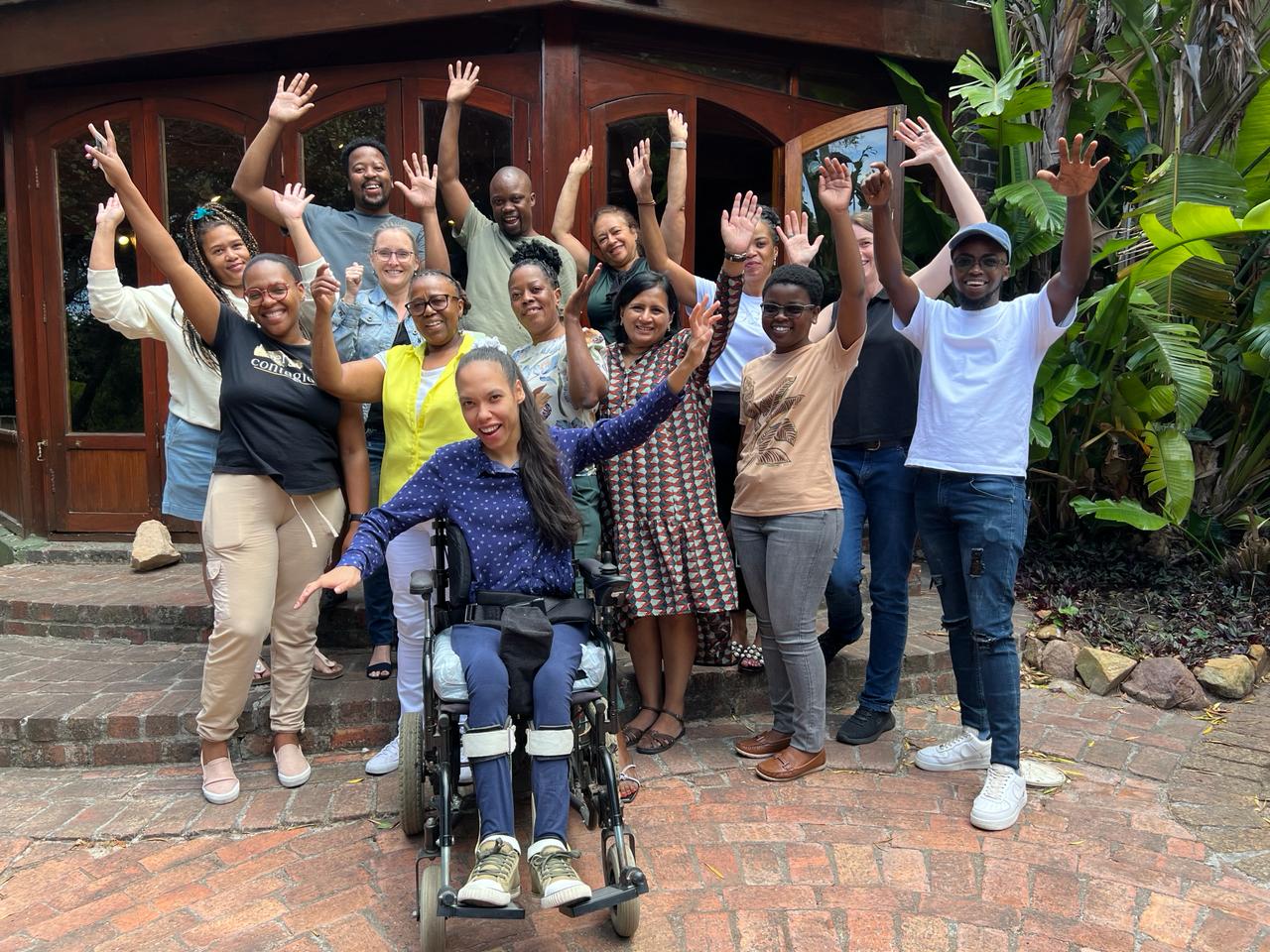
|
|
| Professor Caradee Wright attends the kick-off meeting for the PLANET4HEALTH project in Venice, Italy | |
|
E&HRU chief specialist scientist Professor Caradee Wright attended a kick-off meeting for the PLANET4HEALTH project in Venice Italy between 25-26 January – facilitated by Ca’ Foscari University. The project is funded by a Horizon Europe grant – enabling all teams to meet and present case studies and work packages, for the next four years – as PLANET4HEALTH seeks to make planetary health research understandable to the public and policymakers using the applications and platforms. With such a large but cohesive cohort, Professor Wright is confident that South Africa’s case study on air pollution and health can be used to develop a new tool for its citizens.
|

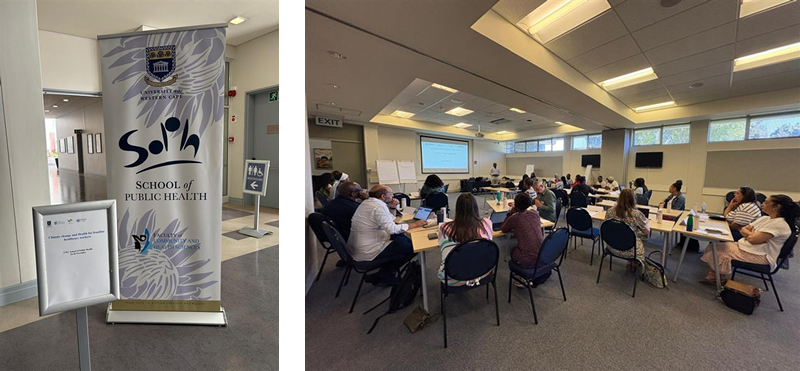

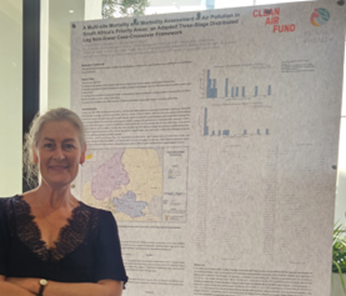
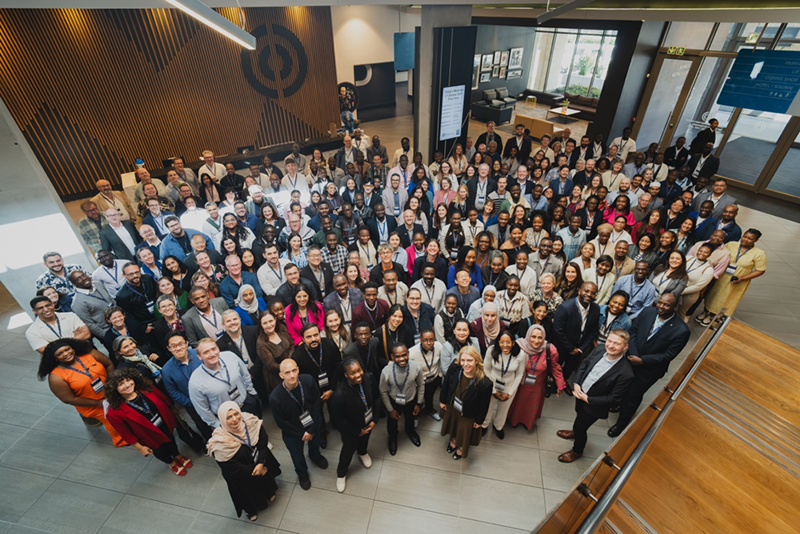

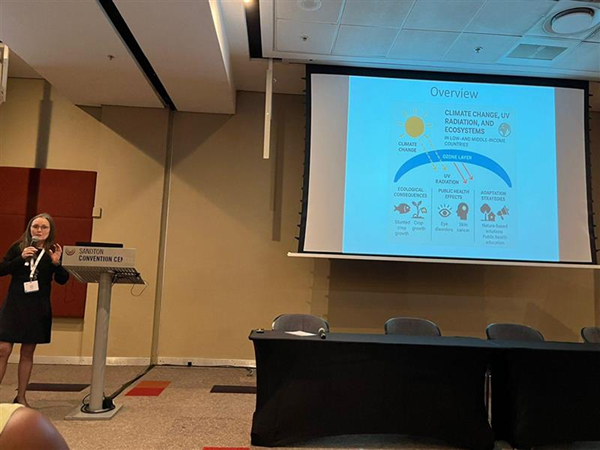

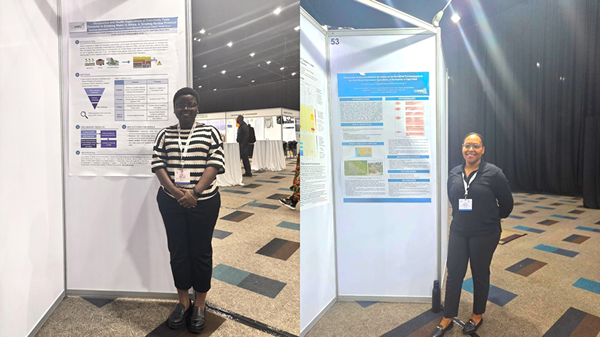
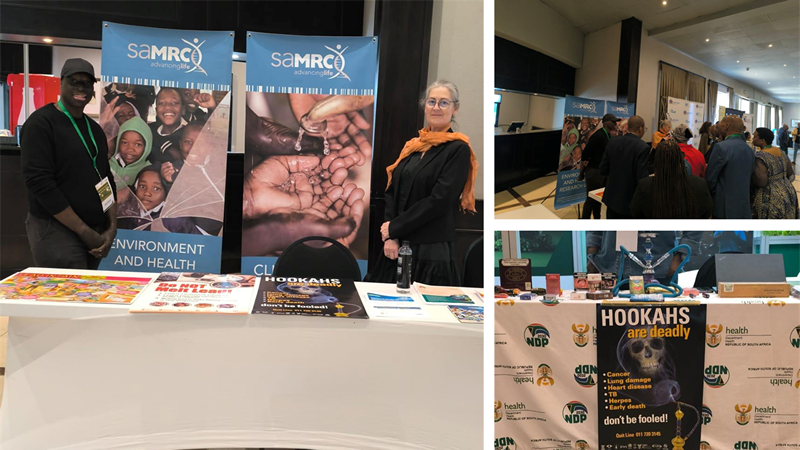
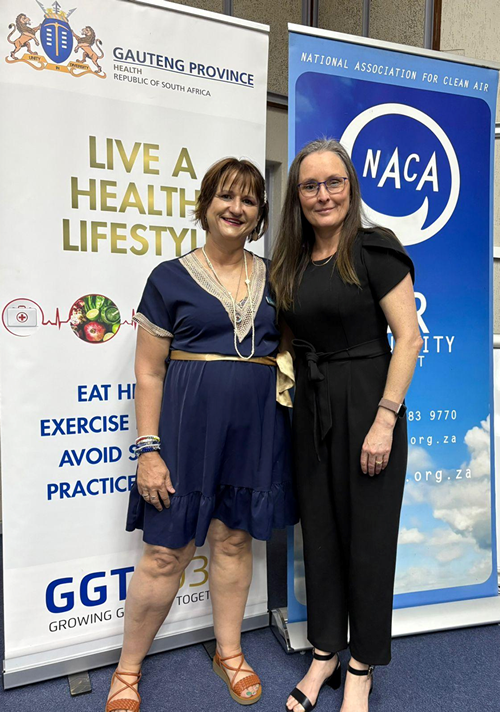
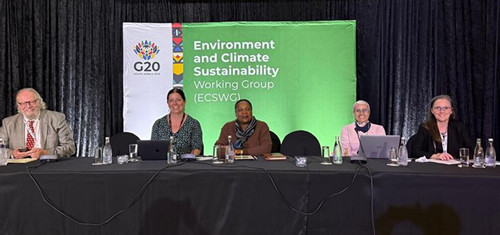
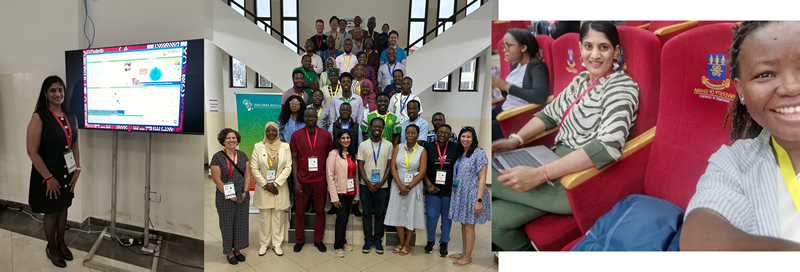

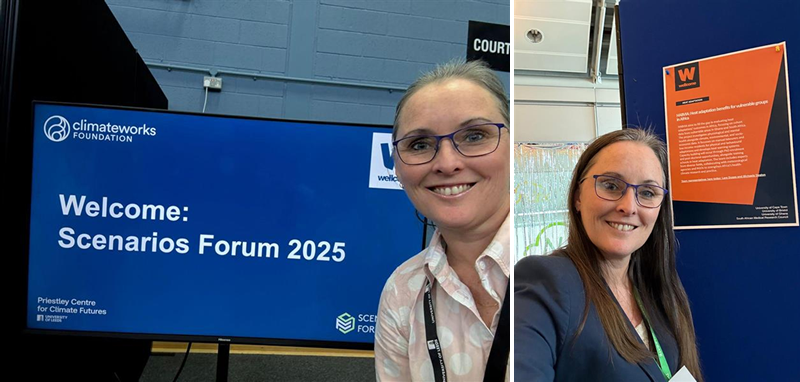

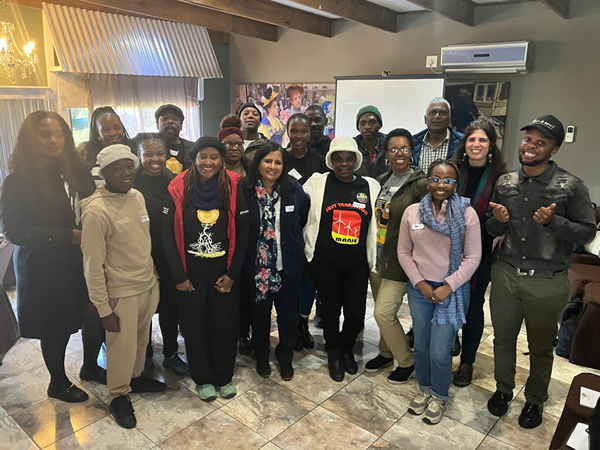
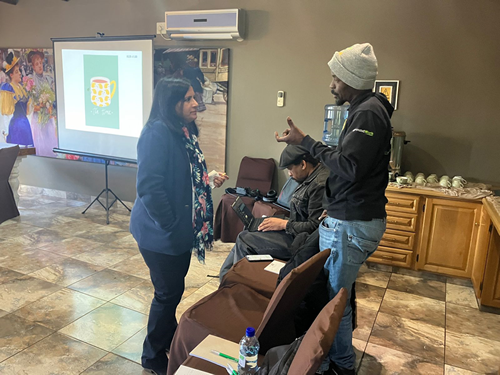
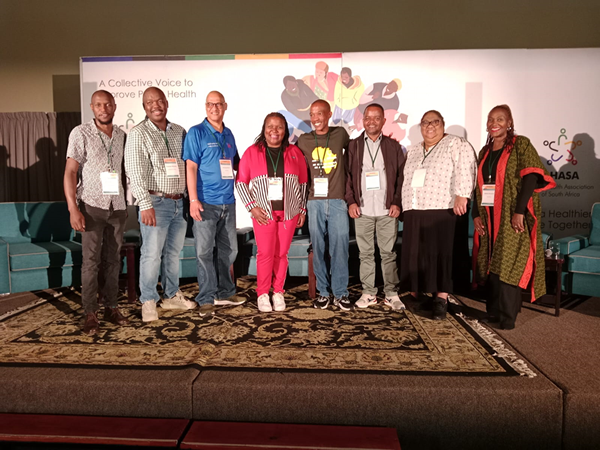
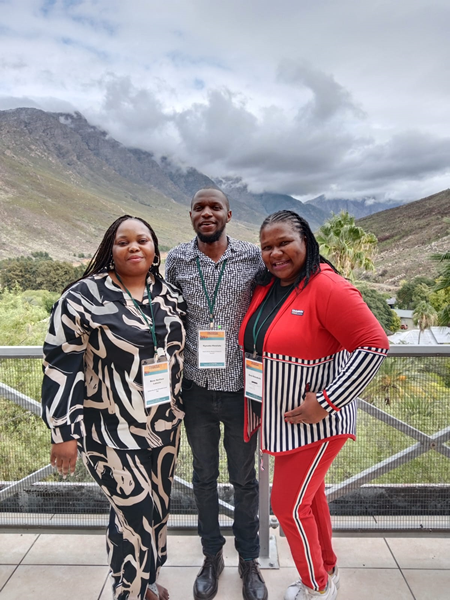
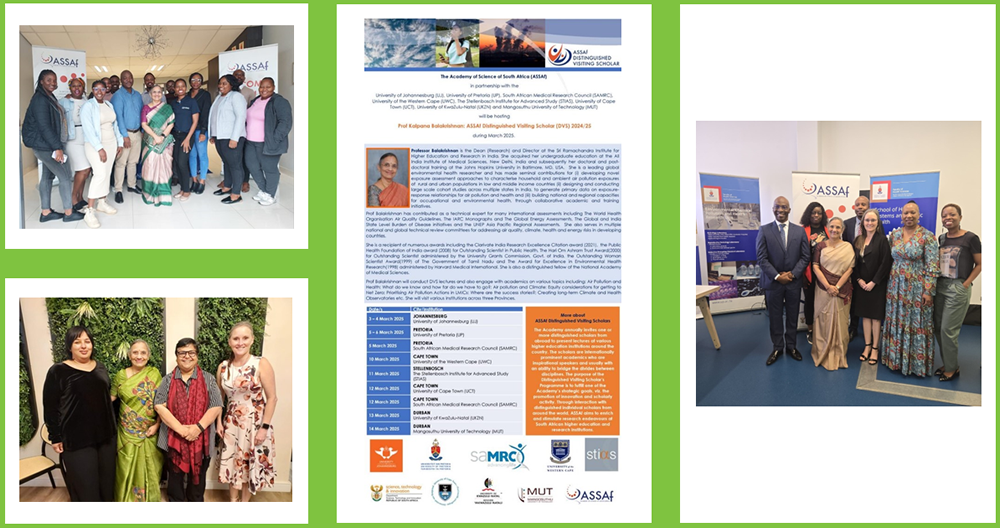

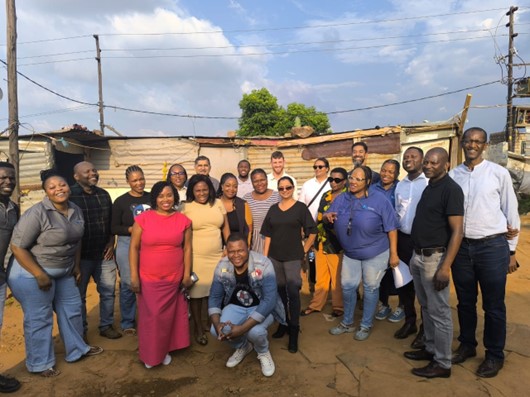
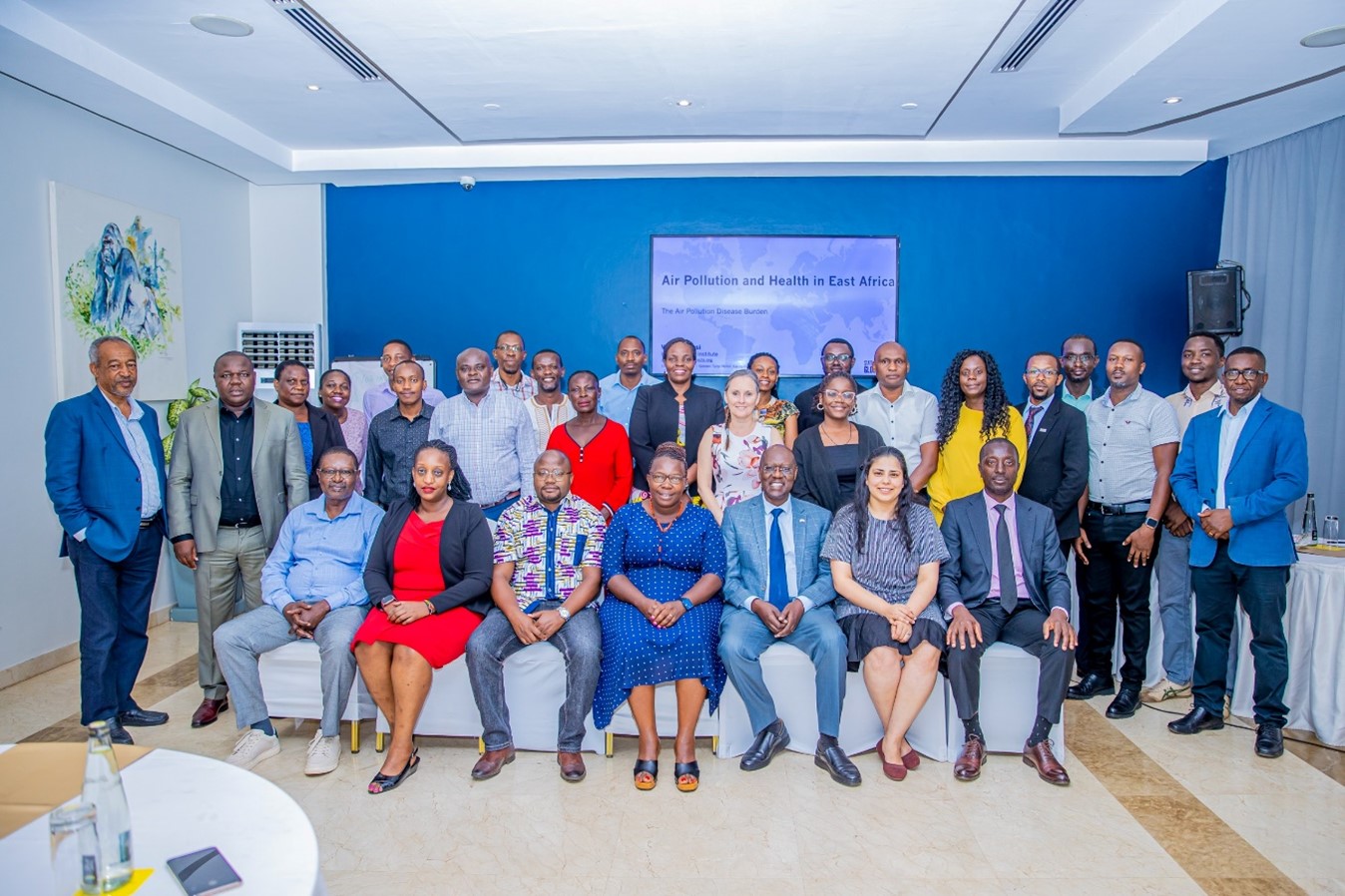
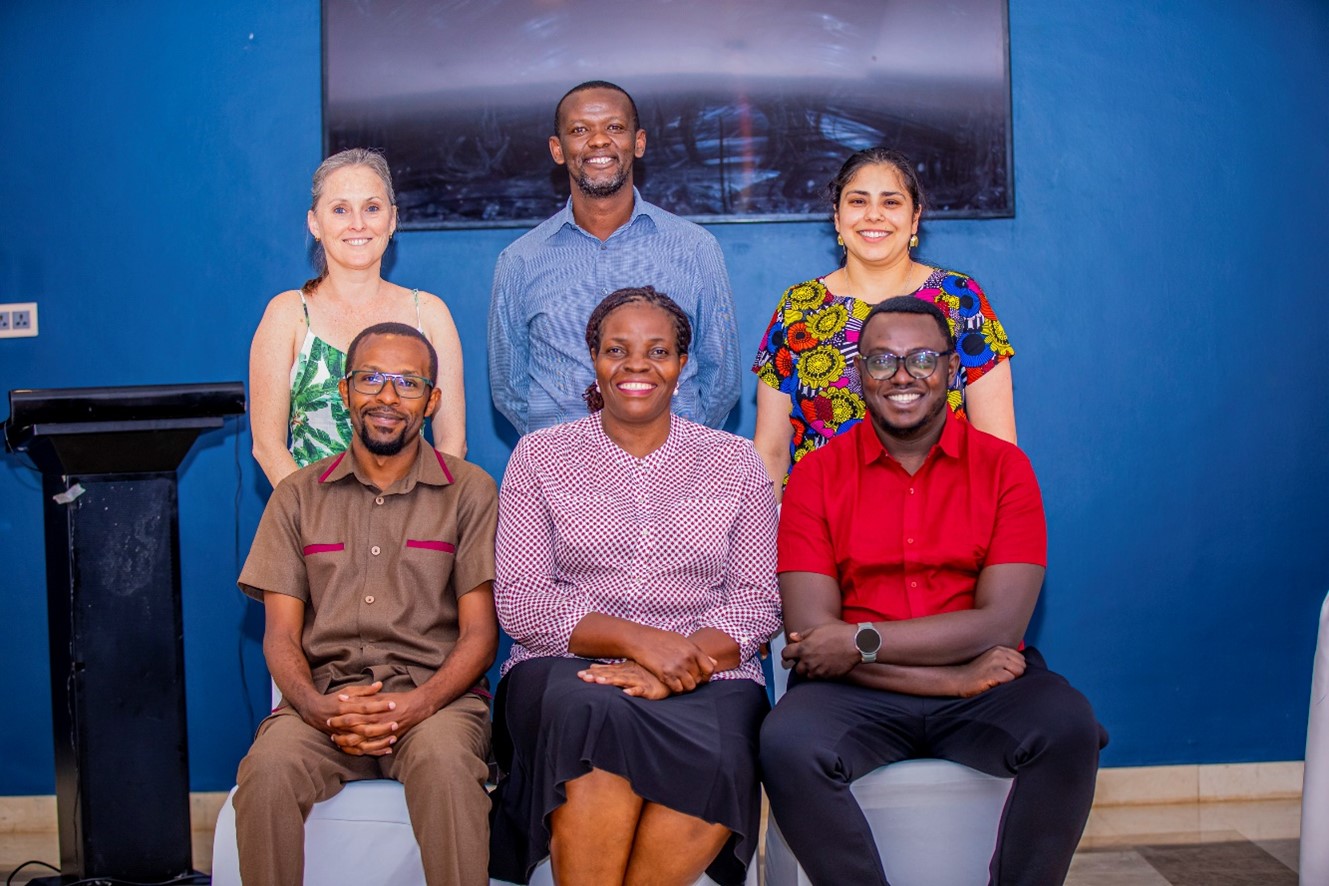
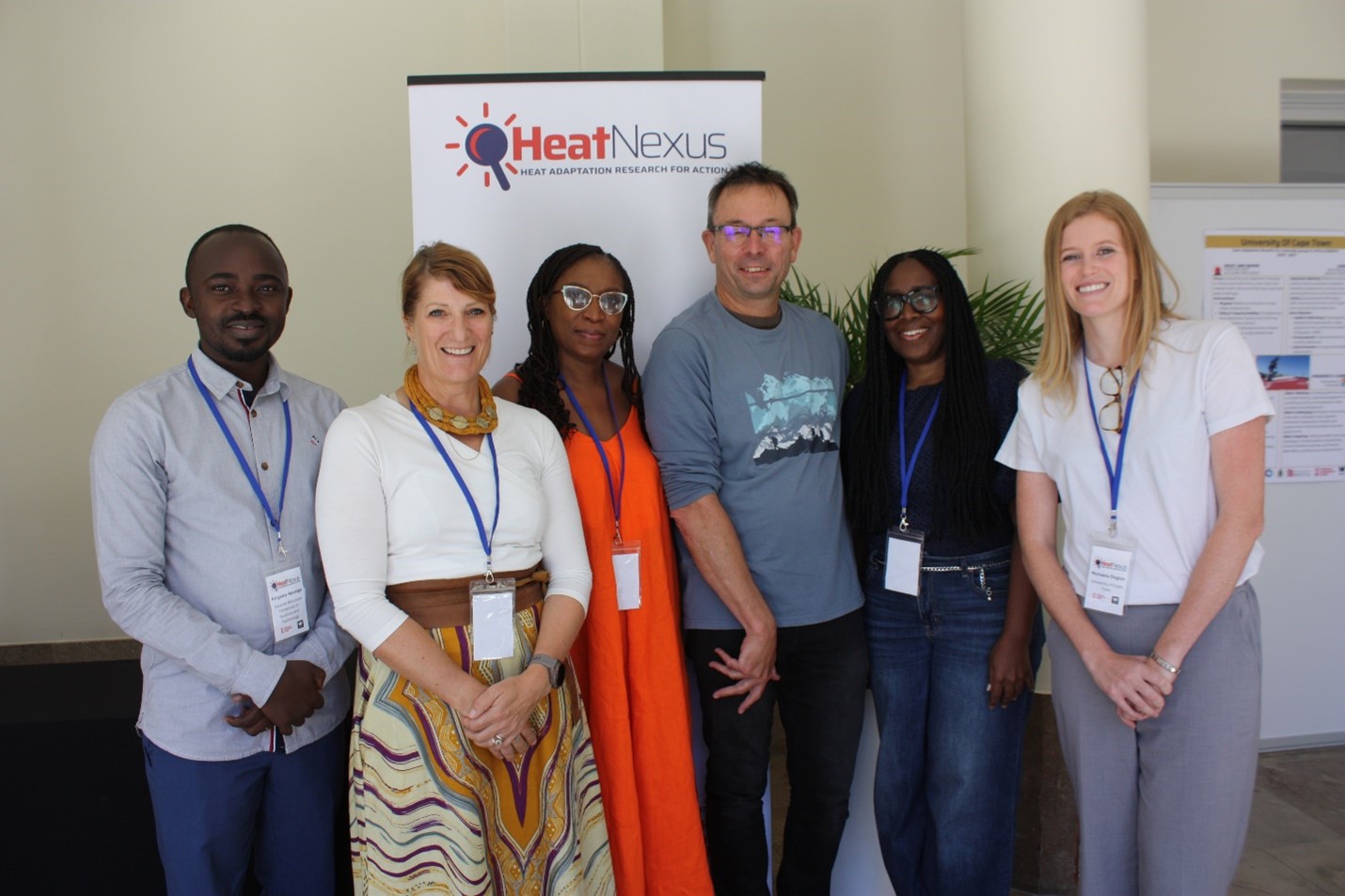
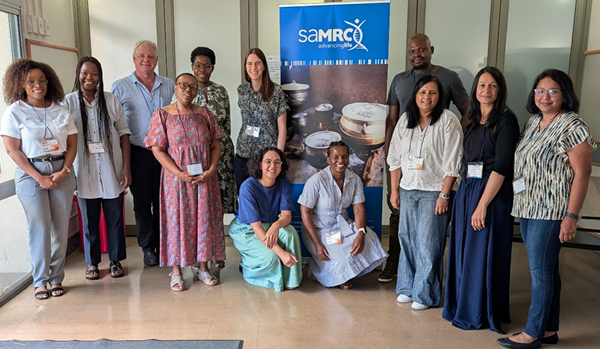
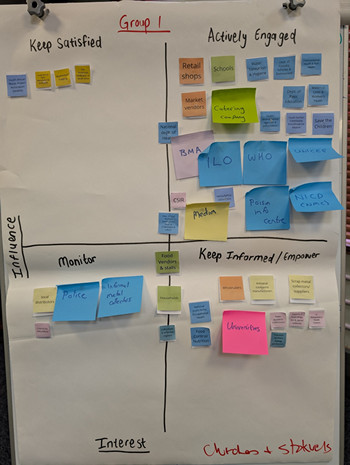
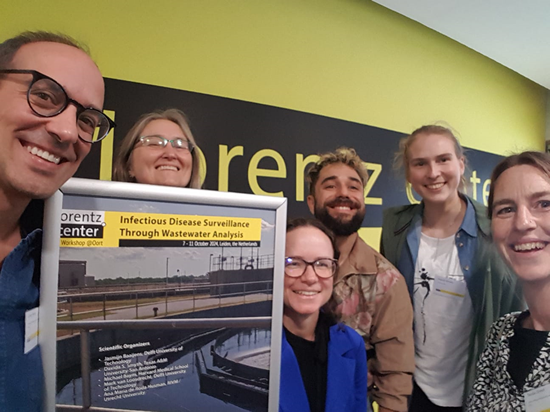
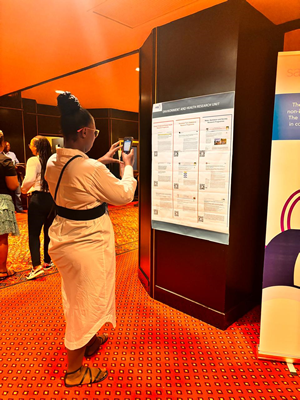
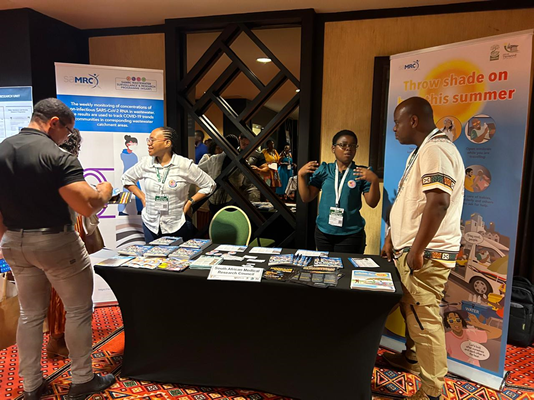
 This was the World Conference for Epidemiology. The conference focused strongly on health effects.
This was the World Conference for Epidemiology. The conference focused strongly on health effects.
